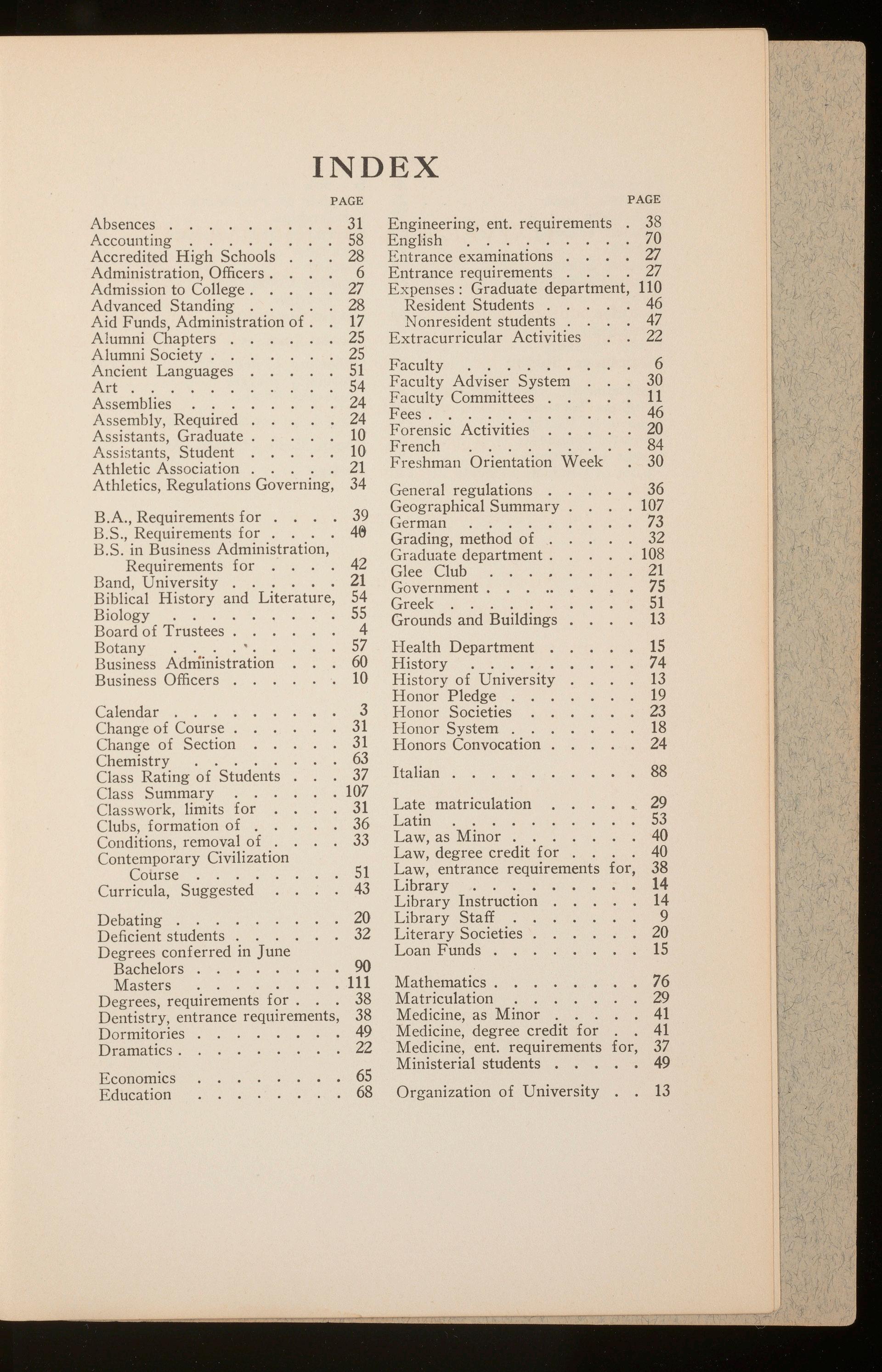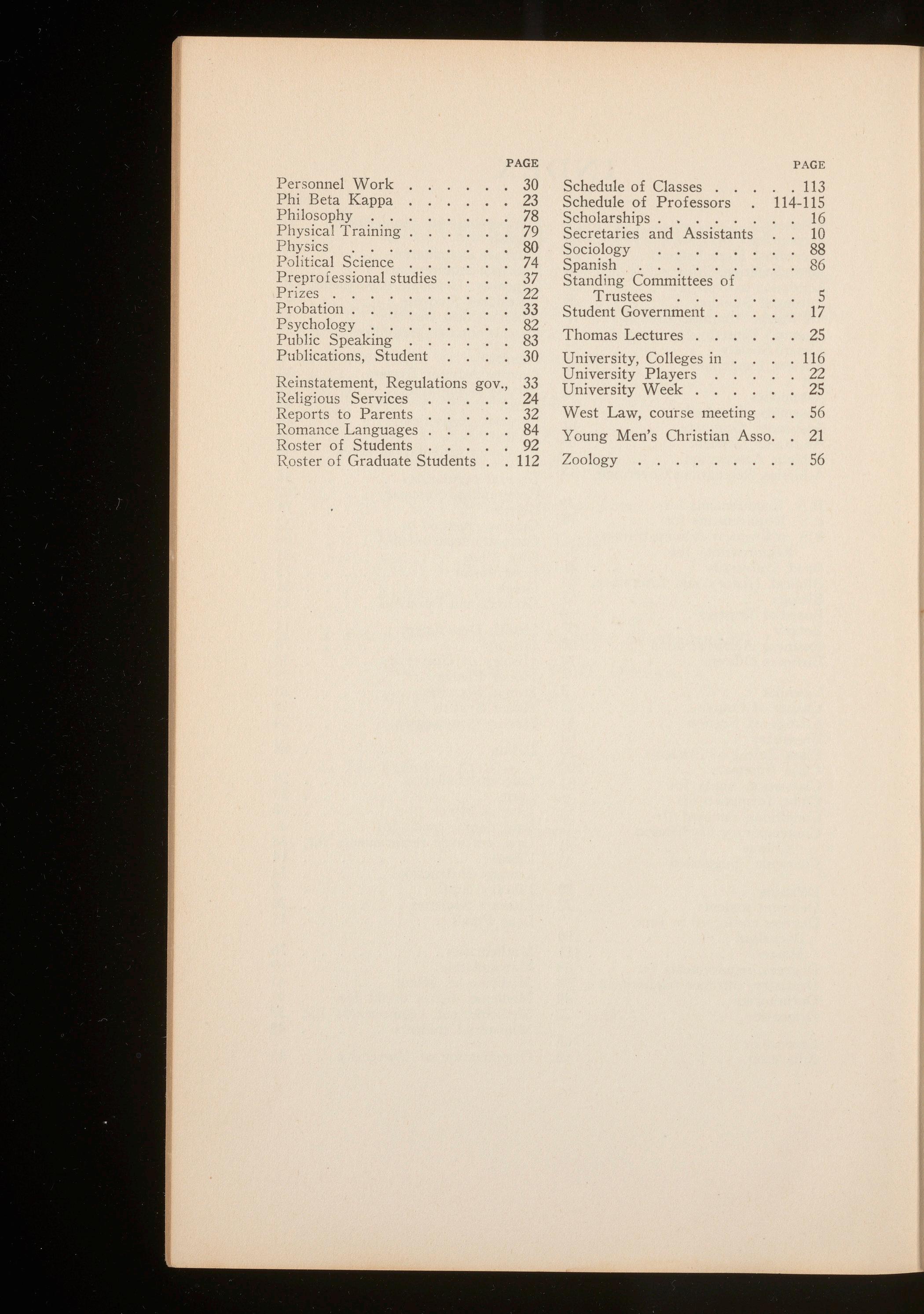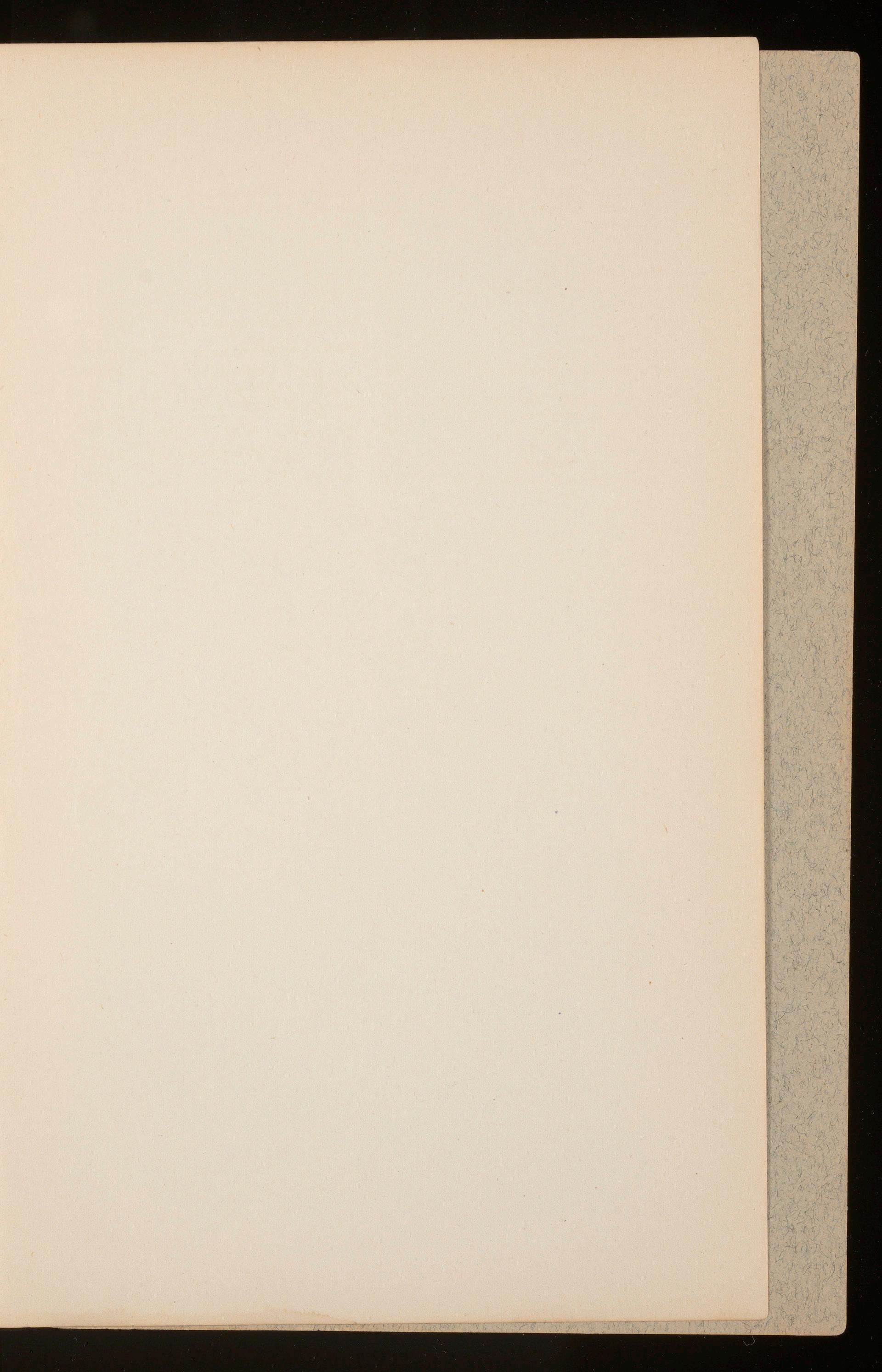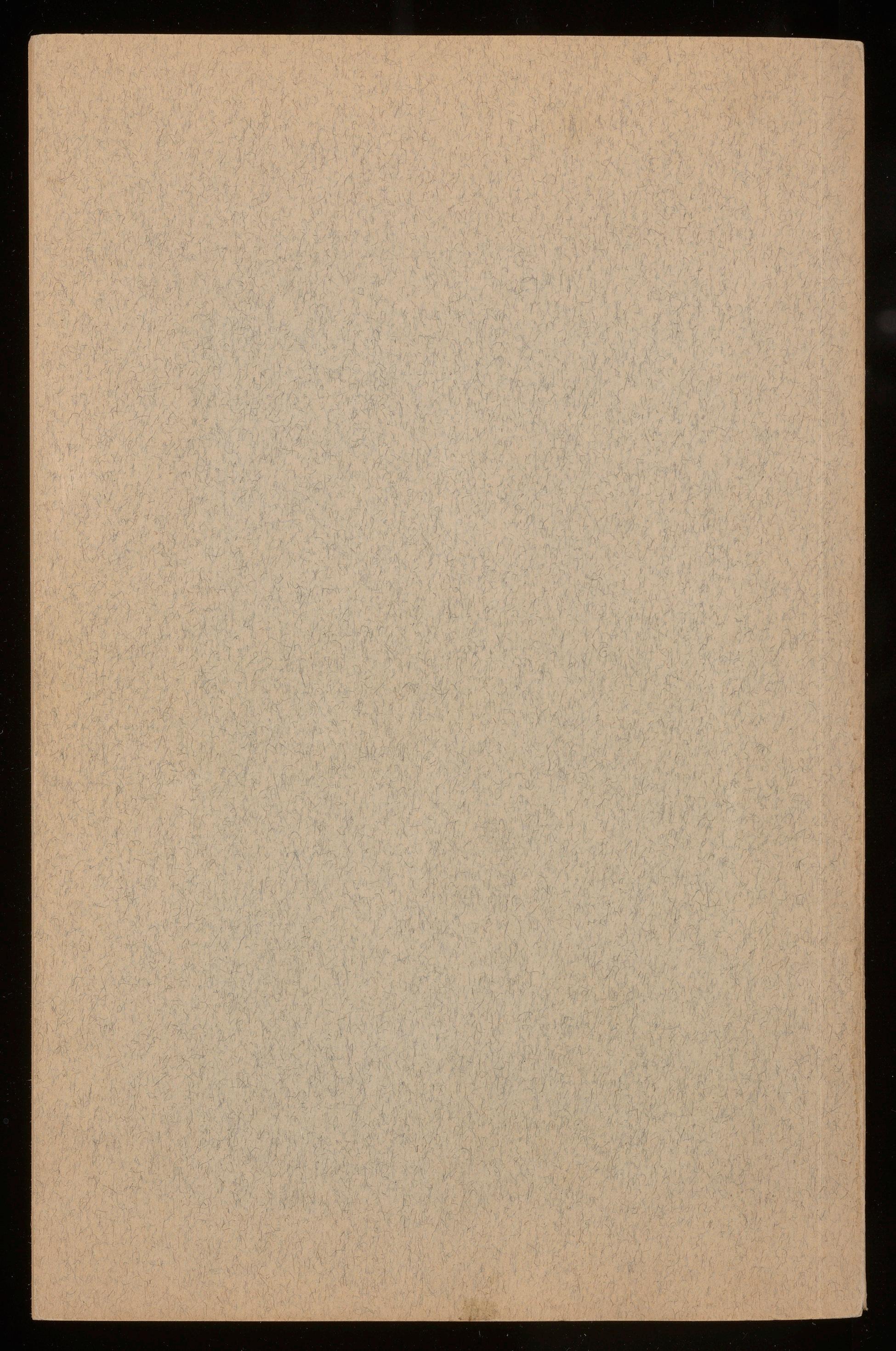

; COLL -EGE

CATALOG
OF
RiehJDond College
UNIVERSITY OF RICHMO N D VIRGINIA
SESSION 1933-1934

WITH ANNOUNCEMENTS FOR THE SESSION 1934-1935
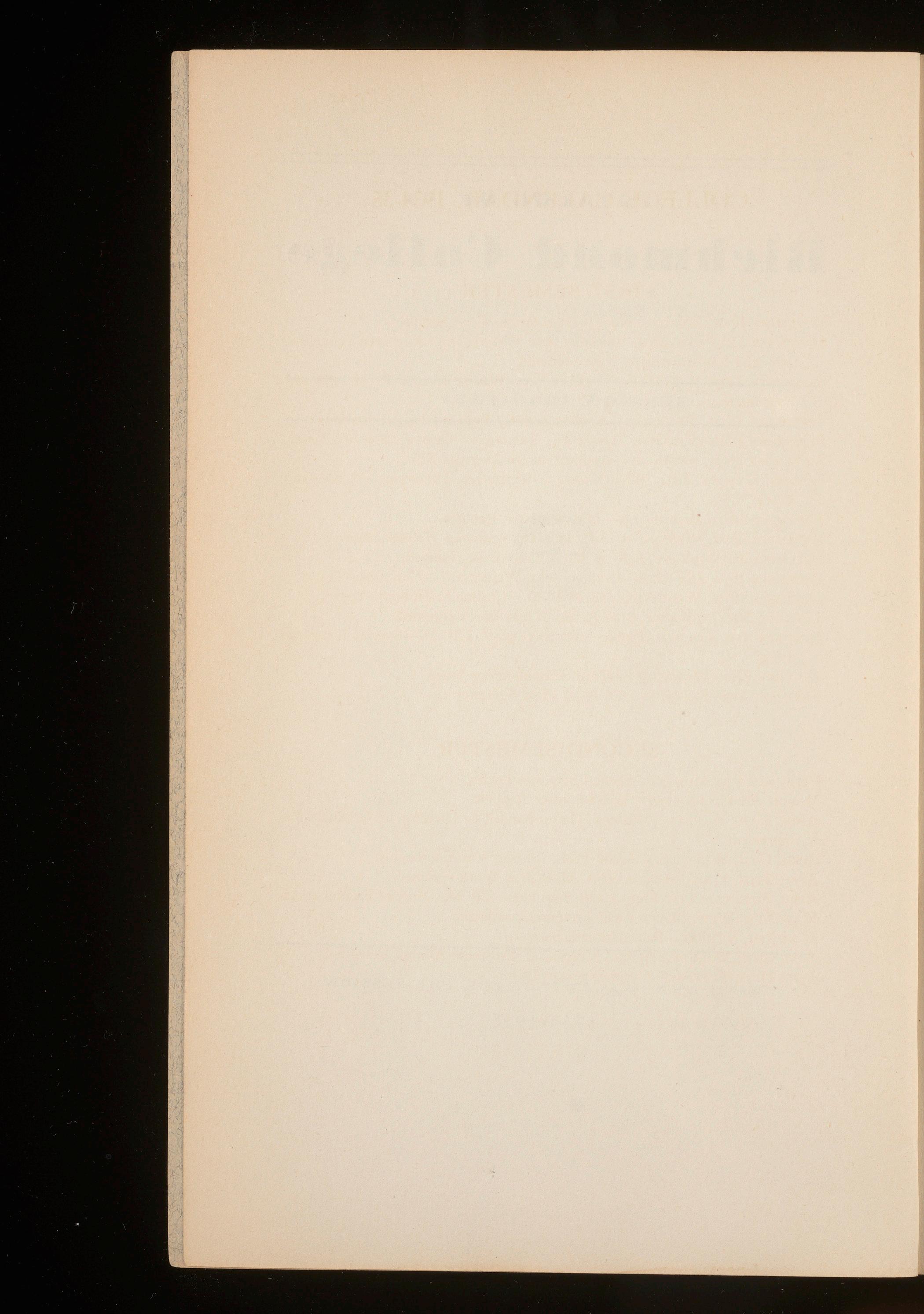

COLLEGE CALENDAR, 1934-35
FIRST SEMESTER
SEPTEMBER10TH, MONDAY, NooN-Orientation Week begins.
SEPTEMBER11TH AND 12TH, TUESDAY AND WEDNESDAY-Entrance E~aminations and Registration of New Students.
SEPTEMBER 11TH AND 12TH, TUESDAY AND WEDNESDAY, 2 P. M.-Special Examinations.
SEPTEMBER13TH, THURSDAY-Session begins; Registration of Students.
SEPTEMBER14TH AND 15TH, FRIDAY AND SATURDAY-Organization of Classes.
SEPTEMBER29TH , SATURDAY-Application for Degrees Filed.
OCTOBER17TH TO 20TH, WEDNESDAYTO SATURDAY,lNCLUSIVE-"University Week."
NOVEMBER14TH, \VEDNESDAY-Mid-Semester Reports.
NovEMBER 28TH, WEDNESDAY,5 P. M.-Thanksgiving Holiday begins.
DECEMBER3RD, MONDAY,8 :30 A. M.-Class Work resumed.
DECEMBER 18TH AND 19TH, TUESDAY AND WEDNESDAY-Christmas Tests.
DECEMBER 19TH, WEDNESDAY,12 :30 P. M.-Christmas Holidays begin.
JA NUARY 3RD, THURSDAY, 9:30 A. M.-Oass Work resumed.
JAN UARY 4TH AND Snr, FRIDAY AND SATURDAY,2 P. M.-Special Examinations.
JANUARY 23RD, WEDNESDAY-Term Examinations begin.
FEBRUARY2 ND, SATURDAY-Close of First Semester.
SECOND SEMESTER
FEBRUARY4TH, MONDAY-Second Semester begins.
MARCH 30TH, SATURDAY-Mid-Semester Reports.
APRIL 15TH, MONDAY-Masters' Theses handed to Director of Graduate Department.
APRIL 17TH, WEDNESDAY,12:30 P.M.-Spring Vacation begins.
APRIL 24TH, WEDNESDAY,9 :30 A. M.-Class Work resumed.
APRIL 26-rH AND27TH, FRIDAYAND SATVRDAY,2 P. M.-Special Examinations.
MAY 29TH, WEDNESDAY-Final Examinations begin.
JUNE 9TH, SUNDAY-Baccalaureate Sermon.
JUNE 10TH, MONDAY-Annual Meeting of Trustees; Alumni Reunions.
JUNE 11TH, TUESDAY-Commencement Day,
BOARD of TRUSTEES
A. W. PATTERSON President
GEORGE BRAXTON TAYLOR Vice-President
B. WEST TABB Secretar3•
CLASS ONE
Term Expfres June, 1934
A. J. Montague, LL.D .........Richmond
R. C. Williams ......................Richmond
B. T. Gunter ............................Accomac
*A. R. Long ..........................Lynchburg
CLASS TWO
Term Expires .Tune, 1935
George T. Waite, D.D .........Richmond
A. W. Patterson, LL.D .......Richmond
George B. Taylor, D.D .............Hollins
C. J. Billups Richmond
Francis A. Davis ..................Baltimore
CLASS THREE
Term Expires June, 1936
T. B. McAdams, LL.D Baltimore
W. S. Jenkins ..........................Leesburg
J. T. Stinson, D.D ...Bluefield, W. Va.
Mrs.G.W.McDaniel..U. of Richmond
CLASS FOUR
Term Expires June, 1937
D. S. Freeman, LL.D Richmond
E. M. Long ............................Richmond
E. B. Jackson, D.D .......Harrisonburg
B. P. Willis Fredericksburg
T. Ryland Sanford, D.D .........Norfolk
*Deceased.

CLASS FIVE
Term Expires June, 1938
R. S. Owens, D.D ...................Roanoke
W. H. Baylor, D.D ...........Portsmouth
Miss Alta Foster Petersburg
J. C. Metcalf, LL.D U. of Virginia
Henry Taylor ........................Richmond
CLASS SIX
Term Expires J11ne, 1939
J. Hunt Hargrave ..................Chatham
R. H. Pitt, D.D., LL.D .......Richmond
H. 'vV. Straley ........Princeton, W. Va.
'vV.E. Barrett ..............Newport News
Robert N. Pollard ................Richmond
CLASS SEVEN
Term Expires June, 1910
L. Howard Jenkins ..............Richmond
George Swann ........................Trenholm
H. Lee Boatwright ................ Danville
J. E. Hicks, D.D ...................Baltimore
Wilmer L. O'Flaherty Richmond
CLASS EIGHT
Term Expires Jttne, 1911
J. T. Lawrence Richmond
Stuart McGuire, M.D., LL.D., Richmond
Mrs. H. W. Decker ..............Richmond
Sparks W. Melton, D.D ........Norfolk
John Stewart Bryan, LL.D Richmond

STANDING COMMITTEES of the BOARD
The By-Laws provide that the President of the Board of Trustees and the President of the University shall be members of all standing committees, and that the Treasurer of the University shall be a member of the Executive Committee. The Secretary of the Board is ex officio Secretary of all standing committees of the Board.
Executive-£. M. LONG, THOMAS B. McADAMS, RussELL C. WILLIAMS, R. H. PITT, L. HOWARD JENKINS, J. T. LAWRENCE, B. WEST TABB, A. w. PATTERSON,F. w. BOATWRIGHT.
Library-]. C. METCALF, STUART McGurnE, Miss ALTA FOSTER, A. J. MONTAGUE,J.E. HICKS, ROBERT N. POLLARD,PROFESSOR PINCHBECK, PROFESSORKELLER.
Aid Funds (Scholarships and Donations)-GEORGE T. WAITE, D. s. FREEMAN, MRS. H. w. DECKER, B. P. WILLIS, H. w. STRALEY, W. E. BARRETT, MRs. G. W. McDANIEL, H. LEE BOATWRIGHT, FRANCIS A. DAVIS, E. B. JACKSON, w. s. JENKINS.
Noniina.tion of New Trustee s-W. H. BAYLOR, G. B. TAYLOR, T. RYLAND SANFORD, B. T. GUNTER, HENRY M. TAYLOR, SPARKS w. MELTON, \V. L. O'FLAHERTY.
Nomination for Honorary Degrees-]. HUNT HARGRAVE,D. S. FREEMAN, J. E. HICKS, R. s. OWENS, J. C. METCALF, PROFESSORR. E. GAINES.
AD · MINISTRATIVE OFFICERS
FREDERIC WILLIAM BOATWRIGHT, M.A., LL.D. President
BENJAMIN WEST TABB, B.A. Vice-President and Treamrer
RAYMOND B. PINCHBECK, PH.D. Dean
R. E. GAINES, M.A., LITT.D. Director Graduate Department
LUCY T. THROCKMORTON Acting Librarian
CULLEN PITT, M.A., M.D Col/ey e Physician
FACULTY of INSTRUCTION
FREDERIC WILLIAM BOATWRIGHT, 1887 Professor of Modern
1 Bostwick Lane, Campus Languages
M.A., Richmond College; LL.D , Mercer University, Georgetown College and Baylor University. Graduate Student, Halle , Sorbonne, and Leipsic.
ROBERT EDWIN GAINES, 1890 . Professor of Mathematics
3 Bostwick Lane, Campus
M.A., Furman University; Litt.D., Furman University. Graduate Student, Johns Hopkins University, Harvard University.
SAMUEL CHILES MITCHELL, 1895 . • University of Richmond Professor of History and Political Science
M.A., Georgetown College; Ph.D., Chicago University; LL.D., Brown University.
WILLIAM ASBURY HARRIS, 1901 . Professor of Greek and Latin 2 College Avenue.
M.A., Richmond College; Ph.D., Johns Hopkins University.
ROBERT EDWARD LOVING, 1908 Professor of Physics 2 Bostwick Lane, Campus.
M.A., Richmond College; Ph.D., Johns Hopkins University· Cornell University, 1919-20. '
*FRANK M. DOBSON, 1913 . 713 Byrd Park Court, Richmond.
HENRY BRANTLY HANDY, 1914 4101 Grove Avenue, Richmond.

Director of Athletics
Professor of English
B.A., Richmond College; M A., Richmond College · M A. Harvard University; Columbia University, 1915. ' '
*Resigned.

GARNETT RYLAND, 1917 . Professor of Chemistry University of Richmond.
M.A., Richmond College; Ph.D., Johns Hopkins University.
WILLIAM LOFTIN PRINCE, 1920 Professor of Education 2423 Grove Avenue, Richmond.
B.A., Richmond College; M.A., Columbia University.
ROBERT COLLINS AsTROP, 1920 Professor of Psychology 343 Albemarle Avenue, Stonewall Court.
A.B., Randolph-Macon College; M.A., University of Virginia; Columbia University, 1914-15; Columbia University, 1923,1926-27.
CLEMENT ORESTES MEREDITH, 1920 Professor of German University of Richmond.
A.B., Guilford College; A.B., Haverford College; Ph.D., Johns Hopkins University; Berlin, 1908-10; American School of Philology at Rome, 1910.
*RoLVIX HARLAN, 1922 . Professor of Sociology and Social Ethics University of Richmond.
A.B., George Washington University; M.A., ibid.; Ph.D., University of Chicago.
CLEMENT TYSON GOODE, 1924 . James A. Bostwick Professor 30 Albemarle Avenue , Richmond. of English
A.B., Wake Forest College; A.M., Harvard University; Ph.D., Cornell University.
HUGH SAGER MEAD, 1924 . Professor of Business Administration 5816 York Road, Westhampton.
A.B., Kalamazoo College; A.B., University of Chicago; University of Michigan, University of Chicago, 1923-24.
RALPH C. MCDANEL, 1926 Professor of American History 4 Bostwick Lane, Campus
B.A., University of Richmond; M.A., Columbia University; Ph.D., Johns Hopkins University.
·WILLIAM RoBERT CoRNTHWAITE, 1927 . Professor of Chemistry University of Richmond.
A.B., DePauw University; Ph.D., Ohio State University.
JOHN H. RUSSELL, 1928 Professor of Accounting 3406 Grove Avenue, Richmond.
A.B., Emory and Henry; M.A., Ph.D., Johns Hopkins University.
JOHN WENDELL BAILEY, 1929 Professor of Biology University of Richmond.
B.S., M.S., Mississippi A. and M. College; A.B., A.M., Cornell University; M.A., Ph.D., Harvard University.
*On leave, February-June, 1934.
UNlVEl-:SlTY OF RICHMOND
BENJAMIN CLARK HoLTZCLAW, JR., 1929 . Ja1nes Thomas, Jr., • 1600 Monument k,enue, Richmcnd. Professor of Philosophy
A.B., Mercer University; B.A., M.A., Oxford; Ph.D., Cornell University.
RAYMOND BENNETT PINCHBECK, 1929 . 21 Libbie Avenue, Richmond.
B.S., M.S., Ph.D., University of Virginia.
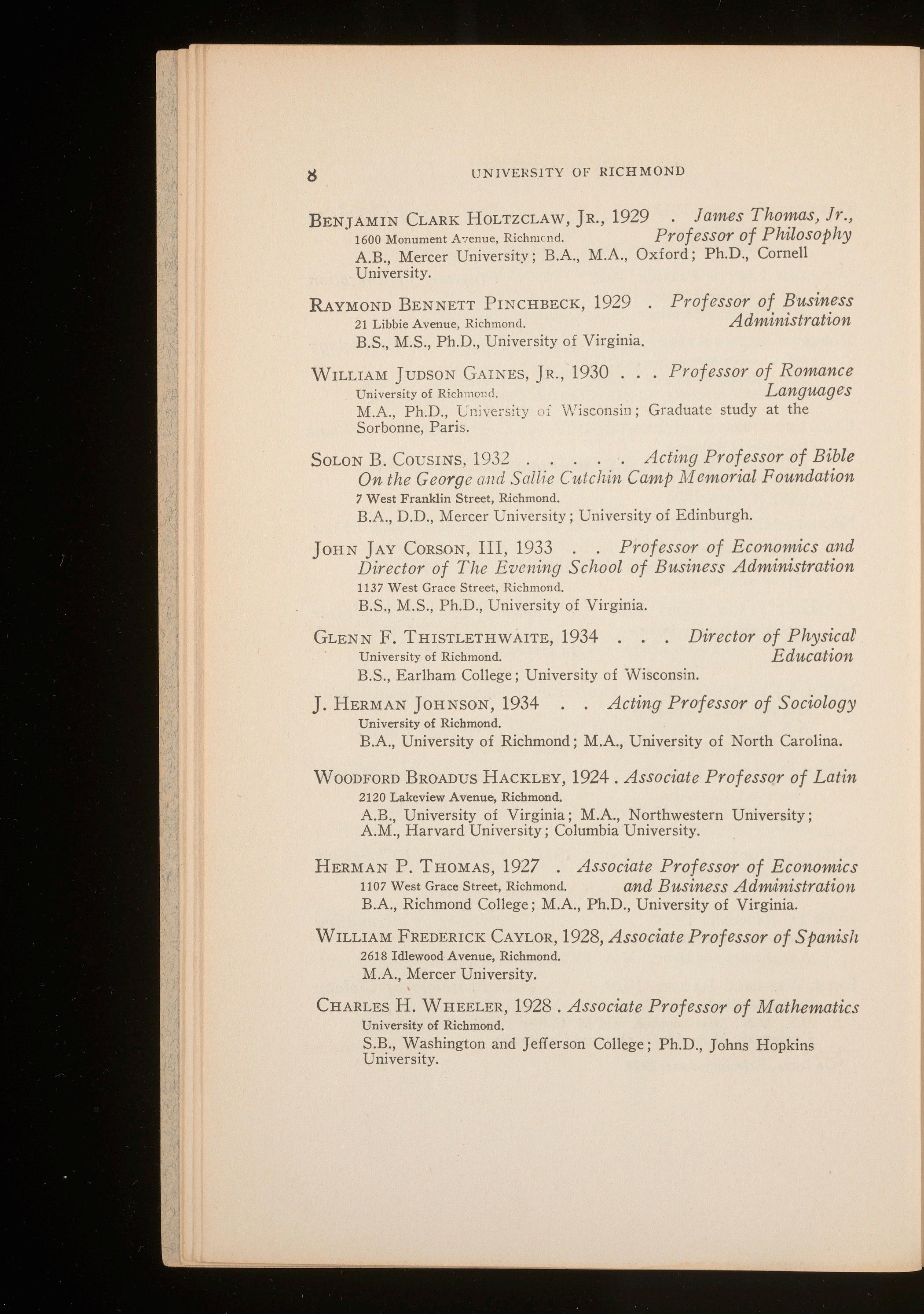
Professor of Business Adniinistration
WILLIAM JUDSON GAINES, JR., 1930 .. Languages 01 'Nisconsin; Graduate study at the University of Rich mond. M.A., Ph.D., G"Eive:·sity Sorbonne, Paris.
Professor of Romance
SOLON B. CousINs, 19 32 . Acting Professor of Bible On the George and Sallie Cutchin Camp Memorial Foundation 7 West Franklin Street, Richmond.
B.A., D.D., Mercer University; University of Edinburgh.
JOHN JAY CORSON, III, 1933 Professor of Economics and Director of The Evening School of Business Administration 1137 West Grace Street, Richmond.
B.S., M.S., Ph.D., University of Virginia.
GLENN F. THISTLETHWAITE, 1934 University of Richmond.
Director of Physical Education
B.S., Earlham College; University of Wisconsin.
}. HERMAN JOHNSON, 1934 Acting Professor of Sociology University of Richmond.
B.A., University of Richmond; M.A., University of North Carolina.
WooDFORD BROADUS HACKLEY, 1924. Associate Professor of Latin 2120 Lakeview Avenue, Richmond.
A.B., University of Virginia; M.A., Northwestern University; A.M., Harvard University; Columbia University.
HERMAN P. THOMAS, 1927 . Associate Professor of Economics 1107 West Grace Street, Richmond. and Business Administration
B.A., Richmond College; M.A., Ph.D., University of Virginia.
WILLIAM FREDERICK CAYLOR, 1928, Associate Professor of Spanish 2618 Idlewood Avenue, Richmond.
M.A., Mercer University.
CHARLES H. WHEELER, 1928. Associate Professor of Mathematics University of Richmond.
S.B., Washington and Jefferson College· Ph.D., Johns Hopkins University. '
UNIVERSITY OF RICHMOND
CHARLES LEONARD ALBRIGHT, 1929 1535 West Avenue , Richmond.
Associate Professor of Physics
B.S., Coe College; M.S., Ph.D., University of Iowa.
ROBERT FORTE SMART, 1929 Associate Prof essJJrof Biology University of Richmond.
A.B., Mississippi College; A.M., Harvard University.
SAMUEL WHITEFIELD STEVENSON, 1932 . Associate Professor of Univer s ity of Richmond. · English
B.A., University of North Carolina; M.A , Ph.D., Johns Hopkins University.
DAVID J. MAYS, 1926 Instructor in Business Administration American Bank Building, Richmond.
LL.B., T. C. Williams School of Law, University of Richmond.
SHERLOCK BRONSON, 1928 . Instructor in Business Administration Westhampton.
LL.B., T. C. Williams School of Law, Umversity of Richmond.
NORMAN CURTIS GIDDINGS, 1931 University of Richmond. Instructor in Romance Languages
A.B., Hamilton College; A.M., Harvard University.
HAROLD A. BONER, 1931 . Instructor in English University of Richmond.
A.B., University of Colorado; M.A., Columbia Univer sity.
MALCOLM U. PITT, 1928 University of Richmond.
LIBRARY STAFF
Freshnian Coach
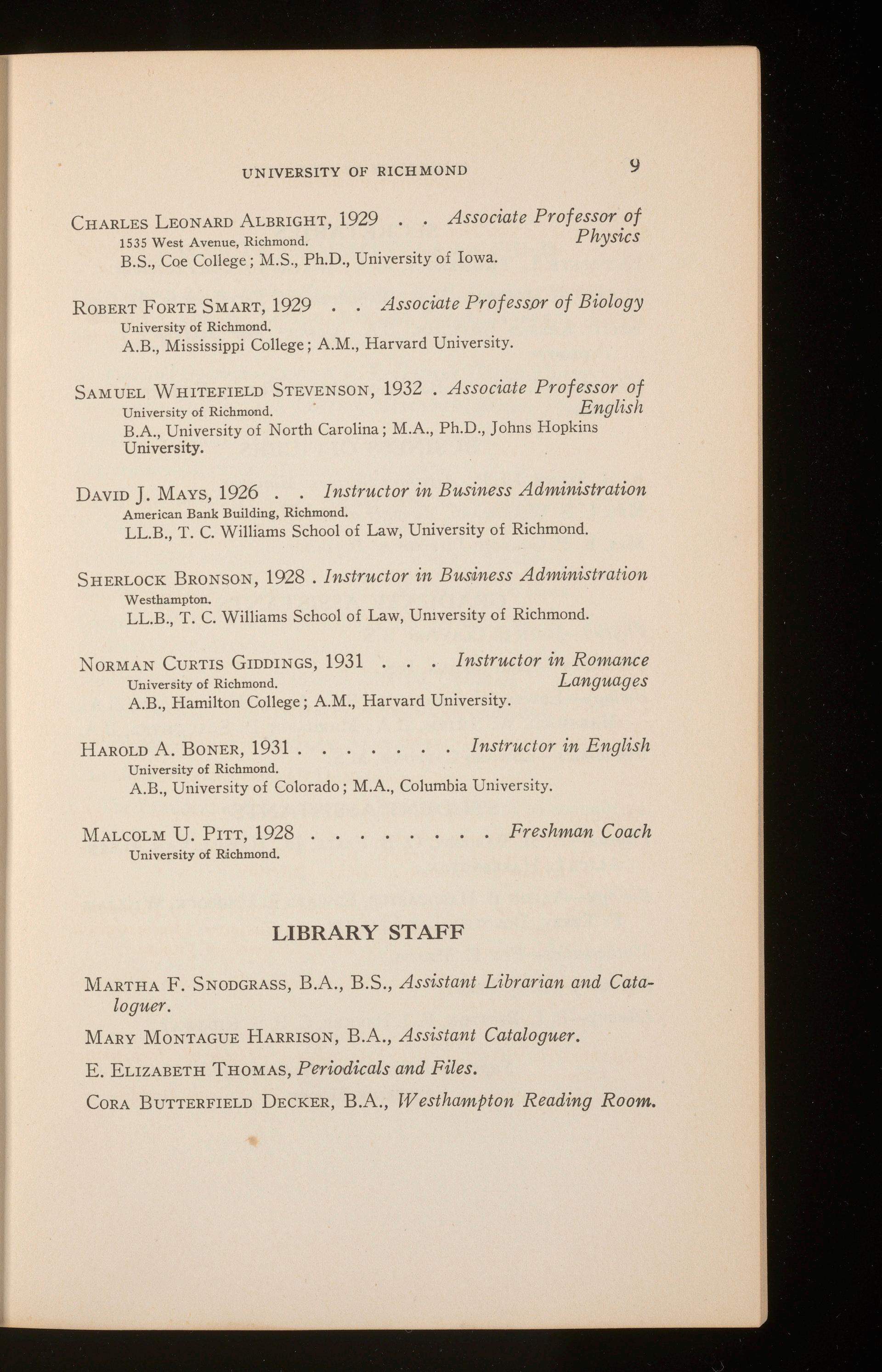
MARTHA F. SNODGRASS, B.A., B.S., Assistant Librarian and Cataloguer.
MARY MONTAGUE HARRISON, B.A., Assistant Cataloguer.
E. ELIZABETH THOMAS, Periodicals and Files.
CORA BUTTERFIELD DECKER, B.A., T,Vesthampton Reading Room.
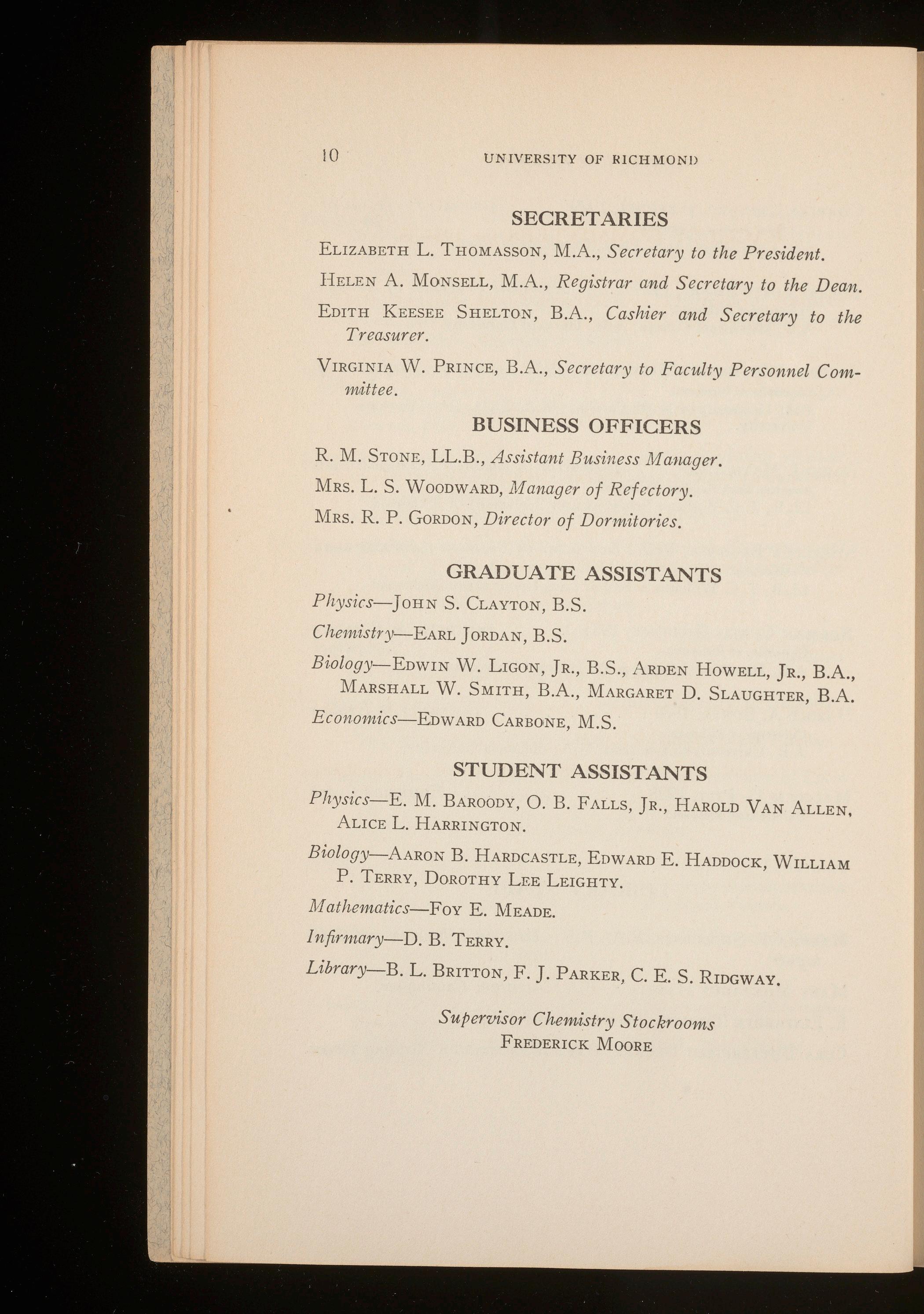
UNIVERSJTY OF RICHMOND
SECRET ARIES
ELIZABETH L. THOMASSON, M.A., Secretary to the President. HELEN A. MoNSELL, M.A., Registrar and Secretary to the Dean. EDITH KEESEE SHELTON, B.A., Cashier and Secretary to the Treasurer.
VIRGINIA W. PRINCE, B.A., Secretary to Faculty Personnel Committee.
BUSINESS OFFICERS
R. M. STONE, LL.B., Assistant Business Manager.
MRs. L. S. WOODWARD, Manager of Refectory.
MRs. R. P. GoRDON, Director of Dorniitories.
GRADUATE ASSIST ANTS
Physics-JOHNS. CLAYTON, B.S.
Chemistr , y-EARL JORDAN, B.S.
Biology-EDWIN W. LIGON, JR., B.S., ARDEN HowELL, JR., B.A., MARSHALL w. SMITH, B.A., MARGARET D. SLAUGHTER, B.A. Economics-E,owARD CARBONE, M.S.
STUDENT ASSISTANTS
Plzysics-E. M. BAROODY, 0. B. FALLS, JR., HAROLD VAN ALLEN, ALICE L. HARRINGTON.
Biology-AARON B. HARDCASTLE, EDWARD E. HADDOCK, WILLIAM P. TERRY, DOROTHY LEE LEIGHTY.
Mathenwtics-FoY E. MEADE. lnfirniary-D. B. TERRY.
Library-B. L. BRITTON, F. J. PARKER, C. E. S. RIDGWAY.
Supervisor Chemistry Stockrooms
FREDERICK MOORE

FACULTY COMMITTEES for 1934-35
Representatives on University Senate-R. E. GAINES, MITCHELL, HARRIS, CORSON, LOVING, RYLAND, GOODE, HARLAN, HOLTZCLAW, BAILEY, PRINCE, PINCHBECK.
Courses and Degrees-LOVING, R. E. GAINES, GOODE, HOLTZCLAW.
Personnel-HOLTZCLAW, LOVING, MITCHELL, GooDE, PRINCE.
Athletics-HANDY, HARLAN, CAYLOR, McDANEL.
Fraternities-CAYLOR, HARRIS, CoRNTHWAITE.
Public Lectures-RussELL, SMART, DOUBLES, MEAD, HACKLEY, CORSON.
Student Affairs-HARLAN, AsTROP, HACKLEY, SMART.
Alunini-RYLAND, HARRIS, PRINCE, McDANEL, THOMAS.
Chapel and Religious Life - HARRIS, LOVING, W. J. GAINES, BAILEY, MCDANEL, RYLAND.
Student Eniployment-THOMAS, CAYLOR, DOUBLES.
Faculty Socials-CoRNTHWAITE, STEVENSON, GIDDINGS.
Catalogue-BoNER, \V HEELER, ALBRIGHT.
Marshals-RYLAND and McDANEL.
The President and Dean are ex officio members of all committees.


GENERAL INFORMATION ORGANIZATION
Richmond College, a college of liberal arts and sciences for men, was founded in 1832, and celebrated its first centennial in May, 1932. Around this college as a nucleus have grown up the T. C. Williams School of Law (organized 1870); Westhampton College, a college of liberal arts and sciences for women ( 1914) ; the Summer School (1920); the Graduate Department (1921); and the Evening School of Business Administration ( 1924). These several colleges or departments constitute the University of Richmond. Each college has its own dean or director, its own faculty and its own institutional life. Each college has its separate student body, which is limited to a number which will insure every student intellectual and social contacts with his professors and within his own academic group. The University Senate, on which sit representatives of all the faculties, provides for intercollegiate co-operation.
The legal name of the corporation is "University of Richmond." The Board of Trustees of the University of Richmond controls all endowment and other funds and makes all appropriations. The several colleges award no degrees, but all degrees for work done in any one of the colleges are conferred by the University of Richmond. Ultimate authority is vested in the Board of Trustees and in the President of the University.
GROUNDS AND BUILDINGS
The campus of Richmond College embraces one hundred and fifty acres, somewhat equally divided between open spaces and woodlands, situated in the western suburbs of Richmond, and separated by a lake from Westhampton College. The grounds are five and a half miles from the center of the city, and are reached by paved driveways and by street cars.
All buildings are of substantial fireproof construction, in brick and stone with steel frames encased in concrete. The floors are reinforced concrete overlaid with cypress ; the partitions are hollow tile;

UNIVERSITY OF RICHMOND
the stairways have steel frames with stone treads ; and the window casements are bronze. Everywhere attention has been paid to safety, health and comfort, in surroundings of striking landscape and architectural beauty.
Robert Ryland Hall contains the offices of administration and a number of lecture rooms; Charles H. Ryland Hall houses the library, and Brunet Hall provides for the college refectory. Jeter Hall and Thomas Hall are dormitories divided into nine noncommunicating sections that furnish comfortable lodgings for two hundred and forty-six students. The Roger Millhiser Gymnasium contains a memorial and trophy room, offices, a gymnasium floor 71x103 feet, and an equal space for baths, dressing rooms and lockers. On the Athletic Field adjoining is a concrete stadium with seats for four thousand spectators. The Henry M. Cannon Memorial Chapel seats eight hundred, besides the seats on the platform and in the choir.
The year 1932-33 marked the completion of the group of Science Buildings, including the Chemistry Building, Richmond Hall (Physics) and Maryland Hall (Biology). These three buildings represent an investment of half a million dollars. There are six residences for professors o·nthe campus, a central power house, and three temporary structures-the Dramatic Workshop, the Student Activities Building, and the College Store.
THE LIBRARY
The libraries of the University contain about sixty thousand volumes, not including pamphlets, classified by the Dewey System. The most recent and useful bibliographical aids are provided, and the best periodicals and reviews, daily and weekly papers, are currently received. As a depository of the United States Government, the Library acquires annually hundreds of publications especially valuable for reference in social and political science. The students have direct access to the shelves during ten hours each day, and the Librarian and assistants are always on hand to give help in any line of reading or research. Formal instruction in the use of the Library is given by members of the Library staff and is required of all freshmen during the first semester.

The University is peculiarly fortunate in its nearness to several great collections of books. Through the courtesy of the officials, the resources of the Virginia State Library, the Richmond Public Library, and the Virginia Historical Society have been made accessible to our students, both for consultation and withdrawal. These afford exceptional facilities for research, not only in general subjects, but especially in Virginian and American history. It should be mentioned that our nearness to \Vashington enables us to make constant use of the Congressional Library, from which rare books and pamphlets invaluable for theses and debates may be quickly obtained, through a national loan system.
The main Library occupies the southern wing , of Ryland Hall. The interior is paneled in oak, and the book-cases arranged in alcove plan. There is, at each end, a five-fold Gothic window of striking size and beauty, and in each alcove a casement window, the whole affording natural light at all hours of the day. In convenience and harmony of effect, the Library is the culmination of the collegiate Gothic, that exquisite perpendicular type made familiar by the English colleges, to which all the University buildings strictly conform.
HEALTH DEPARTMENT
Excellent provision is made for care of the health of all students resident on the campus. During orientation week a thorough physical examination by the University medical staff is required of all new students. Dormitory students receive the daily attention of the college physician and his assistants. Infirmary rooms are provided to which students are removed whenever necessary. There is no extra charge for the use of infirmary rooms or for the attendance of the physician's assistants who look after the needs of the sick.
LOAN FUNDS
In 1917 Rev. W. Thorburn Clark and Mrs. Clark, of Richmond, donated two hundred dollars to be loaned to worthy students at the discretion of the president of the University. Recently Mr. Charles T. Bagby, of Baltimore, gave eighteen hundred dollars on similar conditions. The firm of Meyer Greentree, Inc., of Richmond, has given one thousand dollars to establish the "Meyer Greentree Loan
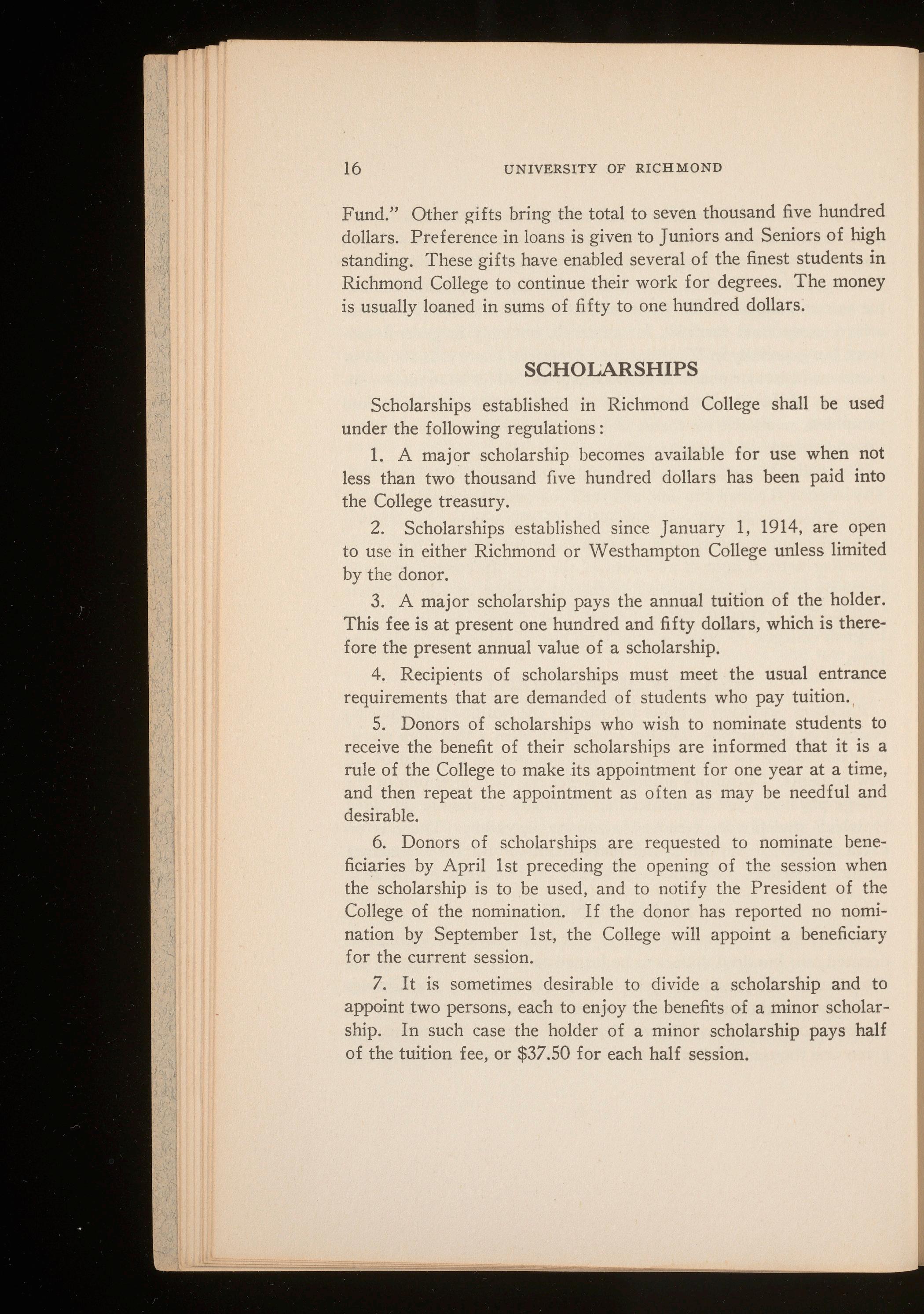
UNIVERSITY OF RICHMOND
Fund." Other gifts bring the total to seven thousand five hundred dollars. Preference in loans is given to Juniors and Seniors of high standing. These gifts have enabled several of the finest students in Richmond College to continue their work for degrees. The money is usually loaned in sums of fifty to one hundred dollars.
SCHOLARSHIPS
Scholarships established in Richmond College shall be used under the following regulations :
1. A major scholarship becomes available for use when not less than two thousand five hundred dollars has been paid into the College treasury.
2. Scholarships established since January 1, 1914, are open to use in either Richmond or Westhampton College unless limited by the donor.
3. A major scholarship pays the annual tuition of the holder. This fee is at present one hundred and fifty dollars, which is therefore the present annual value of a scholarship.
4. Recipients of scholarships must meet the usual entrance requirements that are demanded of students who pay tuition. ,
5. Donors of scholarships who wish to nominate students to receive the benefit of their scholarships are informed that it is a rule of the College to make its appointment for one year at a time, and then repeat the appointment as often as may be needful and desirable.
6. Donors of scholarships are requested to nominate beneficiaries by April 1st preceding the opening of the session when the scholarship is to be used, and to notify the President of the College of the nomination. If the donor has reported no nomination by September 1st, the College will appoint a beneficiary for the current session.
7. It is sometimes desirable to divide a scholarship and to appoint two persons, each to enjoy the benefits of a minor scholarship. In such case the holder of a minor scholarship pays half of the tuition fee, or $37.50 for each half session.

8. Reports of students' class and examination standing are mailed at regular intervals to parents or guardians, and a transcript of a beneficiary's report will be mailed to the donor of a scholarship, provided request is made at the Dean's office.
GENERAL ADMINISTRATION OF AID FUNDS
The committee in charge has general instruction, in making award of all Aid Funds, to give the preference:
I. To applicants already at College, who have maintained a good standing in character, conduct and study.
II. To other fully prepared applicants who shall present satisfactory testimonials from the school last attended, or from other persons who have had opportunity to judge, certifying to health, attainments, habits of study and moral character.
III. To those of either class who give reasonable assurance that they will complete a course of study leading to one of the degrees of the College.
IV. The College reserves the right to make any of the scholarships in its control "Service Scholarships," which means that the student will be expected to make some return in service to the College while holding the scholarship.
The recipients of aid are expected to prove, as students, not only above censure in all respects, but actively helpful to the College by example and by earnest work. Students who do not maintain these standards will forfeit their scholarships.
STUDENT GOVERNMENT
The student self-government organization, known as the Student Council of Richmond College, was voluntarily established by the students themselves to further the best interests of the student body and of the College in general. It is vitally concerned with maintaining the honor system in the institution. There is cordial co-operation between the Student Council and the constituted College authorities. Every matriculate of the College is a member of this organization.
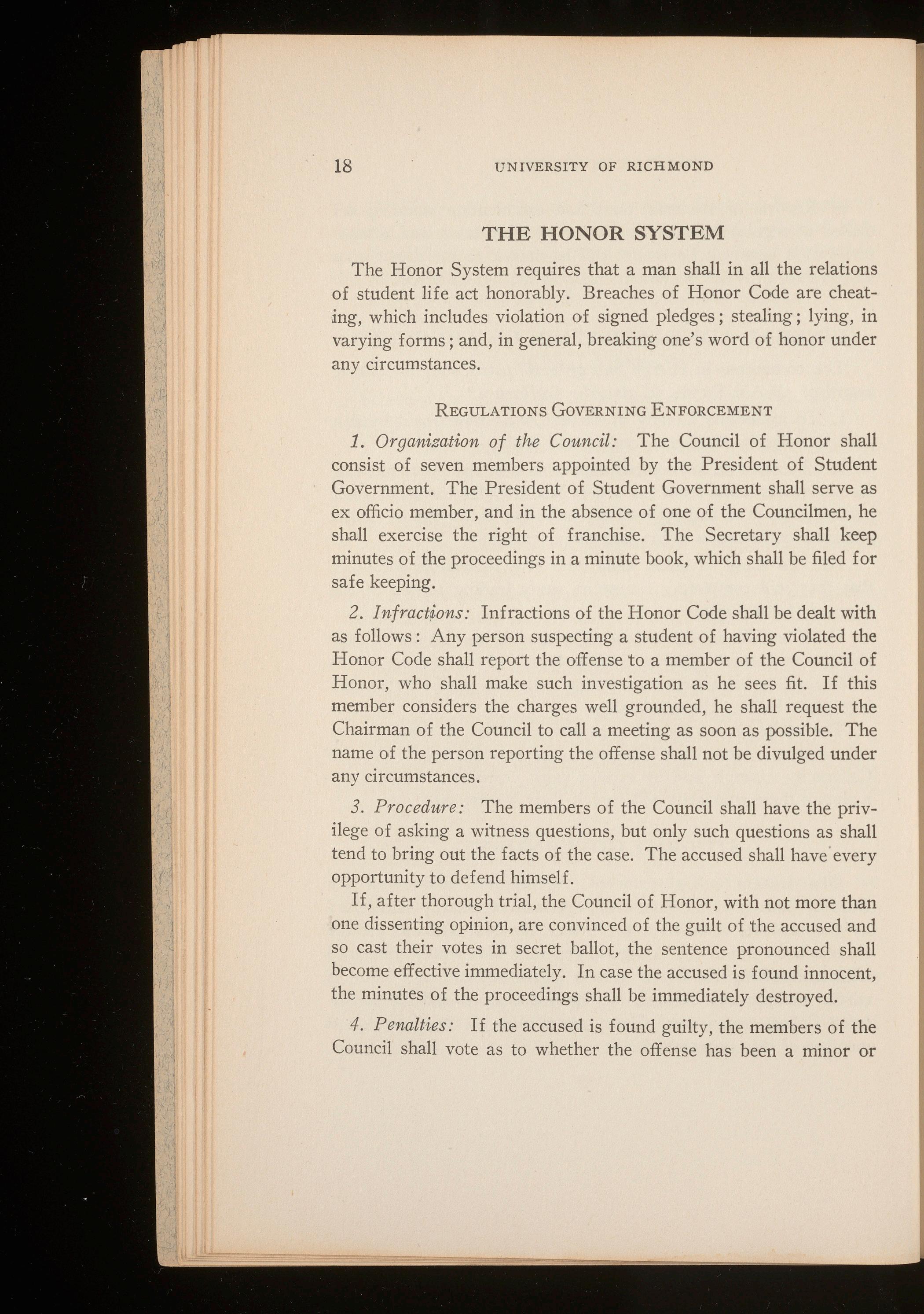
THE HONOR SYSTEM
The Honor System requires that a man shall in all the relations of student life act honorably. Breaches of Honor Code are cheatiing, which includes violation of signed pledges; stealing; lying, in varying forms; and, in general, breaking one's word of honor under any circumstances.
REGULATIONS GOVERNING ENFORCEMENT
1. Organization of the Council: The Council of Honor shall consist of seven members appointed by the President of Student Government. The President of Student Government shall serve as ex officio member, and in the absence of one of the Councilmen, he shall exercise the right of franchise. The Secretary shall keep minutes of the proceedings in a minute book, which shall be filed for safe keeping.
2. I nfrac[ions: Infractions of the Honor Code shall be dealt with as follows : Any person suspecting a student of having violated the Honor Code shall report the offense to a member of the Council of Honor, who shall make such investigation as he sees fit. If this member considers the charges well grounded, he shall request the Chairman of the Council to call a meeting as soon as possible. The name of the person reporting the offense shall not be divulged under any circumstances.
3. Procedure: The members of the Council shall have the privilege of asking a witness questions, but only such questions as shall tend to bring out the facts of the case. The accused shall have every opportunity to defend himself.
If, after thorough trial, the Council of Honor, with not more than one dissenting opinion, are convinced of the guilt of the accused and so cast their votes in secret ballot, the sentence pronounced shall become effective immediately. In case the accused is found innocent, the minutes of the proceedings shall be immediately destroyed.
4. Penalties: If the accused is found guilty, the members of the Council shall vote as to whether the offense has been a minor or
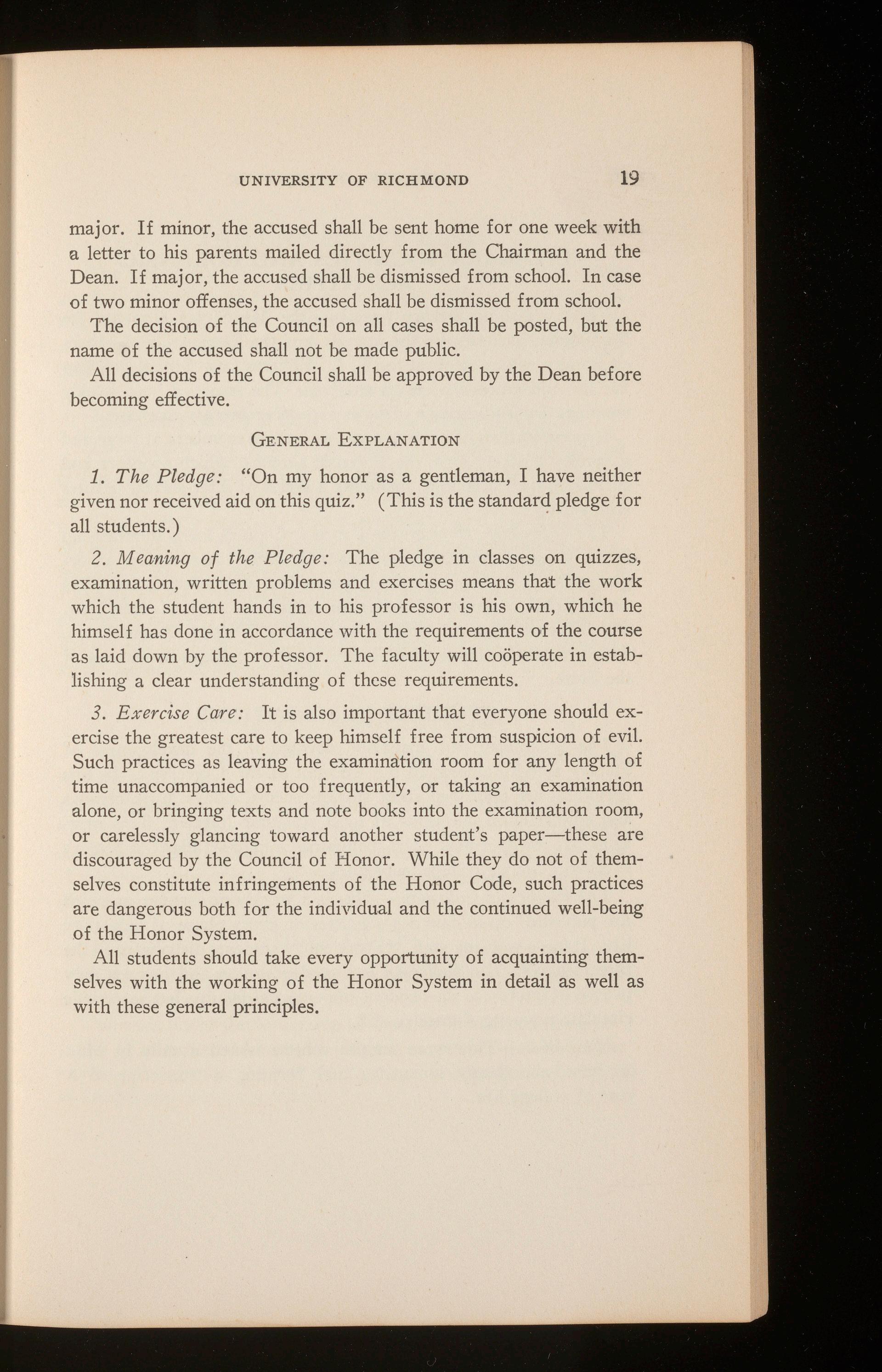
major. If minor, the accused shall be sent home for one week with a letter to his parents mailed directly from the Chairman and the Dean. If major, the accused shall be dismissed from school. In case of two minor offenses, the accused shall be dismissed from school.
The decision of the Council on all cases shall be posted, but the name of the accused shall not be made public.
All decisions of the Council shall be approved by the Dean before becoming effective.
GENERAL EXPLANATION
1. The Pledge: "On my honor as a gentleman, I have neither given nor received aid on this quiz." (This is the standar~ pledge for all students.)
2. Meaning of the Pledge: The pledge in classes on quizzes, examination, written problems and exercises means that the work which the student hands in to his professor is his own, which he himself has done in accordance with the requirements of the course as laid down by the professor . The faculty will cooperate in establishing a clear understanding of these requirements.
3. Exercise Care: It is also important that everyone should exercise the greatest care to keep himself free from suspicion of evil. Such practices as leaving the examination room for any length of time unaccompanied or too frequently, or taking an examination alone, or bringing texts and note books into the examination room, or carelessly glancing toward another student's paper-these are discouraged by the Council of Honor. While they do not of themselves constitute infringements of the Honor Code, such practices are dangerous both for the individual and the continued well-being of the Honor System.
All students should take every opportunity of acquainting themselves with the working of the Honor System in detail as well as with these general principles.

LITERARY SOCIETIES AND FORENSIC ACTIVITIES
There are three literary societies-the Mu Sigma Rho and the Philologian Societies, on the campus, and the Samuel Chiles Mitchell Society, which meets at the T. C. Williams Law School Building for the convenience of town students. The societies hold weekly meetings for declamation, debate, and other literary exercises.
Representatives of each society, with three members at large and a faculty adviser, form the Forensic Council, which sponsors and correlates their activities, including a series of inter-society debates each spring.
The University, through the Forensic Council, holds membership in the Virginia State Inter-collegiate Oratorical Association, an organization of the leading colleges and universities of the State. This group holds a statewide oratorical contest in May of each year. The Forensic Council likewise sponsors a Varsity Debate Team, which regularly engages with teams of other colleges in and out of the State.
STUDENT PUBLICATIONS
The M essenger.-A magazine devoted to the development of literary activity among all the students of the University. In this periodical are published short stories, poems, essays, book reviews and editorials on questions of local academic interest. This magazine has for over fifty years maintained a high standard of literary excellence among college magazines.
The Richmond Collegian.-This is a weekly newspaper in which are published up-to-date news articles on every phase of university life. It has a working staff of about thirty students distributed in the three schools. The Collegian is a student organ and has not only proved of interest to the resident students and faculty, but has a wide circulation among alumni as well.
The Web.-This is an annual volume issued usually in May or June, abundantly illustrated and forming a transcript of a year of college life.
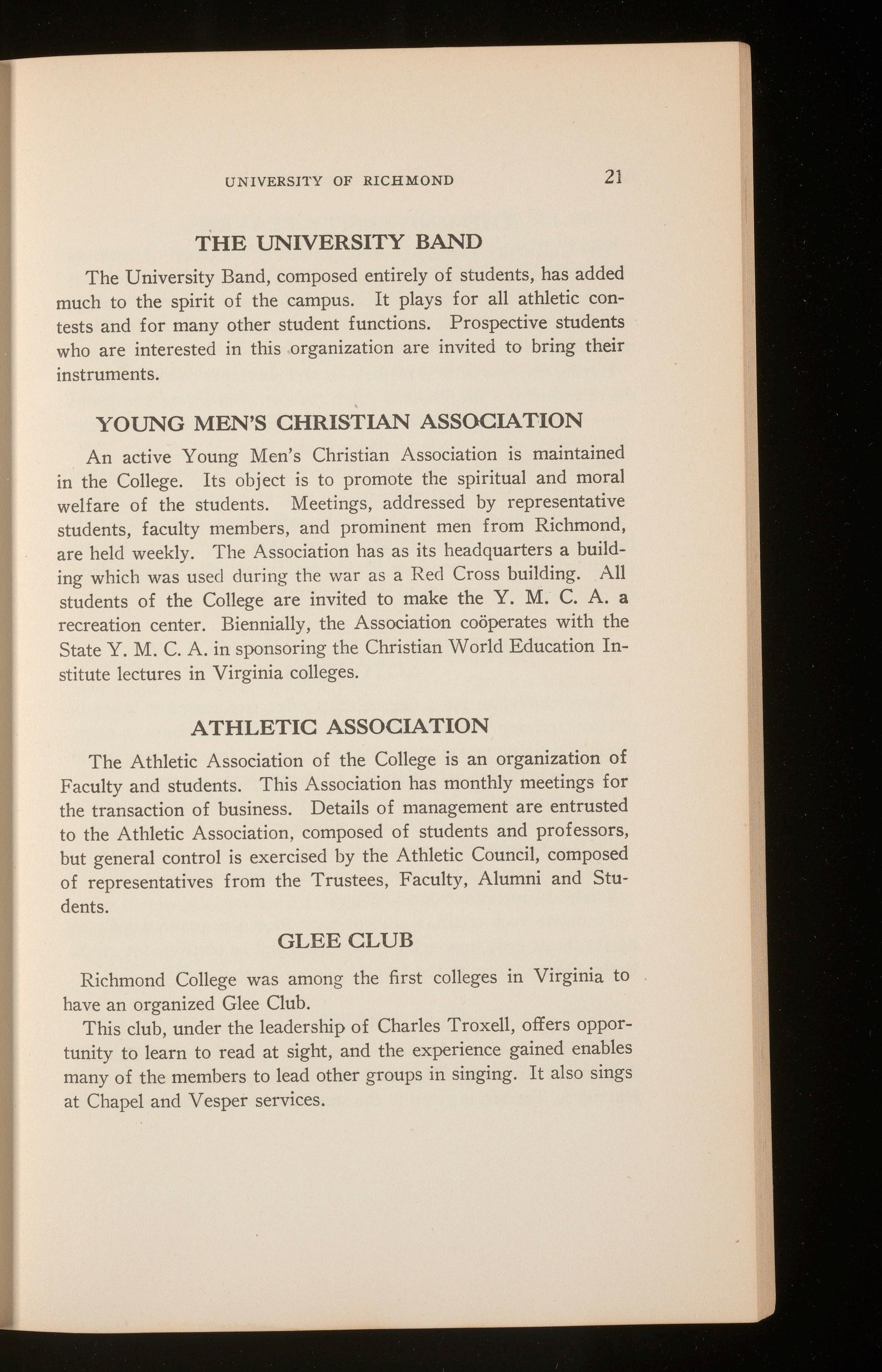
THE UNIVERSITY BAND
The University Band, composed entirely of students, has added much to the spirit of the campus. It plays for all athletic contests and for many other student functions. Prospective students who are interested in this organization are invited to bring their instruments.
YOUNG MEN'S CHRISTIAN ASSOCIATION
An active Young Men's Christian Association is maintained in the College. Its object is to promote the spiritual and moral welfare of the students. Meetings, addressed by representative students, faculty members, and prominent men from Richmond, are held weekly. The Association has as its headquarters a building which was used during the war as a Red Cross building. All students of the College are invited to make the Y. M. C. A. a recreation center. Biennially, the Association cooperates with the State Y. M. C. A. in sponsoring the Christian World Education Institute lectures in Virginia colleges.
ATHLETIC ASSOCIATION
The Athletic Association of the College is an organization of Faculty and students. This Association has monthly meetings for the transaction of business. Details of management are entrusted to the Athletic Association, composed of students and professors, but general control is exercised by the Athletic Council, composed of representatives from the Trustees, Faculty, Alumni and Students.
GLEE CLUB
Richmond College was among the first colleges in Virginia to have an organized Glee Club. This club, under the leadership of Charles Troxell, offers opportunity to learn to read at sight, and the experience gained enables many of the members to lead other groups in singing. It also sings at Chapel and Vesper services.

THE UNIVERSITY PLAYERS
The University Players is an organization composed of students from Richmond College and Westhampton College. The objects of the group are ( 1) to develop dramatic talent and the art of acting; ( 2) to cultivate a taste for the best in drama ; and ( 3) to foster the cultural values which dramatics develop.
During the year several plays, long and short, are produced under the direction of a professional coach. About once a year a series of one-act plays, primarily to try out new students, are given under the direction of the students themselves.
There is abundant opportunity for students to train themselves in staging, lighting, and make-up, as well as in acting.
Students are eligible to membership after they have succesfully portrayed roles in a limited number of plays. Each year keys are presented to those members in the two upper classes who have given conspicuous service to the organization.
CREDIT FOR EXTRA-CURRICULAR ACTIVIT1ES
Every candidate for a degree must offer two semester hours in physical training. He may also offer two additional hours in either physical training or extra-curricular activities. In computing credit for extra-curricular activities, the following scale is used:
Literary Society-¼ semester hour for each semester's work.
Glee Club-¼ semester hour a session.
Choir-¼ semester hour a session.
Inter-collegiate Debating-¼ semester hour a session.
Band-¼ semester hour a session.
To obtain such credit, a student must meet the qualifications set up for the activity in which he is engaged and be certified for credit to the Dean's office by the faculty adviser of that activity.
PRIZES
I. THE TANNER MEDAL.-Founded by Colonel William E. Tanner, of Richmond, Va., in honor of his parents, John F. and Harriet L. Tanner, is given to the student most proficient in Greek.

UNIVERSITYOF RICHMOND
II. THE JAMES D. CRUMP PRIZE.-Founded by the gentleman whose name it bears, is a prize of twenty dollars in gold, given for excellence in Courses 7-8 in Mathematics. It is awarded in part on the regular class work and in part on extra work.
III. THE J. TAYLORELLYSONMEDAL IN HrsTORY.-Lieutenant-Governor J. Taylor Ellyson, of Richmond, established in 1912 a prize to be awarded to the student in the Department of History and Political Science, who presents the best piece of original investigation in Virginia or Southern History.
IV. THE CHARLEST. NORMANMEDALfor the best graduate in the department of English has been endowed by Mr. Norman, and is awarded annually.
V. THE CHARLEST. NORMANMEDALfor the best graduate in the department of Business Administration has been endowed by Mr. Norman, and is awarded annually.
PHI BETA KAPPA
Elections to this society are from the honor students of Richmond College and of Westhampton College. These elections take place immediately following the close of the first semester of the student's Senior year.
OTHER HONOR SOCIETIES
Omicron Delta Kappa-for the recognition of high attainments in scholarship, athletics, literary endeavor and social leadership, with high emphasis on character.
Tau Kappa Alpha-for the recognition of forensic and debating attainments.
Pi Delta Epsilon-for the recognition of attainment in journalistic activities.
Sigma Pi Sigma-for the recognition of attainment in the field of Physics.
The Phoenix Society-for the recognition of attainment in the field of Biology.
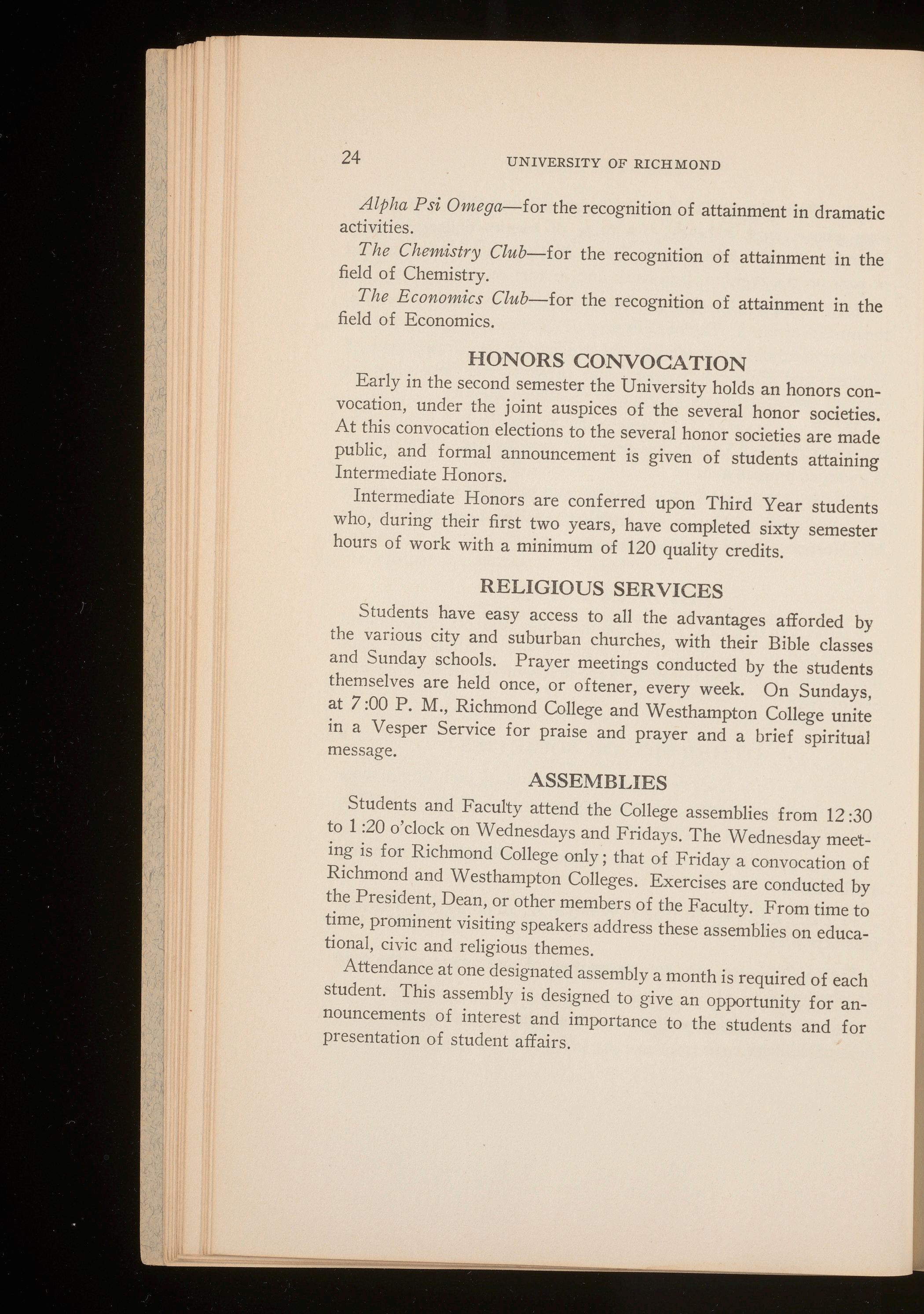
UNIVERSITY OF RICHMOND
Alp!za Psi Omega-for the recognition of attainment in dramatic activities.
The Chemistry Club-for the recognition of attainment in the field of Chemistry.
The Economics Club-for the recognition of attainment in the field of Economics.
HONORS CONVOCATION
Early in the second semester the University holds an honors con- vocation, under the joint auspices of the several honor societies. At this convocation elections to the several honor societies are made public, and formal announcement is given of students attaining Intermediate Honors.
Intermediate Honors are conferred upon Third Year students who, during their first two years, have completed sixty semester hours of work with a minimum of 120 quality credits.
RELIGIOUS SERVICES
Students have easy access to all the advantages afforded by the various city and suburban churches, with their Bible classes and Sunday schools. Prayer meetings conducted by the students themselves are held once, or oftener, every week. On Sundays, at 7 :00 P. M., Richmond College and Westhampton College unite in a Vesper Service for praise and prayer and a brief spiritual message.
ASSEMBLIES
Students and Faculty attend the College assemblies from 12 :30 to 1 :20 o'clock on Wednesdays and Fridays. The Wednesday meet- ing is for Richmond College only; that of Friday a convocation of Richmond and Westhampton Colleges. Exercises are conducted by the President, Dean, or other members of the Faculty. From time to time, prominent visiting speakers address these assemblies on educa- tional, civic and religious themes.
Attendance at one designated assembly a month is required of each student. This assembly is designed to give an opportunity for an- nouncements of interest and importance to the students and for presentation of student affairs.

THE THOMAS LECTURES
These Lectures are provided by "The Thomas Museum Lecture Endowment" of $11,000 donated by his family in memory of the late president of the corporation, James Thomas, Jr. They are delivered annually by eminent men on Science, Philosophy, Art or Literature and are open to the public without charge. Among the distinguished scholars who have delivered lectures on this Foundation are:
President Woodrow Wilson, Sir Robert Ball, Dr. Henry Van Dyke, Dr. B. L. Gildersleeve, Dr. Walter Hines Page, Dr. George E. Vincent, Dr. Robert A. Millikan, Dr. J. Holland Rose and Dr. Stephen B. Leacock.
UNIVERSITY WEEK
University Week was organized in 1927, and has become an annual event. The object of University Week is to bring to the campus friends of the University, particularly alumni, and to offer them intellectual stimulus and entertainment. The dates for University Week in 1934 are October 17th, 18th, 19th and 20th.
SOCIE~ OF ALUMNI
The Alumni of the College have long been organized into a Society, which holds annual meetings to renew old associations, maintain a close connection with Alma Mater, and further the cause of education and letters. The Association engages the services of an Alumni Secretary and publishes an Alumni Magazine. The officers of the Society are: John J. Wicker, Jr., Richmond, Va., President, and M. U. Pitt, Richmond, Va., Secretary.
LOCAL CHAP'DERS
In May, 1898, there was organized in Louisville, Ky., a local chapter of the General Society of Alumni, to be called the "Kentucky Chapter." Since that time other chapters have been organized in several states and in most of the cities of Virginia. The President of the University or Mr. M. U. Pitt, Secretary, will be glad to correspond with alumni in other places who desire to organize local chapters.

UNIVERSITYOF RICHMOND
The list of local alumni chapters is as follows:
LOUISVILLE,KY.-"The Kentucky Chapter"-Professor W. 0. Carver, LL.D., President.
NORFOLK,VA.-"The Norfolk-Portsmouth Chapter"-A. B. Bass, President.
NEWPORTNEws, VA.-"The Peninsula Chapter"-A. D. Jones, President.
RICHMOND, VA.-"The Richmond Chapter"-G. A. Carlton, President.
LYNCHBURG,VA.-"The Lynchburg Chapter"-A. R. Long, Esq., President.
ROANOKE,VA.-"The Roanoke Chapter"-R. S. Owens, D.D., President.
NEW YORK CITY-"The New York Chapter"-F. Morris Sayre, President.
DANVILLE,VA.-"The Pittsylvania Chapter"-Claude S. Whitehead, President.
BALTIMORE,Mn.-"The Maryland Chapter"-Dr. Allen W. Freeman, '99, President.
PETERSBURG,VA.-"The Petersburg Chapter"-Ro. Gilliam. _Tr., President.
BIRMINGHAM,ALA.-"The Alabama Chapter"-B. w. Lacy, rr., President.
TAMPA, FLA.-"The Florida Chapter"-Giddings E. Mabry, President.
BLUEFIELD,W. VA.-"The Southwest Virginia Chapter"-E. M. Louthan, First Vice-President.
BRISTOL,V A.-S. T. Bowman, President.
EAsT~RNSHORE-Geo. J. Oliver, President.
MARTINSVILLE,VA.-Dr. J. P. McCabe, President.
WASHINGTON,D. C.-Oscar W. Underwood, Jr., President.
FRANKLIN, VA.-"The Southampton County Chapter"-M. Eugene Williams, President.

ADMINISTRATION
ADMISSION TO COLLEGE
For admission to Richmond College the general requirements are a s follows :
1. The applicant must be at least sixteen years of age.
2. The applicant must present a certificate of honorable dismissal and the principal's recommendation from the last school attended.
3. The applicant may be admitted ( 1) on a certificate from an accredited secondary school; (2) on a written examination; ( 3) on a transcript from another college.
ENTRANCE REQUIREMENTS
The entrance requirements are stated in Carnegie units. A unit represents a standard session's study in any subject, and constitutes approximately a quarter of a year's work. The requirements are graduation from an accredited secondary school, with not less than fifteen acceptable units distributed as follows: English, 3; Algebra, 1.½; Plane Geometry, 1; History, 1; Science, 1; the remaining units elective from high school graduation requirements, except that not more than four units of vocational work will be accepted, and no credit will be allowed for less than two units in any foreign language. ( See footnote, page 39.)
ENTRANCE EXAMINATIO\NS
Entrance examinations will be held at the College on the two days immediately preceding the opening of the session. Application for such examination should be made to the Dean not less than four weeks previous to the time at which the examination is desired. There will be no charge for entrance examinations taken on the scheduled dates, but a fee of two dollars will be charged if they are taken at any other time.
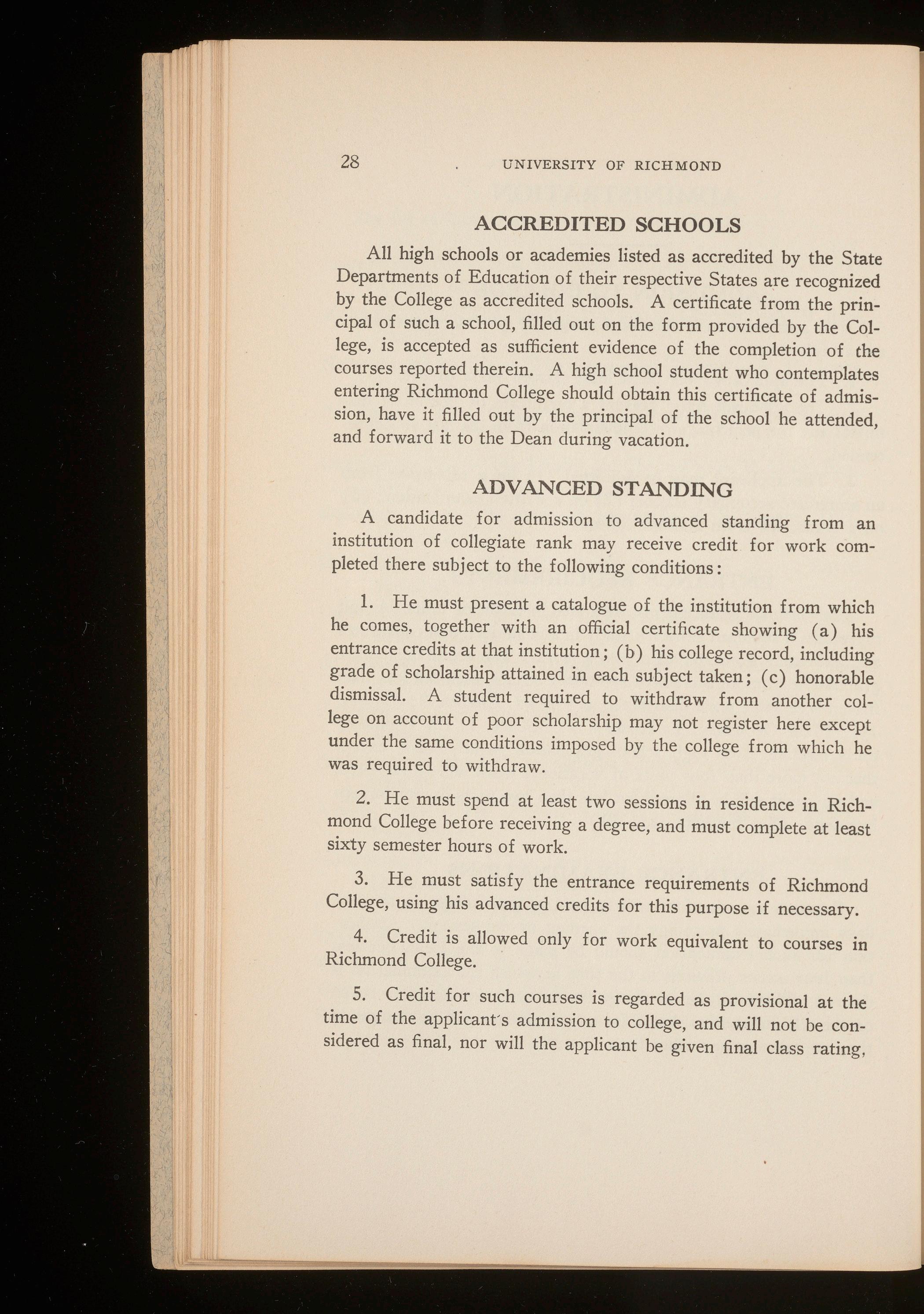
ACCREDITED SCHOOLS
All high schools or academies listed as accredited by the State Departments of Education of their respective States are recognized by the College as accredited schools. A certificate from the principal of such a school, filled out on the form provided by the College, is accepted as sufficient evidence of the completion of the courses reported therein. A high school student who contemplates entering Richmond College should obtain this certificate of admission, have it filled out by the principal of the school he attended, and forward it to the Dean during vacation.
ADVANCED STANDING
A candidate for admission to advanced standing from an institution of collegiate rank may receive credit for work completed there subject to the following conditions:
1. He must present a catalogue of the institution from which he comes, together with an official certificate showing (a) his entrance credits at that institution; (b) his college record, including grade of scholarship attained in each subject taken; (c) honorable dismissal. A student required to withdraw from another college on account of poor scholarship may not register here except under the same conditions imposed by the college from which he was required to withdraw.
2. He must spend at least two sessions in residence in Richmond College before receiving a degree, and must complete at least sixty semester hours of work.
3. He must satisfy the entrance requirements of Richmond College, using his advanced credits for this purpose if necessary.
4. Credit is allowed only for work equivalent to courses in Richmond College.
5. Credit for such courses is regarded as provisional at the time of the applicant ' s admission to college, and will not be considered as final, nor will the applicant be given final class rating ,

until he has satisfactorily completed at least one semester's work in Richmond College.
6. Certificates from other colleges are not accepted for the final required work in any department except by special action of the Faculty. Students who hold such certificates may satisfy the final requirements of any department either by examination or l!>y taking in course further work in that department.
MATRICULATION
Matriculation of freshmen and new students begins Tuesday, September 11th. Oasses meet for organization Friday and Saturday, September 14th and 15th. Every applicant for admission, upon arriving at the College, should report promptly at the Dean's office. If he has been a student at any other college, he should present a detailed certificate of work accomplished there, as well as a statement in regard to his character. If he comes from an academy or high school, he should bring with him, in case he has not already sent it, an admission certificate duly filled out and signed by the principal of the school he last attended. Admission certificates should be in the hands of the Dean, for reference to the proper committee, during the summer.
When the certificate of admission has been approved, the student, in consultation with the Committee on Courses and Degrees, decides upon a course of study and fills out the matriculation card. When this has been approved by the Dean, it should be presented to the Treasurer of the College, who, upon the payment of the required fees, will deliver to the student his registration cards and complete his matriculation.
Students who fail to complete matriculation by 12 :00 o'clock, noon, of the third day of the session, September 15th, will be charged an extra fee of $5.00.

THE PERSONNEL WORK, FRESHMAN ORIENTA- TION WEEK, AND THE FACULTY ADVISER SYSTEM
Personnel Work.-The personnel work is in the charge of the Personnel Committee, a standing committee of the Faculty, with a permanent office and staff. This committee seeks to cooperate with the Dean and other administrative officers in bringing about a closer and more personal relation between students and Faculty; in keep- ing permanent records of the various students, including scholastic records, records of extra-curricular activities, and complete personal histories; in advising the students with regard to their courses, their college life, and their life-careers; and in assisting the students to secure positions after graduation. Two special interests of the Personnel Committee are connected with the orientation of Freshmen and the supervision of the Faculty Adviser System.
Freshnian Orientation W eek.-AII Freshmen are required to be present several days in advance of the formal opening of the college in the autumn for what is known as Freshman Orientation Week. During this period the Freshmen attend various lectures and meet- ings acquainting them with the ideals of the College, the nature of the work that will be required of them, and the various activities of college life. The Faculty and many of the leading students take part in this program. The Freshman class is organized, and the Freshmen begin to feel at home in the college before the arrival of most of the student body. The program closes with the matricula- tion of Freshmen, one day in advance of that of the upper-classmen. Freshman Orientation Week occurs this year from September 10th to September 13th. All Freshmen are required to be present on September 10th.
The Faculty Adviser Systeni.-Every student on entrance into the College is assigned a Faculty member as his adviser, the object being that each student may have at least one member of the Fac- ulty with whom, on a friendly footing, he may discuss his problems, both personal and scholastic, and may receive such advice as may enable him to adjust himself better to college life. Ordinarily the student may choose his own Faculty Adviser, if there is a faculty member whom he especially desires in this capacity. Usually he
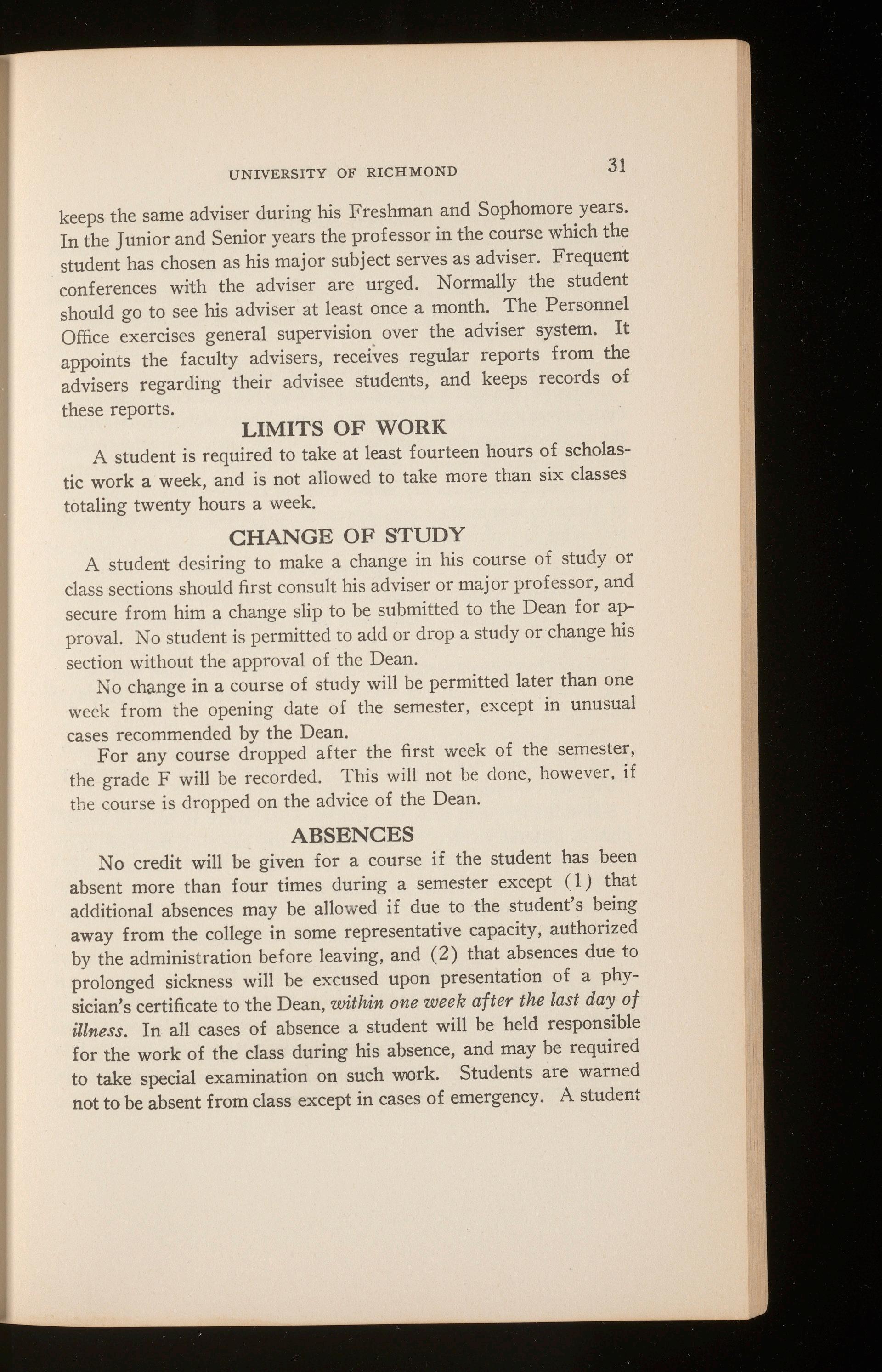
UNIVERSITY OF RICHMOND
keeps the same adviser during his Freshman and Sophomore years. In the Junior and Senior years the professor in the course which the student has chosen as his major subject serves as adviser. Frequent conferences with the adviser are urged. Normally the student should go to see his adviser at least once a month. The Personnel Office exercises general supervision over the adviser system. It appoints the faculty advisers, receives regular reports from the advisers regarding their advisee students, and keeps records of these reports.
LIMITS OF WORK
A student is required to take at least fourteen hours of scholastic work a week, and is not allowed to take more than six classes totaling twenty hours a week.
CHANGE OF STUDY
A student desiring to make a change in his course of study or class sections should first consult his adviser or major professor, and secure from him a change slip to be submitted to the Dean for approval. No student is permitted to add or drop a study or change his section without the approval of the Dean.
No change in a course of study will be permitted later than one week from the opening date of the semester, except in unusual cases recommended by the Dean.
For any course dropped after the first week of the semester, the grade F will be recorded. This will not be done, however, if th e course is dropped on the advice of the Dean.
ABSENCES
No credit will be given for a course if the student has been absent more than four times during a semester except ( 1) that additional absences may be allowed if due to the student's being away from the college in some representative capacity, authorized by the administration before leaving, and (2) that absences due to prolonged sickness will be excused upon presentation of a physician's certificate to the Dean, within one week after the last day of illness. In all cases of absence a student will be held responsible for the work of the class during his absence, and may be required to take special examination on such work. Students are warned not to be absent from class except in cases of emergency. A student
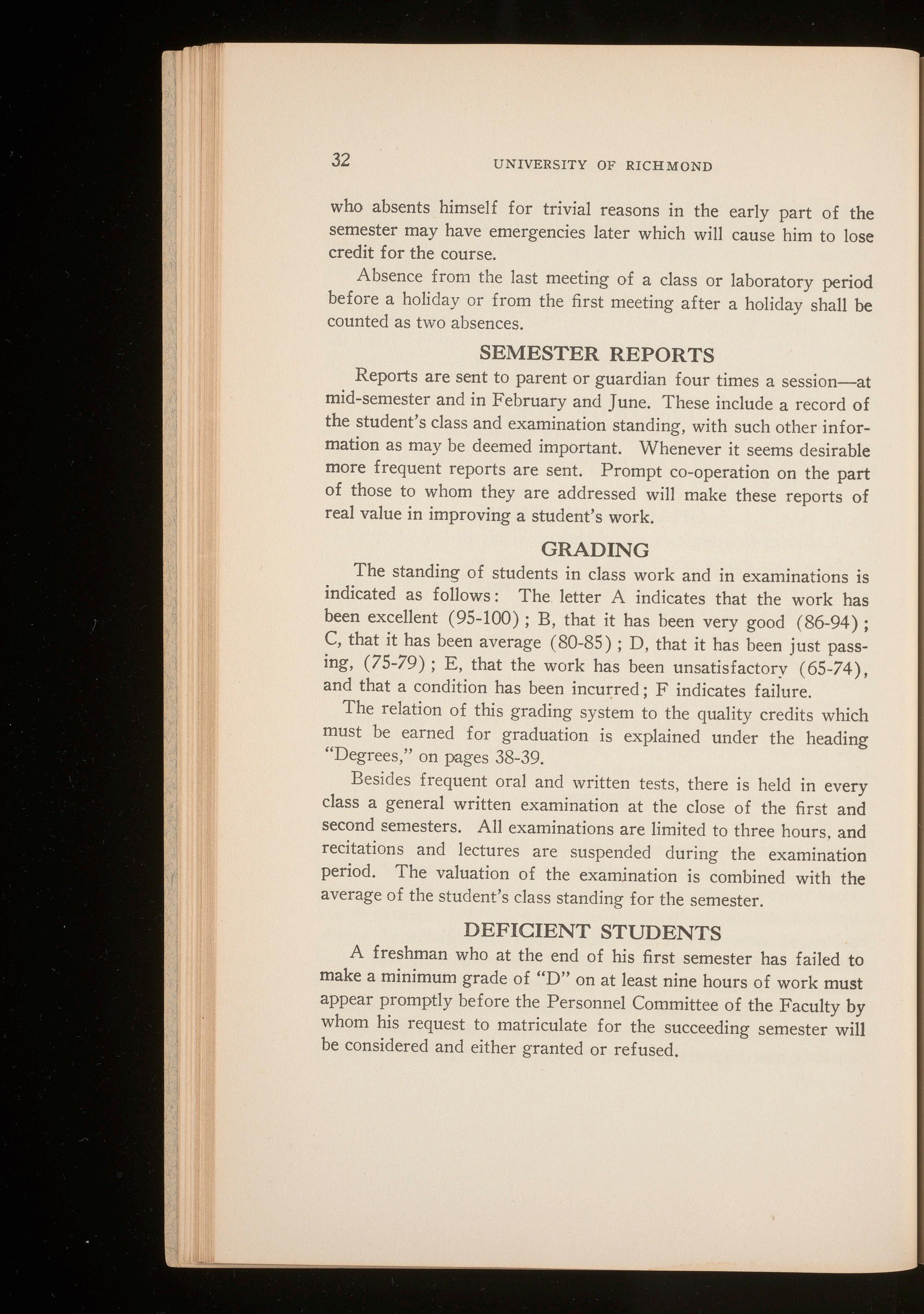
UNIVERSITY OF RICHMOND
who absents himself for trivial reasons in the early part of the semester may have emergencies later which will cause him to lose credit for the course.
Absence from the last meeting of a class or laboratory period before a holiday or from the first meeting after a holiday shall be counted as two absences.
SEMESTER REPORTS
Reports are sent to parent or guardian four times a session-at mid-semester and in February and June. These include a record of the student's class and examination standing, with such other infor- mation as may be deemed important. Whenever it seems desirable more frequent reports are sent. Prompt co-operation on the part of those to whom they are addressed will make these reports of real value in improving a student's work.
GRADING
The standing of students in class work and in examinations is indicated as follows : The letter A indicates that the work has been excellent (95-100) ; B, that it has been very good (86-94) ; C, that it has been average (80-85); D, that it has been just pass- ing, (75-79) ; E, that the work has been unsatisfactory ( 65-74), and that a condition has been incurred ; F indicates failure.
The relation of this grading system to the quality credits which must be earned for graduation is explained under the heading "Degrees," on pages 38-39.
Besides frequent oral and written tests, there is held in every class a general written examination at the close of the first and second semesters. All examinations are limited to three hours. and recitations and lectures are suspended during the examination period. The valuation of the examination is combined with the average of the student's class standing for the semester.
DEFICIENT STUDENTS
A freshman who at the end of his first semester has failed to make a minimum grade of "D" on at least nine hours of work must appear promptly before the Personnel Committee of the Faculty by whom his request to matriculate for the succeeding semester will be considered and either granted or refused.
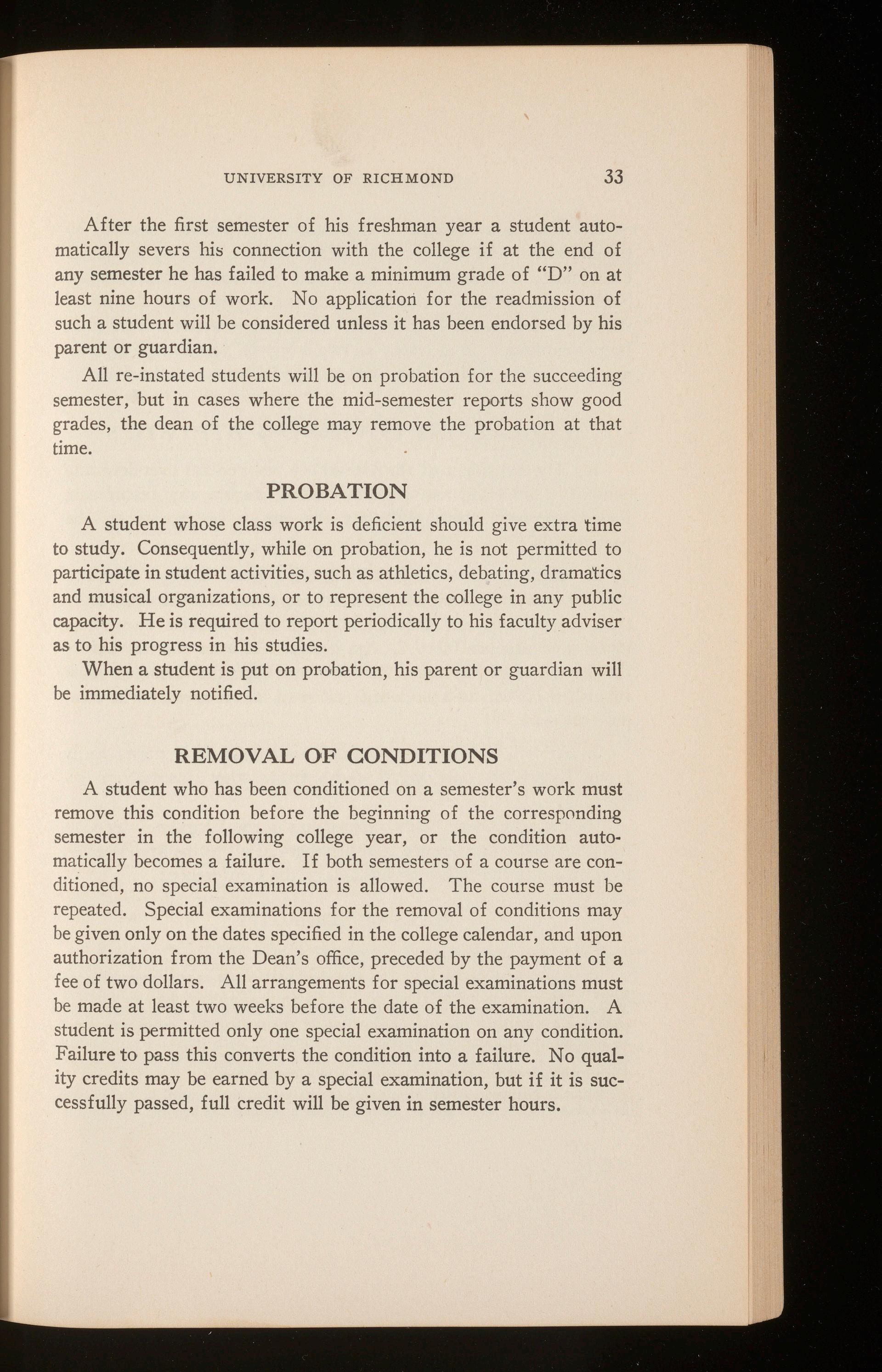
After the first semester of his freshman year a student automatically severs his connection with the college if at the end of any semester he has failed to make a minimum grade of "D" on at least nine hours of work. No application for the readmission of such a student will be considered unless it has been endorsed by his parent or guardian.
All re-instated students will be on probation for the succeeding semester, but in cases where the mid-semester reports show good grades, the dean of the college may remove the probation at that time.
PROBATION
A student whose class work is deficient should give extra time to study. Consequently, while on probation, he is not permitted to participate in student activities, such as athletics, debating, dramatics and musical organizations, or to represent the college in any public capacity. He is required to report periodically to his faculty adviser as to his progress in his studies.
When a student is put on probation, his parent or guardian will be immediately notified.
REMOVAL OF CONDITIONS
A student who has been conditioned on a semester's work must remove this condition before the beginning of the corresponding semester in the following college year, or the condition automatically becomes a failure. If both semesters of a course are conditioned, no special examination is allowed. The course must be repeated. Special examinations for the removal of conditions may be given only on the dates specified in the college calendar, and upon authorization from the Dean's office, preceded by the payment of a fee of two dollars. All arrangements for special examinations must be made at least two weeks before the date of the examination. A student is permitted only one special examination on any condition. Failure to pass this converts the condition into a failure. No quality credits may be earned by a special examination, but if it is successfully passed, full credit will be given in semester hours.
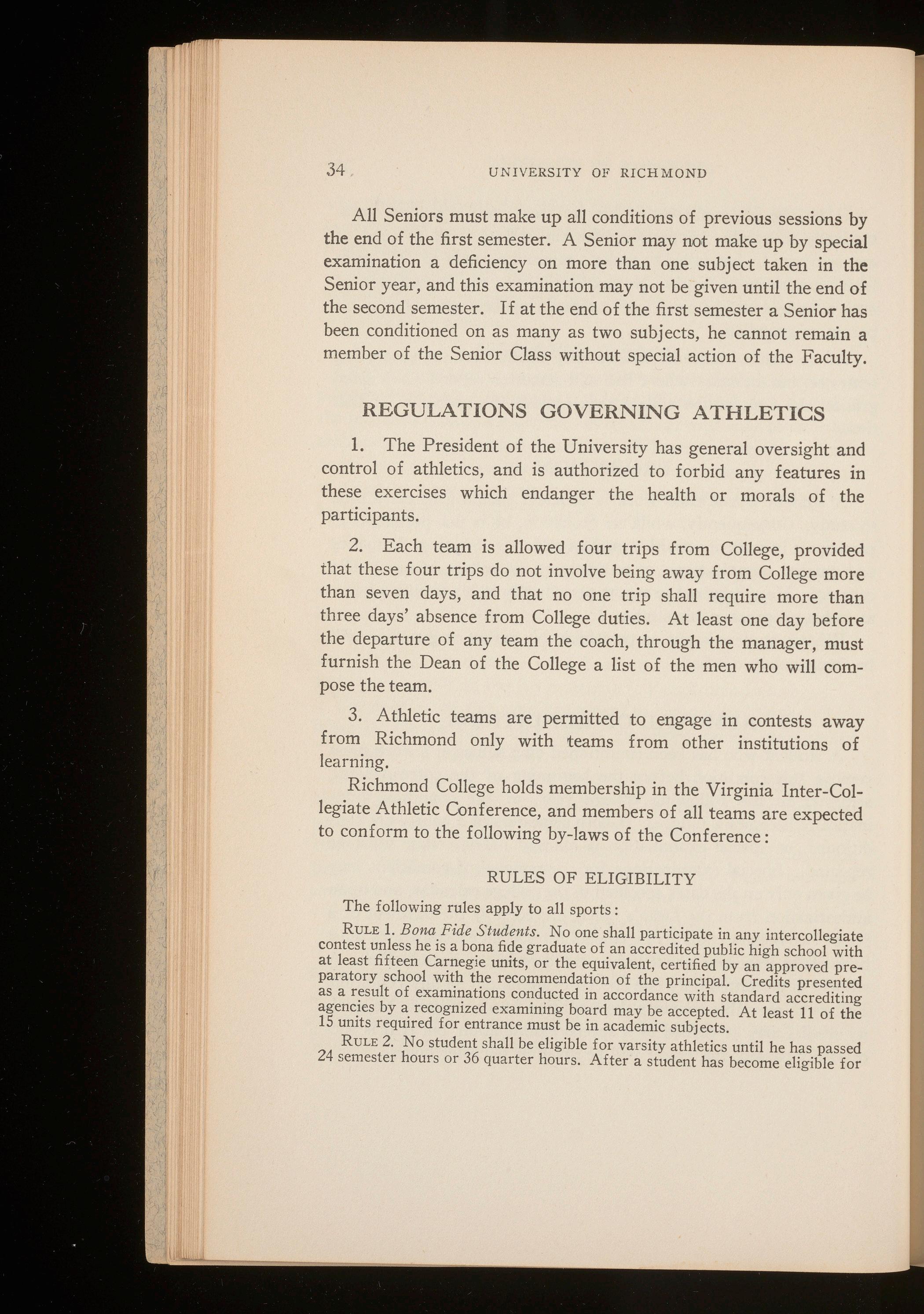
UNIVERSITY OF RICHMOND
All Seniors must make up all conditions of previous sessions by the end of the first semester. A Senior may not make up by special examination a deficiency on more than one subject taken in the Senior year, and this examination may not be given until the end of the second semester. If at the end of the first semester a Senior has been conditioned on as many as two subjects, he cannot remain a member of the Senior Class without special action of the Faculty.
REGULATIONS GOVERNING ATHLETICS
1. The President of the University has general oversight and control of athletics, and is authorized to forbid any features in these exercises which endanger the health or morals of the participants.
2. Each team is allowed four trips from College, provided that these four trips do not involve being away from College more than seven days, and that no one trip shall require more than three days' absence from College duties. At least one day before the departure of any team the coach, through the manager, must furnish the Dean of the College a list of the men who will compose the team.
3. Athletic teams are permitted to engage in contests away from Richmond only with teams from other institutions of learning.
Richmond College holds membership in the Virginia Inter-Collegiate Athletic Conference, and members of all teams are expected to conform to the following by-laws of the Conference:
RULES OF ELIGIBILITY
The following rules apply to all sports :
RuLE 1. Bona Fide Students. No one shall participate in any intercollegiate contest unless he is a bona fide graduate of an accredited public high school with at least fifteen Carnegie units, or the equivalent, certified by an approved pre- paratory school with the recommendation of the principal. Credits presented as a result of examinations conducted in accordance with standard accrediting agencies by a recognized examining board may be accepted. At least 11 of the 15 units required for entrance must be in academic subjects.
RULE 2. No student shall be eligible for varsity athletics until he has passed 24 semester hours or 36 quarter hours. After a student has become eligible for
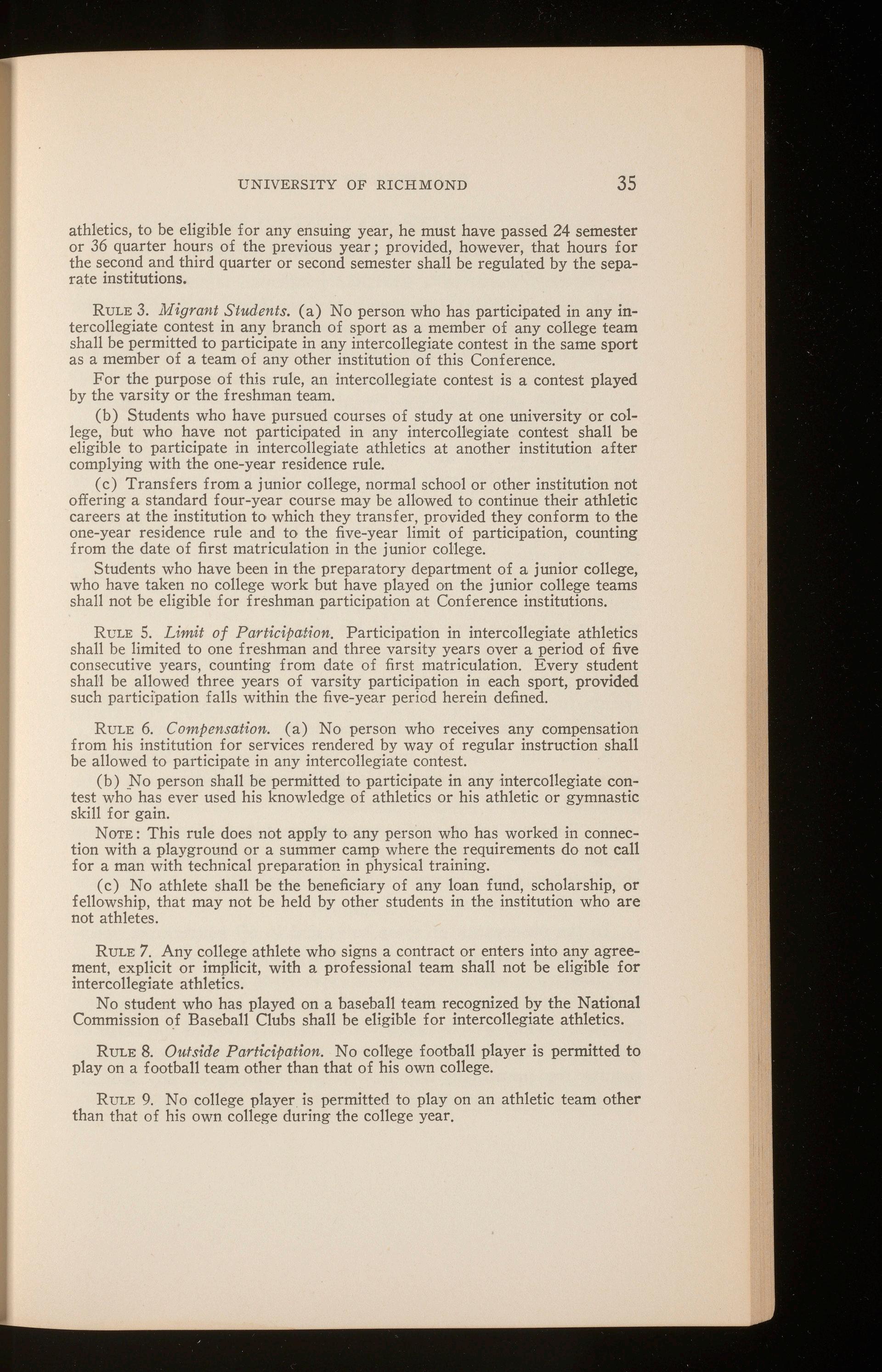
athletics, to be eligible for any ensuing year, he must have passed 24 semester or 36 quarter hours of the previous year; provided, however, that hours for the second and third quarter or second semester shall be regulated by the separate institutions.
RULE 3. 1\!IigrantStudents. (a) No person who has participated in any intercollegiate contest in any branch of sport as a member of any college team shall be permitted to participate in any intercollegiate contest in the same sport as a member of a team of any other institution of this Conference .
For the purpose of this rule, an intercollegiate contest is a contest played by the varsity or the freshman team.
(b) Students who have pursued courses of study at one university or college, but who have not participated in any intercollegiate contest shall be eligible to participate in intercollegiate athletics at another institution after complying with the one-year residence rule.
(
c) Transfers from a junior college, normal school or other institution not offering a standard four-year course may be allowed to continue their athletic careers at the institution to which they transfer, provided they conform to the one-year residence rule and to the five-year limit of participation, counting from the date of first matriculation in the junior college.
Students who have been in the preparatory department of a junior college, who have taken no college work but have played on the junior college teams shall not be eligible for freshman participation at Conference institutions.
RuLE 5. Limit of Participation. Participation in intercollegiate athletics shall be limited to one freshman and three varsity years over a period of five consecutive years, counting from date of first matriculation. Every student shall be allowed three years of varsity participation in each sport, provided such participation falls within the five-year period herein defined.
RuLE 6. Compensation. (a) No person who receives any compensation from his institution for services rendered by way of regular instruction shall be allowed to participate in any intercollegiate contest.
(b) No person shall be permitted to participate in any intercollegiate contest who has ever used his knowledge of athletics or his athletic or gymnastic skill for gain.
NOTE: This rule does not apply to any person who has worked in connection with a playground or a summer cam))' where the requirements do not call for a man with technical preparation in physical training.
( c) No athlete shall be the beneficiary of any loan fund, scholarship, or fellowship, that may not be held by other students in the institution who are not athletes.
RULE 7 Any college athlete who signs a contract or enters into any agreement, explicit or implicit, with a professional team shall not be eligible for intercollegiate athletics.
No student who has played on a baseball team recognized by the National Commission o f Baseball Clubs shall be eligible for intercollegiate athletics.
RULE 8. Outside Participa ,tion. No coUege football vlayer is permitted to play on a football team other than that of his own college.
RuLE 9. No college player is permitted to play on an athletic team other than that of his own college during the college year.

GENERAL REGULATIONS
The deportment of a Christian gentleman is the standard to which every student is expected to conform. All appropriate means are used t o develop and confirm a sense of personal honor and sacred regard for truth, as upon these rests the best reliance for good conduct. A few plain and reasonable rules are prescribed, and each matriculate must pledge himself to obey them.
1. Occupants will be held responsible for the good order of their rooms and for any damage or defacement. Changes from one room to another may be allowed by the Dean, but must not be made without his consent.
2. A resident student desiring to leave the premises during the hours when, by the schedule of recita~ions, he should be in his classes, shall get permission from the Dean. Any student desiring to be absent from college must get the Dean's permit in writing and show it to each of his professors.
3. If a student destroys, defaces, or in any way damages college property, or aids and abets others in so doing, he s~all within twenty-four hours report the fact to the Dean. Students will be charged pro rata for all damages not individually accounted for.
4. No club or society may be formed unless the Faculty approves its plan and purpose, the rules by which it proposes to be governed, and the hours of meeting.
5. Students desiring to room and board elsewhere than on the college premises must first obtain the approval of the Dean. No boarding houses can be approved whose meal hours do not conform to the college schedule.
In the observance of these rules and in all matters not specifically mentioned, the deportment of a gentleman and a student is the standard to which every one is expected to conform. His sense of honor is the main reliance, and his word in matters touching his own conduct will be called for at the discretion of the Dean or President. In matriculating students, the right is reserved to require the immediate withdrawal from college of any student whenever the faculty decides that such action is desirable.
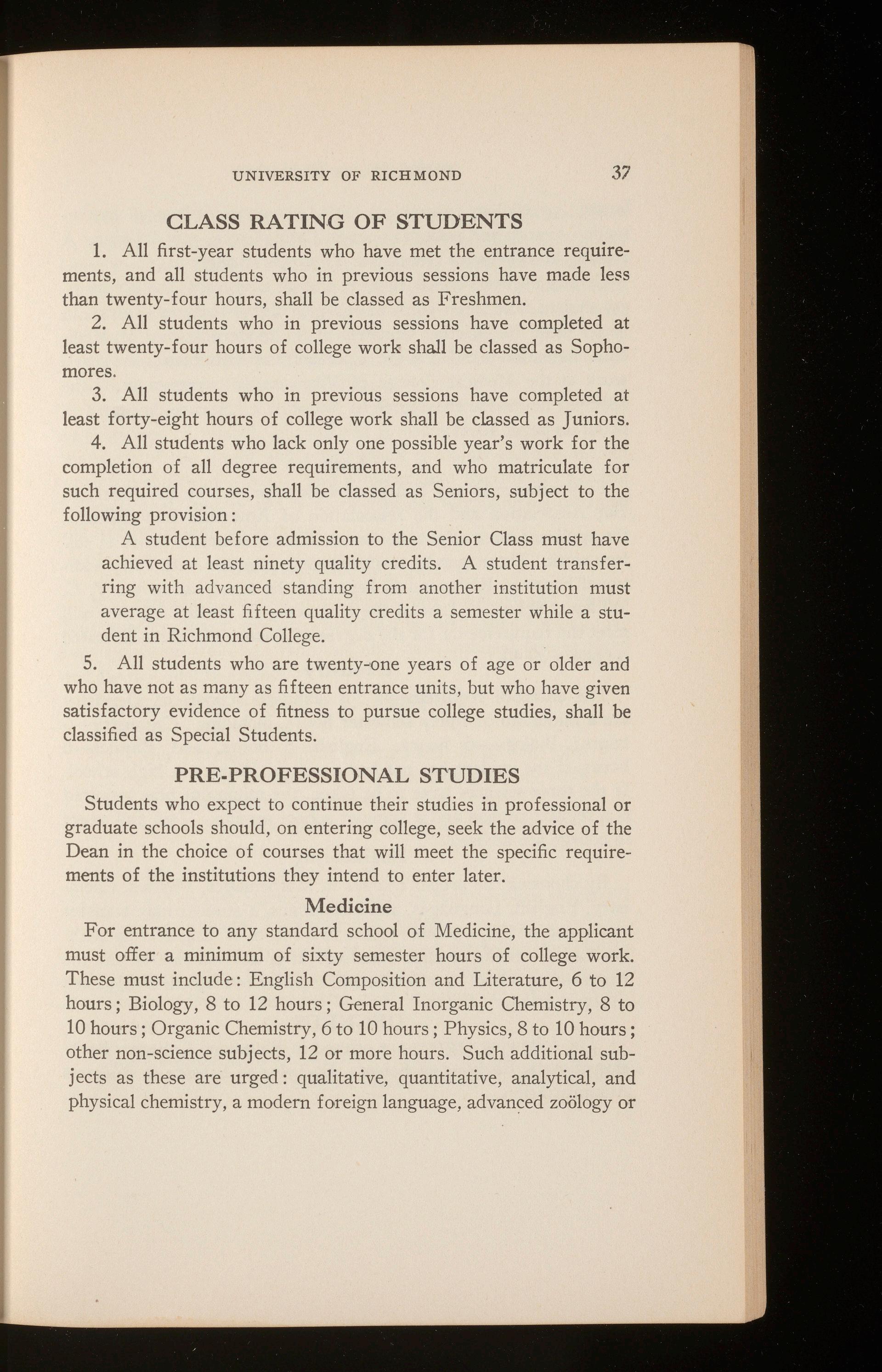
CLASS RATING OF STUDENTS
1. All first-year students who have met the entrance requirements, and all students who in previous sessions have made less than twenty-four hours, shall be classed as Freshmen.
2. All students who in previous sessions have completed at least twenty-four hours of college work shall be classed as Sophomores .
3. All students who in previous sessions have completed at least forty-eight hours of college work shall be classed as Juniors.
4. All students who lack only one possible year's work for the completion of all degree requirements, and who matriculate for such required courses, shall be classed as Seniors, subject to the following provision : A student before admission to the Senior Class must have achieved at least ninety quality credits. A student transferring with advanced standing from another institution must average at least fifteen quality credits a semester while a student in Richmond College.
5. All students who are twenty-one years of age or older and who have not as many as fifteen entrance units, but who have given satisfactory evidence of fitness to pursue college studies, shall be classified as Special Students.
PRE-PROFESSIONAL STUDIES
Students who expect to continue their studies in professional or graduate schools should, on entering college, seek the advice of the Dean in the choice of courses that will meet the specific requirements of the institutions they intend to enter later.
Medicine
For entrance to any standard school of Medicine, the applicant must offer a minimum of sixty semester hours of college work. These must include: English Composition and Literature, 6 to 12 hours; Biology, 8 to 12 hours; General Inorganic Chemistry, 8 to 10 hours; Organic Chemistry, 6 to 10 hours; Physics, 8 to 10 hours; other non-science subjects, 12 or more hours. Such additional subjects as these are urged: qualitative, quantitative, analytical, and physical chemistry, a modern foreign language, advanced zoology or

botany, psychology, sociology, logic, economics, advanced mathematics, history and political science, Latin, Greek, and drawing. A reading knowledge of German or French is strongly urged.
Certain medical schools require, and all advise that the pre-medical student take three years in college ( ninety semester hours), to better meet the exacting demands of the modern science of Medicine. Attention is called to the opportunity of substituting one year's work at the Medical College of Virginia for twenty-four of the required hours for the degree of Bachelor of Science, as stated in detail on pages 40-41.
Law
For entrance to any School of Law approved by the America11 Bar Association and the Association of American Law Schools, the applicant must offer a minimum of sixty semester hours of college work. These may be so chosen that, together with forty additional hours in Richmond College and the first year in the T. C. Williams School of Law of the University of Richmond, they will meet the requirements for the degree of Bachelor of Arts, as stated on pages 39-40.
Dentistry
The entrance requirements for standard schools of Dentistry are a minimum of thirty semester hours, including: Chemistry-6 hours ; Biology-6 hours ; English-6 hours, and Physics-6 hours, if the student has not had a unit of Physics in high school. If the three sciences have to be taken, the minimum time required is a regular session and a summer school session. Two full yeari, in college are advised.
Engineering
By choosing the proper courses in Mathematics, Physics, Chemistry, English, Languages, and Economics, a student may transfer at the end of the sophomore year to a school of Engineering without loss of credits or class standing. It is advised that he ask the Engineering school to which he will transfer to map out a suggested course for him.
DEGREES
The following degrees are offered in Richmond College: Bachelor of Arts, Bachelor of Science, Bachelor of Science in Business Administration.

The academic requirements for the several degrees are stated in semester hours, one class period per week through a semester being the unit. Quality credits are calculated from academic hours on the following basis : A semester hour passed with grade A shall count three quality credits; with grade B, two quality credits; with grade C, one quality credit; with grade D, no quality credit. It is further required that the Senior year and at least one other shall have been spent in Richmond College.
It is to be noted that the work of the first two years is specified as to groups of related subjects and in some cases as to subjects; the work of the junior and senior years is mainly elective, except as to the choice of a major and a minor, and the further general principle that Juniors and Seniors may not elect courses intended for Freshmen and Sophomores.
BACHELOR OF ARTS
The candidate must have completed one hundred and twentyfour semester hours, two of which must be, and four of which may be, in physieal training. He must also have attained one hundred and twenty quality credits.
The distribution of work is as follows:
I. REQUIRED SUBJECTS:
(a) Foreign Languages-eighteen hours in two languages, based on four secondary school units.*
(b) Mathematics-six hours.
(
c) Laboratory Science-ten hours in each of two sciences.
(
d) English-twelve hours.
(
e) Social Science-six hours in each of three subjects.t
( f) Physical Training-two hours.
Of these seventy-six hours of required work, at least fortyeight must be taken in the Freshman and Sophomore years, and the remaining tw~nty-eight hours must be taken not later than the Junior year.
*Students who enter college with less than four units in language will be required to take an additional semester course in colle~e. without degree credit. for each unit lackine-. tThe social sciences include: Education, History, Philosophy, Psychology, and Sociology.
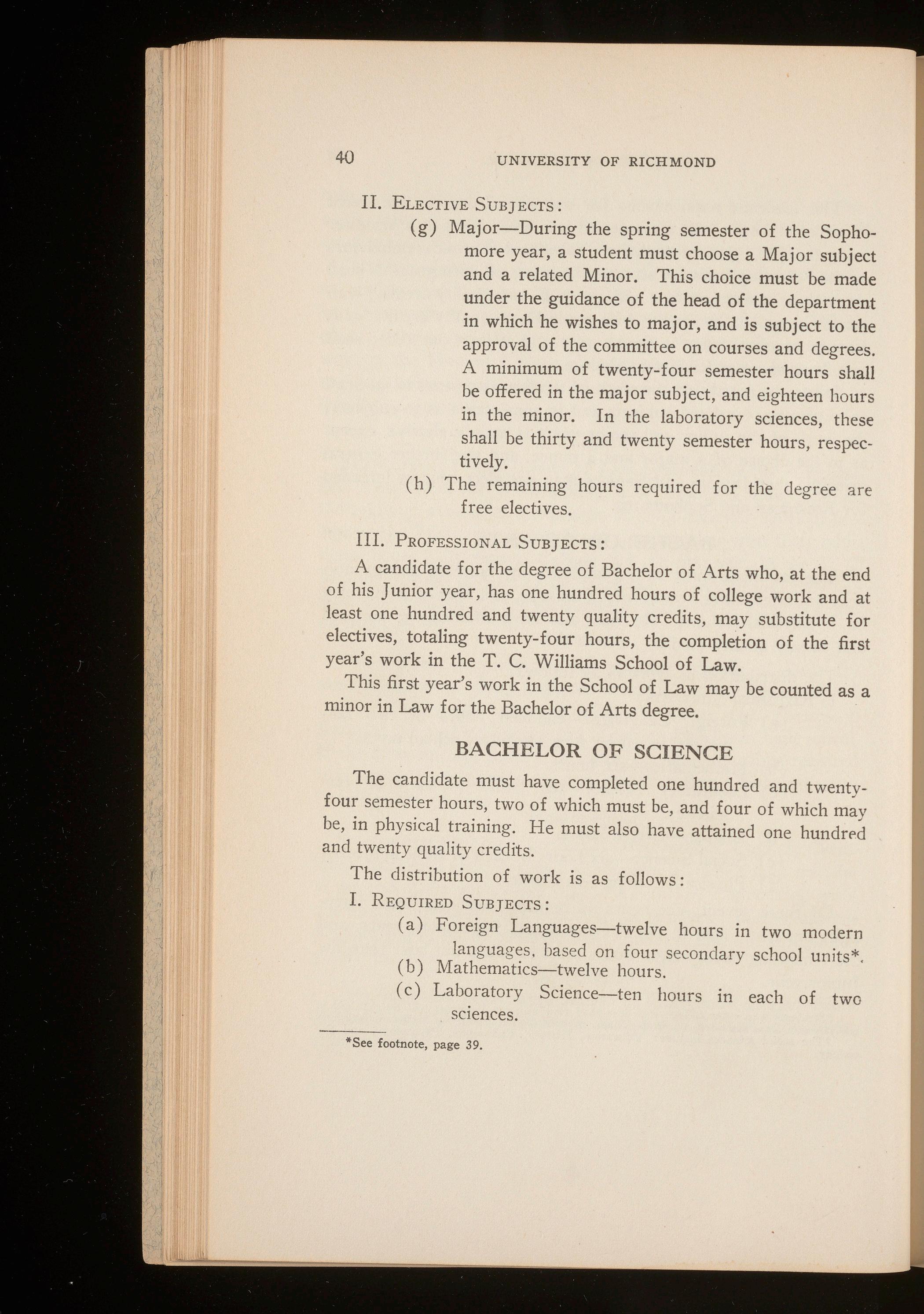
II. ELECTIVE SUBJECTS:
(g) Major-During the spring semester of the Sophomore year, a student must choose a Major subject and a related Minor. This choice must be made under the guidance of the head of the department in which he wishes to major, and is subject to the approval of the committee on courses and degrees. A minimum of twenty-four semester hours shall be offered in the major subject, and eighteen hours in the minor. In the laboratory sciences, these shall be thirty and twenty semester hours, respectively.
(h) The remaining hours required for the degree a re free electives.
III. PROFESSIONAL SUBJECTS:
A candidate for the degree of Bachelor of Arts who, at the end of his Junior year, has one hundred hours of college work and at least one hundred and twenty quality credits, may substitute for electives, totaling twenty-four hours, the completion of the first year's work in the T. C. Williams School of Law.
This first year's work in the School of Law may be counted as a minor in Law for the Bachelor of Arts degree.
BACHELOR OF SCIENCE
The candidate must have completed one hundred and twentyfour semester hours, two of which must be, and four of which may be, in physical training. He must also have attained one hundrf'd and twenty quality credits.
The distribution of work is as follows:
I. REQUIRED SUBJECTS:
(a) Foreign Languages-twelve hours in two modern langua ges. ba sed on four secondary school units* .
(
(b) Mathematics-twelve hours.
c) Laboratory Science-ten hours in each of two sciences.
*See footnote, page 39.

( d) English-twelve hours.
( e) Social Science-six hours in each of two subjects. t
( f) Physical Training-two hours.
Of these seventy hours of required subjects at least fortyeight must be taken in the Freshman and Sophomore years, and the remaining twenty-two must be taken not later than the Junior year.
II. ELECTIVE SUBJECTS:
(g) Major-During the spring semester of the Sophomore year, a student must choose a Major subject and a related Minor from subjects included under (b) and ( c). This choice must be made under the guidance of the head of the department in which he wishes to major, and is subject to the approval of the committee on courses and degrees. A minimum of twenty-four semester hours shall be offered in the major subject, and eighteen hours in the minor. In the laboratory sciences, these shall be thirty and twenty semester hours, respectively.
(h) Remaining hours for the degree are free electives.
III. PROFESSIONAL SUBJECTS:
A candidate for the degree of Bachelor of Science who, at the end of his Junior year, has one hundred hours of college work, and who has at least one hundred and twenty quality credits, may substitute for electives, totaling twenty-four hours, the completion of the first year's work in the Medical College of Virginia.
He may also substitute for the second year's work in Mathematics, stipulated under I (b), a year's work in a third Laboratory Science, and the foreign language requirements may be satisfied in one language.
The first year's work in the Medical College may be counted as a minor in Medicine for the Bachelor of Science degree.
tSee footnote, p. 39.

BACHELOR OF SCIENCE IN BUSINESS ADMINISTRATION
The candidate must have completed one hundred and twentyfour semester hours, two of which must be, and four of which may be, in physical training. He must also have attained one hundred and twenty quality credits.
The distribution of work is as follows:
I. REQUIRED SUBJECTS:
(a) Foreign Languages-twelve hours in two modern languages, based on four secondary school units.* (b) Mathematics-six hours.
( c) Laboratory Science-ten hours in one science. ( d) English-twelve hours.
( e) Social Science-eighteen hours in at least two Departments other than those included under ( f). t
(f) Economics and Business Administration-forty-eight hours, including Economics 1-2, Mathematics 3-4, Business Administration 3-4, and Accounting 1-2.
(g) Physical Training-two hours.
II. ELECTIVE SUBJECTS:
(h) During , the spring semester of the Sophomore year, the student must choose a major subject from the departments of Business Administration and Economics, which will complete the forty-eight hours listed under ( f). This choice must be made under the guidance of the head of the department in which the student wishes to major, and is subject to the approval of the committee on courses and degrees. Possible majors for this degree include: Business Administration, Accounting, and Economics. It is strongly recommended that a student majoring in Business Administration specialize in Banking and Finance or in Public Administration.
( i) The remaining hours are free electives.
*See footnote, page 39.
tSee footnote, page 39.
SUGGESTED CURRICULA
These curricula do not state the requirements of the various majors that may be offered for the several degrees. Students may find out the requirements of their majors by consulting the sections on their major departments under "Courses of Instruction."
BACHELOR OF ARTS

Freshman:
English 1-2
Science 1-2
Mathematics 1-2
Con. Civ. 1-2
Foreign Language (offered for entrance) 3-4
Physical Training
Junior:
Major Subject
Minor Subject
Second Foreign Language 3-4
Social Science
Electives
Freshman:
English 1-2
Science 1-2
Mathematics 1-2
Con. Civ. 1-2
Sophomore:
English 3-4
Second Science 1-2
Second Foreign Language 1-2
Social Science
Social Science
Physical Training
Senior:
Major Subject
Minor Subject (if necessary)
Electives
BACHELOR OF SCIENCE
Sophomore:
English 3-4
Second Science 1-2
Second Foreign Language 1-2
Social Science
Foreign Language (offered for entrance) 3-4
Physical Training
Junior:
Major Subject
Minor Subject
Second Foreign Language 3-4
Social Science
Electives
Mathematics 5-6
Physical Training
Senior:
Major Subject
Minor Subject (if necessary) Electives
UNIVERSITY OF RICHMOND
BACHELOR OF SCIENCE IN BUSINESS ADMINISTRATION
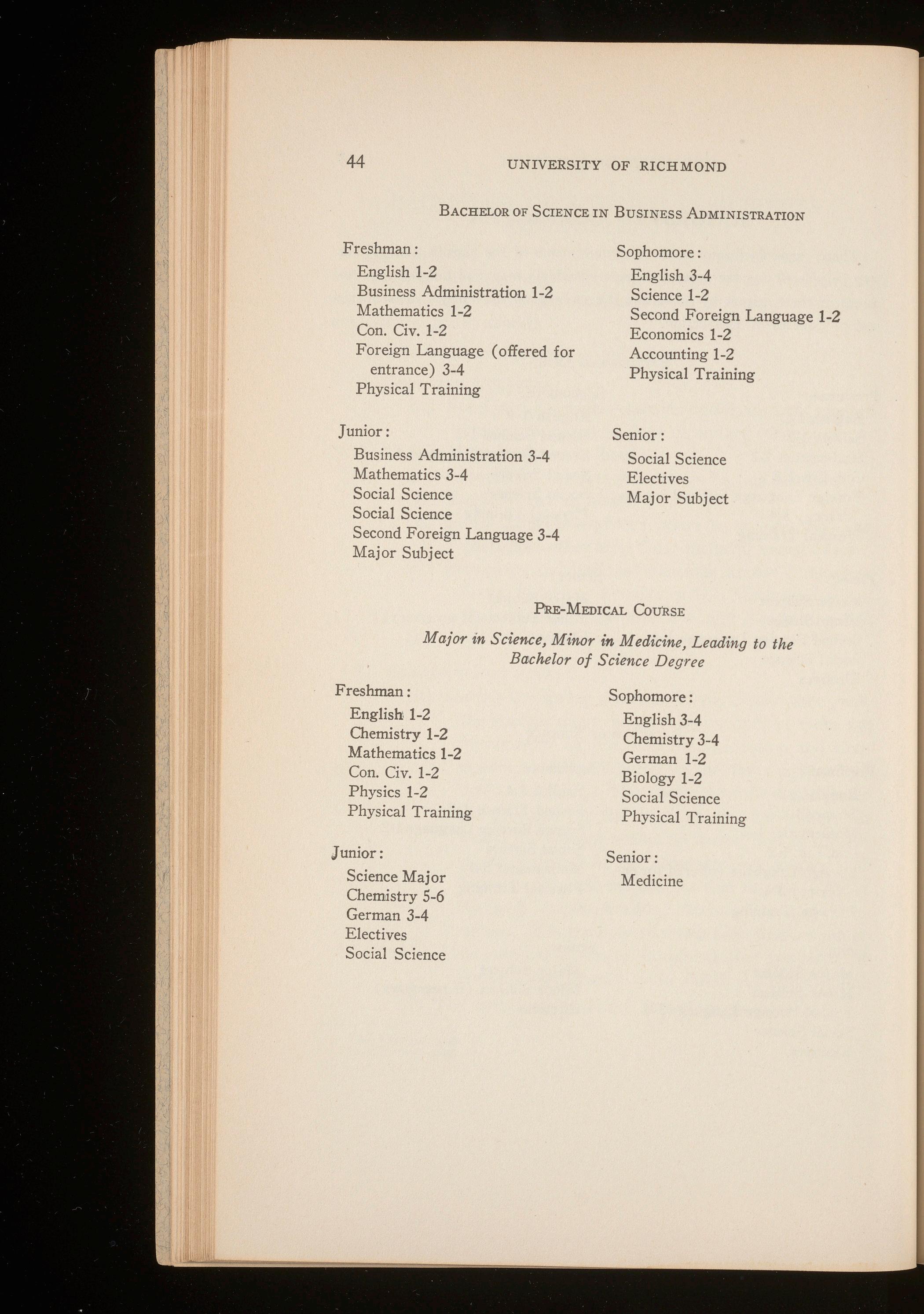
Freshman:
English 1-2
Business Administration 1-2
Mathematics 1-2
Con. Civ. 1-2
Foreign Language (offered for entrance) 3-4
Physical Training
Junior:
Business Administration 3-4
Mathematics 3-4
Social Science
Social Science
Second Foreign Language 3-4
Major Subject
Freshman:
Sophomore:
English 3-4
Science 1-2
Second Foreign Language 1-2
Economics 1-2
Accounting 1-2
Physical Training
Senior:
Social Science
Electives
Major Subject
PRE-MEDICAL CoU'RsE
Major in Science, Minor in Medicine, Leading to the Bachelor of Science Degree
English : 1-2
Chemistry 1-2
Mathematics 1-2
Con. Civ. 1-2
Physics 1-2
Physical Training
Junior:
Science Major
Chemistry 5-6
German 3-4
Electives
Social Science
Sophomore:
English 3-4
Chemistry 3-4
German 1-2
Biology 1-2
Social Science
Physical Training
Senior: Medicine
UNIVERSITY OF RICHMOND
PRE-LAw CouRsE
Major in Academic Subject, Minor in Law, for the Bachelor of Arts Degree
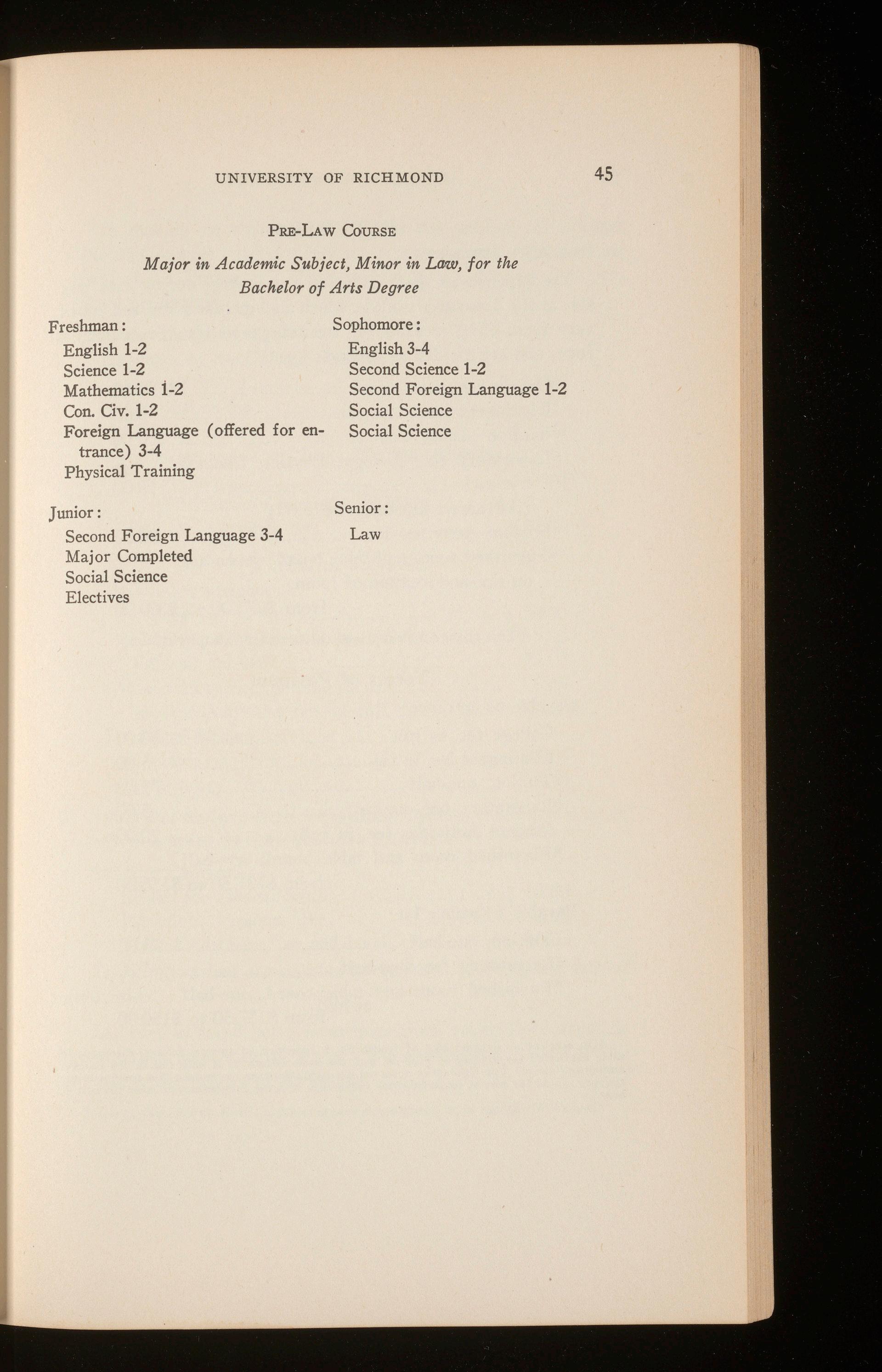
Freshman:
English 1-2
Science 1-2
Mathematics i-2
Con. Civ. 1-2
Foreign Language ( offered for entrance) 3-4
Physical Training
Junior:
Second Foreign Language 3-4
Major Completed
Social Science Elect ives
Sophomore:
English3-4
Second Science 1-2
Second Foreign Language 1-2
Social Science
Social Science
Senior: Law
1. RESIDENT STUDENTS
The expenses of students residing in College dormitories, pay able at the Treasurer's office, which also include room and board, vary from $510 to $535 for the college session, September to June, and are divided as follows :
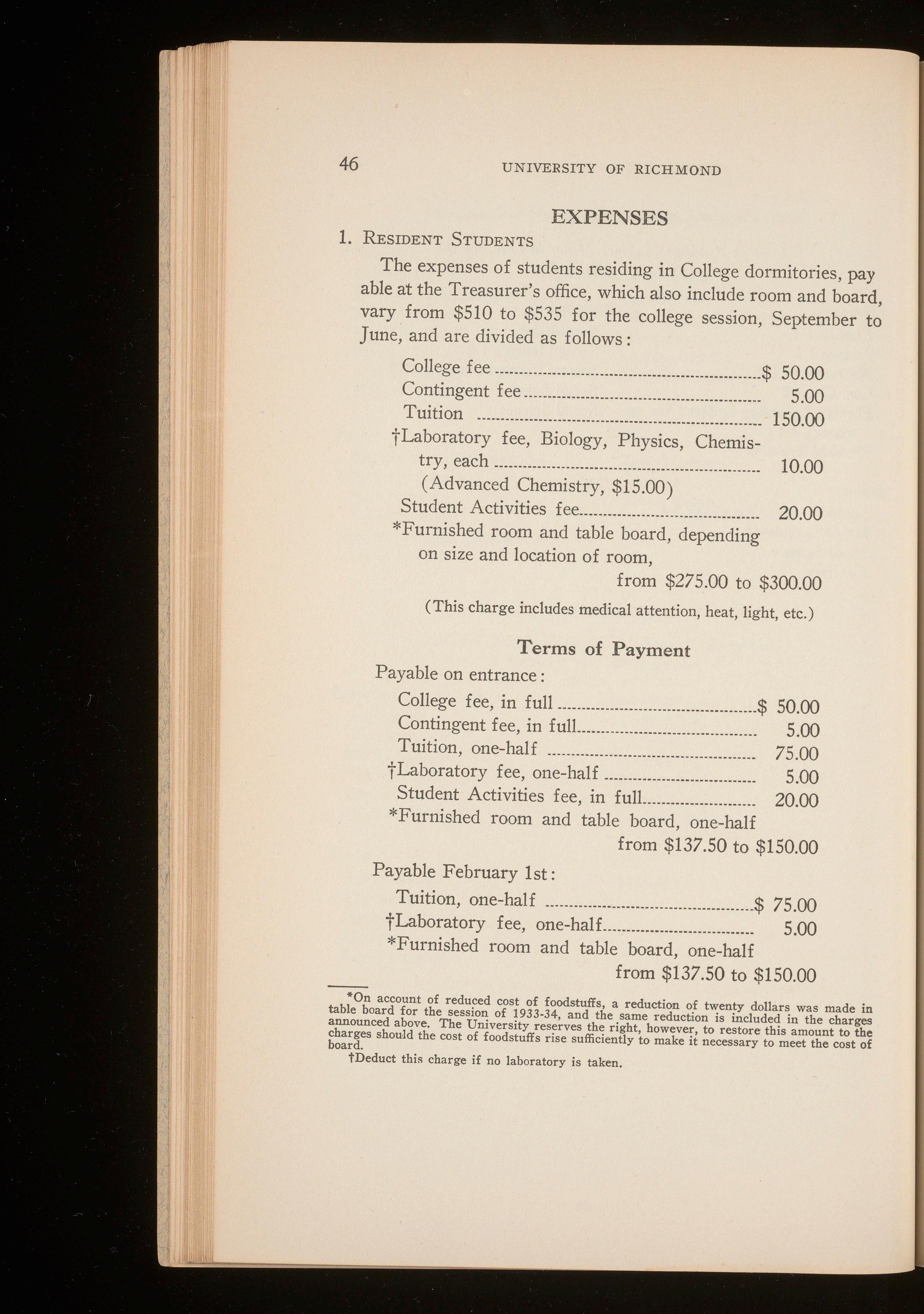
(Advanced Chemistry, $15.00)
*Furnished room and table board, depending on size and location of room, from $275.00 to $300.00
(This charge includes medical attention, heat, light, etc.)
Terms of Payment
Payable on entrance
Payable February 1st:
*On account of reduced cost of foodstuffs, a reduction of twenty dollars was made in table board for the session of 1933·34, and the same reduction is included in the charges announced above. The University reserves the right, however, to restore this amount to the charges should the cost of foodstuffs rise sufficiently to make it necessary to meet the cost of board.
tDeduct this charge if no laboratory is taken.
In making an estimate of cost for the session, the student should also take into consideration other expenses which are not paid at the Treasurer's office, such as books, laundry and personal incidentals.
2. NON-RESIDENT STUDENTS
Expenses of the College Session:
........................................................
(Advanced Chemistry, $15.00)
Terms of Payment
Payable on entrance:
in
..........................................
in
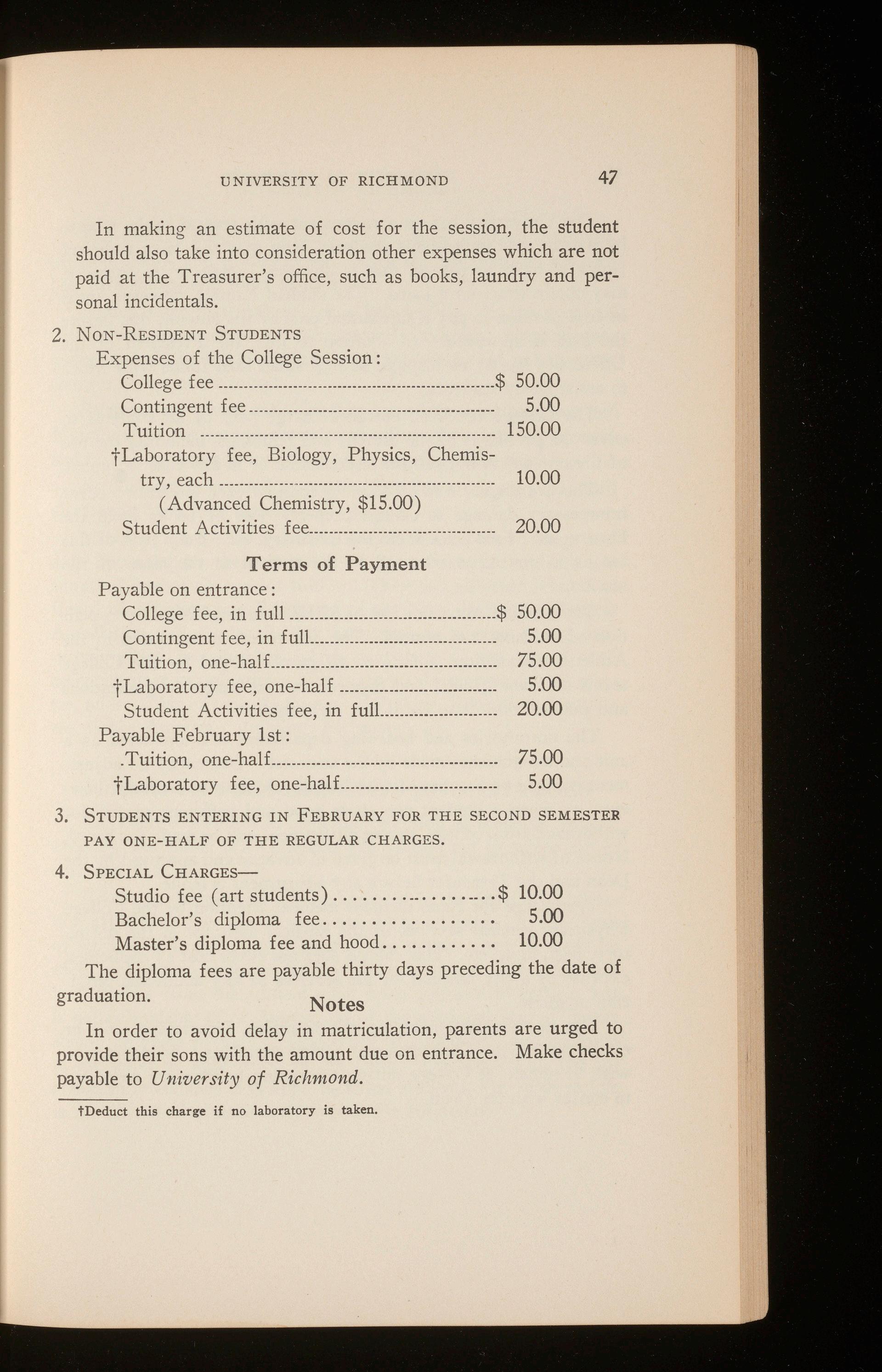
Payable February 1st: .Tuition, one-half..............................................
3. STUDENTS ENTERING IN FEBRUARY FOR THE SECOND SEMESTER PAY ONE-HALF OF THE REGULAR CHARGES.
4. SPECIAL CHARGES-
Studio fee ( art students) ................... $ 10.00 Bachelor's diploma fee.................. 5.00 Master's diploma fee and hood............ 10.00
The diploma fees are payable thirty days preceding the date of graduation.
Notes
In order to avoid delay in matriculation, parents are urged to provide their sons with the amount due on entrance. Make checks payable to University of Richmond.
tDeduct this charge if no laboratory is taken.
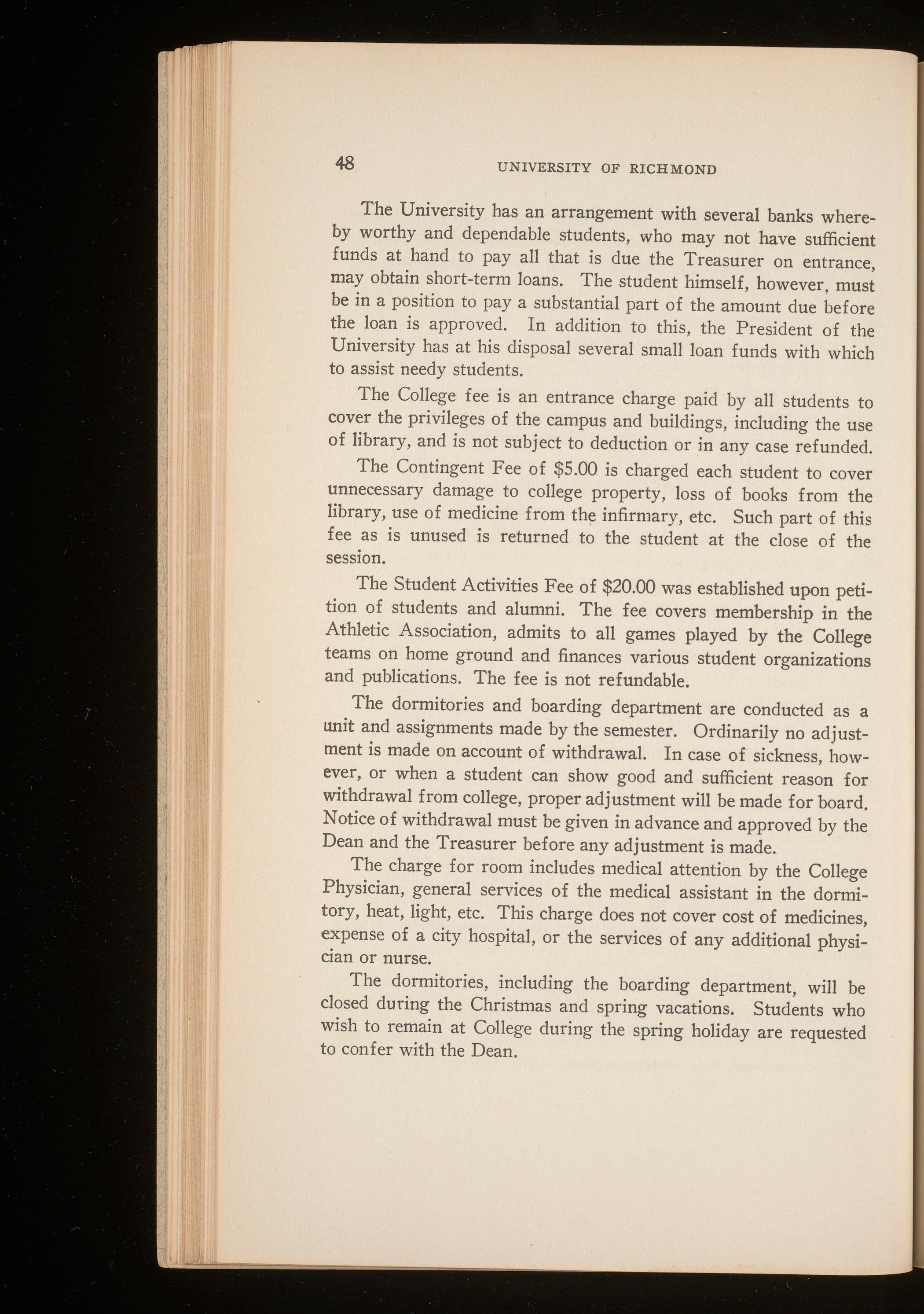
The University has an arrangement with several banks where- by worthy and dependable students, who may not have sufficient funds at hand to pay all that is due the Treasurer on entrance, may obtain short-term loans. The student himself, however, must be in a position to pay a substantial part of the amount due before the loan is approved. In addition to this, the President of the University has at his disposal several small loan funds with which to assist needy students.
The College fee is an entrance charge paid by all students to cover the privileges of the campus and buildings, including the use of library, and is not subject to deduction or in any case refunded.
The Contingent Fee of $5.00 is charged each student to cover unnecessary damage to college property, loss of books from the library, use of medicine from the infirmary, etc. Such part of this fee as is unused is returned to the student at the close of the sess10n.
The Student Activities Fee of $20.00 was established upon peti- tion of students and alumni. The fee covers membership in the Athletic Association, admits to all games played by the College teams on home ground and finances various student organizations and publications. The fee is not refundable.
The dormitories and boarding department are conducted as a unit and assignments made by the semester. Ordinarily no adjust- ment is made on account of withdrawal. In case of sickness, how- ever, or when a student can show good and sufficient reason for withdrawal from college, proper adjustment will be made for board. Notice of withdrawal must be given in advance and approved by the Dean and the Treasurer before any adjustment is made.
The charge for room includes medical attention by the College Physician, general services of the medical assistant in the dormitory, heat, light , etc. This charge does not cover cost of medicines, expense of a city hospital, or the services of any additional physi- cian or nurse.
The dormitories, including the boarding department, will be closed during the Christmas and spring vacations. Students who wish to remain at College during the spring holiday are requested to confer with the Dean.

The College supplies students' rooms with bedstead, mattress, dresser, chairs, and clothes closet. Each student provides his own bed furnishings and toilet articles.
Students are matriculated for a full session. In the event of withdrawal on account of the student's sickness, proportionate deduction will be made in the charge for board, but not in other charges or for other causes.
Students are given until October 1st of the first semester and March 1st of the second semester to adjust their laboratory work and no refund is made for laboratory fees after these dates.
No diploma is granted or credit given for session's work until all charges have been satisfactorily settled.
Ministers of the Gospel of all denominations, and young men duly approved by their churches as pre-ministerial students are admitted free of charge for tuition. They pay all other fees. The Board of Missions and Education of the Virginia Baptist General Association will render further assistance to worthy young men recommended by churches which contribute to the Board, and accepted after examination. For further information on this matter, address Mr. Frank T. Crump, Secretary, Education Committee, Grace-American Building, Richmond, Va.
DORMITORY ASSIGNMENTS AND CHARGES
The college dormitories open for reception of students Sunday evening, September 9th. Students are advised not to arrive earlier than this date.
Rooms in dormitories will be assigned in the order of application after May 1st. Application should be addressed to the Dean of Richmond College. A deposit of ten dollars must be made by each applicant in order to hold a particular room. This fee will be deducted from the student's bill upon entrance to college, but is not refundable after August 1st of the sessional year. Checks should be made payable to University of Richmond, and enclosed in the letter of application to the Dean. On account of the increase in attendance it is important that students who wish to live in the dormitories make early application for rooms.

UNIVERSITY OF RICHMOND
Charges for furnished rooms, including medical attention, heat, light, and care of rooms, vary from $70.00 to $80.00 for each of the two occupants of a double room, and from $75.00 to $95.00 for the occupant of a single room. It is understood that a single occupant of any room intended for two students shall be respon- sible for the full rent of the room. In case two students are per- mitted to occupy a room intended for one student, or three a room for two students, the minimum charge for each occupant is seventy dollars. No student is allowed to sub-let his room, take another student in with him, or move from one room to another without permission from the Dean. A charge of five dollars is made for changing from one room to another after October 1st, except that students are permitted, without paying this charge, to change rooms at the end of the first semester provided request for such change is filed with the Dean on or before January 20 of the cur- rent session. The charge will be enforced after the opening of the second semester.

COURSES OF INSTRUCTION
All odd numbered courses are given during the first semester and even numbered courses in the second semester. Double numbers indicate full session courses, where no credit may be given for one semester without the other. Figures in parenthesis indicate the number of semester hours credit allowed.
CONTEMPORARY CIVILIZATION
1 (3) AN INTRODUCTIONTO CONTEMPORARYCIVILIZATIONAND CULTURE. The purpose of this course is to furnish a panoramic view of contemporary fields of knowledge. The course will be taught by members of the faculty from all departments of the College, and will treat four general divisions : social sciences, physical sciences, biological sciences, and the humanities. In addition, considerable emphasis will be placed on such questions as how to take class notes and notes on reading matter, how to use the library, how to study, and social relationships. Required of aU Freshmen.
2 (3) AN INTRODUCTIONTO CONTEMPORARYCIVILIZATIONAND CULTURE. A continuation of Course 1. Required of all Fr;eshmen.
ANCIENT LANGUAGES
PROFESSORHARRIS
AssocrA TE
PROFESSORHACKLEY
Greek
The object of this Department is to introduce the student to the literature of ancient Greece, to give him an appreciation of the precision of the language, and a consciousness of the Greek love for artistic beauty and proportion.
For a major in Greek the student must take Courses 5, 6, 7, and 8 or their equivalent. Parallel reading will be assigned and reported upon.
For a minor in Greek, Courses 5 and 6 are required.
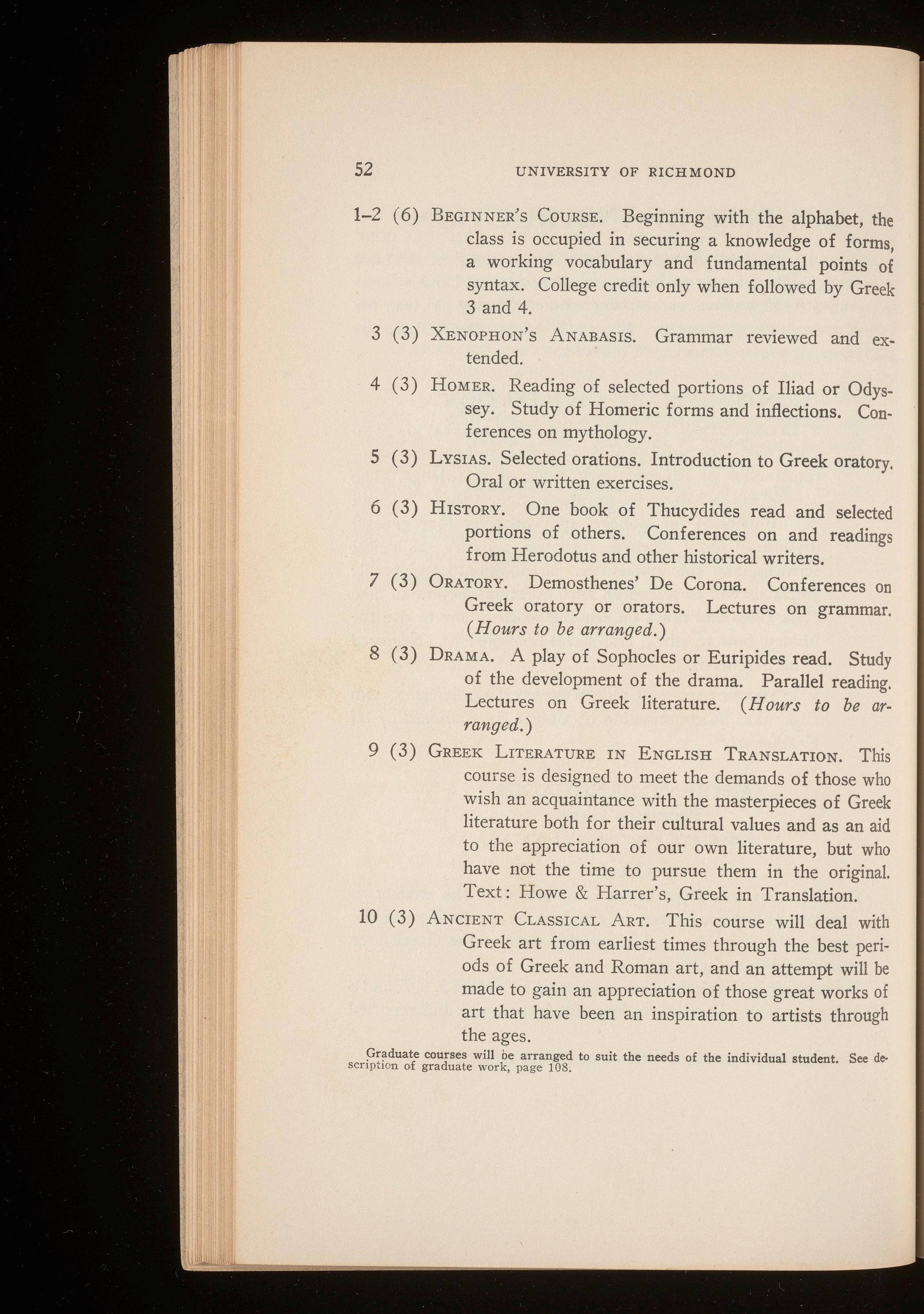
1-2 (6) BEGINNER'SCouRsE. Beginning with the alphabet, the class is occupied in securing a knowledge of forms, a working vocabulary and fundamental points of syntax. College credit only when followed by Greek 3 and 4.
3 (3) XENOPHON'S ANABASIS. Grammar reviewed and extended.
4 ( 3) HOMER. Reading of selected portions of Iliad or Odyssey. Study of Homeric forms and inflections. Conferences on mythology.
5 ( 3) LYSIAS.Selected orations. Introduction to Greek oratory. Oral or written exercises.
6 (3) HISTORY. One book of Thucydides read and selected portions of others. Conferences on and readings from Herodotus and other historical writers.
7 (3) ORATORY. Demosthenes' De Corona. Conferences on Greek oratory or orators. Lectures on grammar. (Hours to be arranged.)
8 ( 3) DRAMA. A play of Sophocles or Euripides read. Study of the development of the drama. Parallel reading. Lectures on Greek literature. (Hours to be arranged.)
9 (3) GREEK LITERATUREIN ENGLISH TRANSLATION.This course is designed to meet the demands of those who wish an acquaintance with the masterpieces of Greek literature both for their cultural values and as an aid to the appreciation of our own literature, but who have not the time to pursue them in the original. Text: Howe & Harrer's, Greek in Translation.
10 (3) ANCIENT CLASSICALART. This course will deal with Greek art from earliest times through the best periods of Greek and Roman art, and an attempt will be made to gain an appreciation of those great works of art that have been an inspiration to artists through the ages.
Graduate courses will be arranged to suit the needs of the individual student. See de- scrip t ion of graduate work, page 108.

Latin
Requirements for Major: Courses 3-4, 5, 6, 7, 8, 9, and 10 or t he equivalent. A paper designed to show the methods of research in th e field.
R equirements for Minor: Courses 3-4 and any four of the following semester courses 5, 6, 7, 8, 9, 10, or the equivalent.
1-2 ( 6) CrcERO AND VIRGI L. Cicero's orations, with prose composition the first semester. Virgil's Aeneid, with Greek mythology the second semester. College credit only when followed by Latin 3-4.
3-4 ( 6) ROMAN HISTORYAND POETRY. Livy, prose composition, and Roman private life the first semester. Selections from Horace, Catullus, and the elegiac poets , with Roman private life the second semester. Prerequisite Latin 1-2 or equivalent.
5 ( 3) ROMAN SATIRE AND PHILOSOPHY. Authors read: Horace, Juvenal, and Cicero. Prerequisite Latin 3-4 or equivalent. Studies in the history of Roman Literature
6 ( 3) ROMAN PHILOSOPHY AND CoMEDY. Authors read: Seneca, Plautus, and Terence. Studies in the history of Roman Literature. Prerequisite Latin 3-4 or equivalent.
7 ( 3) EARLY ROMAN PHILOSOPHY. of the Greek background. equivalent.
Lucretius, with a study Prerequisite Latin 3-4 or
8 (3 ) RoMAN ORATORY AND MEDIAEVALLATIN. Tacitus, Dialogus. Selections from Mediaeval Literature. Advanced prose composition. Prerequisite Latin 3-4 or equivalent.
9 ( 3) THE Ro MAN EPISTLE. Authors read: Horace, Cicero , and Pliny. Collateral reading. Studies in textual criticism. Prerequisite Latin 3-4 or equivalent.
10 ( 3 ) ROMAN LIFE IN PROSE AND VERSE. Short selections from the principal Latin authors from Ennius to Aulus Gellius, illustrating life at ancient Rome.

UNIVERSITYOF RICHMOND
Collateral reading. Prerequisite Latin 3-4 or equivalent.
[ Of the above courses only one of the three, 5-6, 7-8, or 9-10, will be offered in 1934-35. The content of these courses may be varied to suit the needs or desires of the class. Some prose composition will be required in each of these courses.]
Graduate courses will be arranged to suit the needs of the individual student See de- scription of gradu a te work , page 108.
ART INSTRUCTORPOLLAK
Courses in Figure Drawing, Painting and Composition, both elementary and advanced, are offered primarily for students of Westhampton College, but students from Richmond College, who have the approval of the instructor and the two deans, may be admitted as regular students with the privileges of degree credit.
BIBLICAL HISTORY AND LITERATURE PROFESSORCOUSINS
1 (3) OLDTESTAMENT.A study of the Hebrew people, their earl y religious and political institutions, and the character and contents of their sacred literature, especially the historical books of the Old Testament.
2 (3) OLDTESTAMENT.A continuation of course 1, dealing with the later history of the Hebrews, their wisdom literature and books of prophecy and poetry.
3 (3) NEW TESTAMENT. A study of the life and teachings of Jesus, as presented in the Gospels.
4 (3) NEW TESTAMENT.A continuation of course 3. A study of the apostolic age as presented in Acts and the Episdes; Paul's life and letters; the development of the earl y Christian institutions and customs.
5 ( 3) MoDERNCHURCHPROBLEMS.Problems of education in the local church; principles and ideals of the Sunday School; the co-ordination and unification of the teaching and training activities of the church as a whole. [Not offered in 1934-35.]

6 ( 3) MODERNCHURCH PROBLEMS.A continuation of course 5. Modern church management; efficient church organization, with applications to churches of various types. [Not offered in 1934-35.]
7 (3) CHURCH HISTORY. An outline survey of Christian church history from New Testament times to the present. [Not offered in 1934-35.]
8 (3) COMPARATIVERELIGION. A study of the world's living religions with especial reference to the problems of Christian missions in pagan lands. [Not offered in 1934-35.]
BIOLOGY
PROFESSORBAILEY ASSOCIATEPROFESSORSMART
The work in this department falls into two divisions : Zoology and Botany. The foundation work of the department lies in General Biology. The courses are planned with a view to providing such knowledge of the science as is important from a purely cultural standpoint, and also to afford adequate training for students preparing to enter any profession or occupation based upon biological science. Students who expect to specialize in Biology are urged to arrange their program of study to include appropriate courses from other departments, to provide the fundamental preparation necessary for their intended careers.
Major in Biology
To complete a major in Biology, the candidate must offer three fuJl years ( 30 hours) in the department, viz. : one full year ( 10 hours) in General Biology ·and two full years ( 20 hours) in Zoology or Botany, or one full year ( 10 hours) in each.
Graduate courses will be arranged to suit the needs of the individual student. See description of graduate work, page 108.

General Biology
1 (S) GENERALBIOLOGY.A comprehensive study of the structure, development, habits, and life of animals. Three lecture-recitation periods and two laboratory periods a week.
2 (S) GENERALBIOLOGY.A continuation of Biology 1, designed to acquaint the student with plants as living organisms. It includes a general study of the structure and functions of the organs of representative seed-bearing plants, and presents a survey of the principal plant groups composing the plant kingdom. Three lecturerecitation periods and two laboratory periods a week.
Z~~Iogy
3-4 (10) COMPARATIVEANATOMYAND MORPHOLOGYOF VERTEBRATES.A thorough dissection and comparative study of the several systems of organs of representative vertebrates. This course is intended for those who are particularly interested in Zoology, and also for prospective medical students. Two lecture-recitation periods and three periods of laboratory work a week throughout the year.
10 ( S) HISTOLOGYAND EMBRYOLOGY.A course in general histology and the fundamentals of embryology, introductory to the more specialized courses in these subjects in medical schools. Two lecture-recitation periods and three periods of laboratory work a week.
12 (3) HUMAN PHYSIOLOGY.A study of the human body with reference to structure, function and care. Attention is given to both the anatomic and the hygienic aspects. Three lecture-rPr.itation periods a week, with assigned topics for outside reading and reports. Meets the requirements of the "West Law" for Virginia Public School teachers.
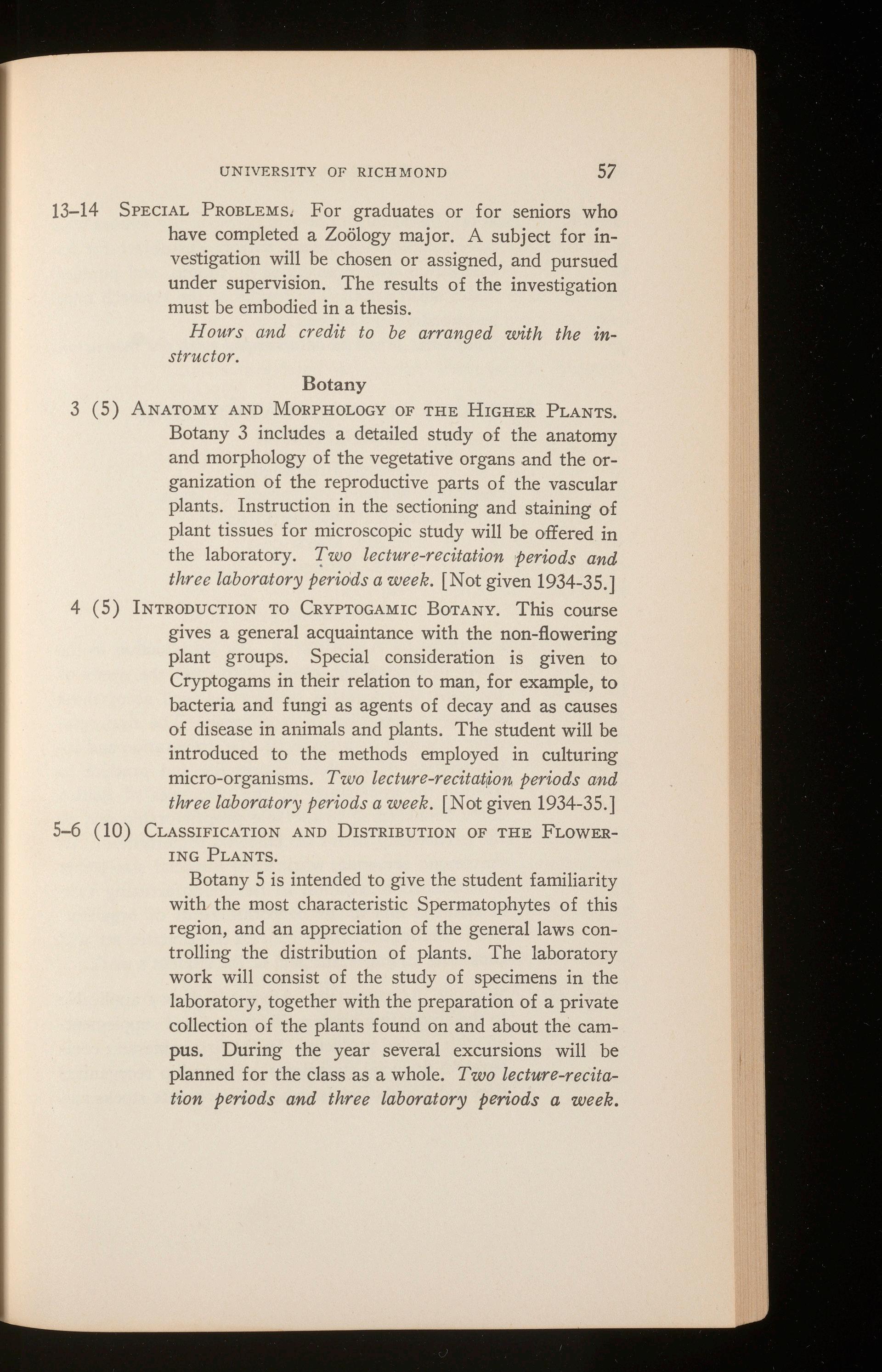
UNIVERSITYOF RICHMOND
13-14 SPECIAL PROBLEMS.For graduates or for seniors who have completed a Zoology major. A subject for investigation will be chosen or assigned, and pursued under supervision. The results of the investigation must be embodied in a thesis.
Hours and credit to be arranged with the instructor.
Botany
3 ( 5) ANATOMYAND MORPHOLOGYOF THE HIGHER PLANTS.
Botany 3 includes a detailed study of the anatomy and morphology of the vegetative organs and the organization of the reproductive parts of the vascular plants. Instruction in the sectioning and staining of plant tissues for microscopic study will be offered in the laboratory. '{wo lecture-recitation periods and three laboratory periods a week. [Not given 1934-35.]
4 ( 5) INTRODUCTIONTO CRYPTOGAMICBOTANY. This course gives a general acquaintance with the non-flowering plant groups. Special consideration is given to Cryptogams in their relation to man, for example, to bacteria and fungi as agents of decay and as causes of disease in animals and plants. The student will be introduced to the methods employed in culturing micro-organisms. Two lecture-recitat¢on.periods and three laboratory periods a week. [Not given 1934-35.]
5-6 (10) CLASSIFICATIONAND DISTRIBUTIONOF THE FLOWERING PLANTS.
Botany 5 is intended to give the student familiarity with the most characteristic Spermatophytes of this region, and an appreciation of the general laws controlling the distribution of plants. The laboratory work will consist of the study of specimens in the laboratory, together with the preparation of a private collection of the plants found on and about the campus. During the year several excursions will be planned for the class as a whole. Two lecture-recitation periods and three laboratory periods a week.
13-14
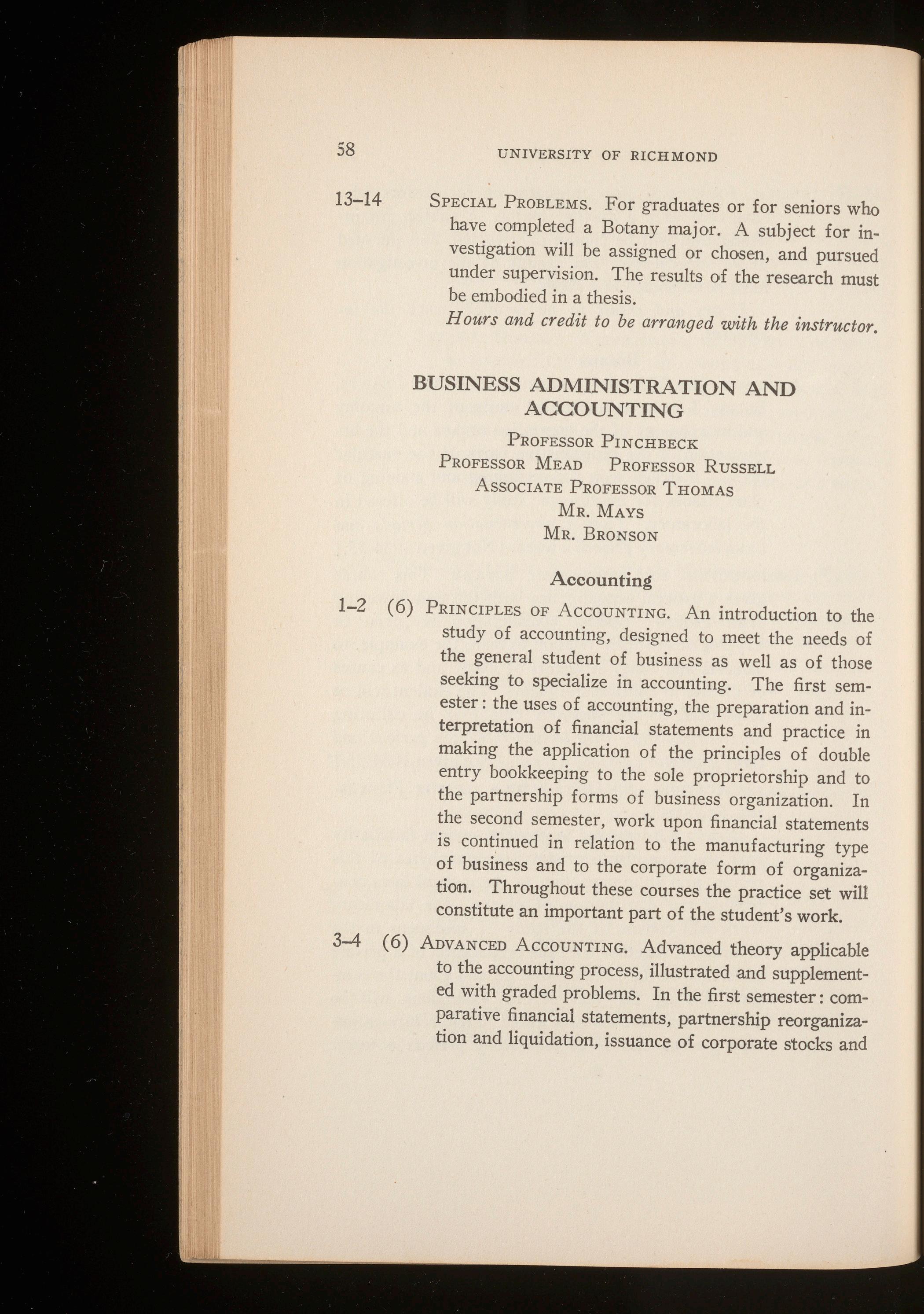
UNIVERSITYOF RICHMOND
SPECIALPROBLEMS.For graduates or for seniors who have completed a Botany major. A subject for investigation will be assigned or chosen, and pursued under supervision. The results of the research must be embodied in a thesis.
Hours and credit to be arranged with the instructor.
BUSINESS ADMINISTRATION AND ACCOUNTING
PROFESSORPINCHBECK
PROFESSORMEAD PROFESSORRUSSELL
ASSOCIATEPROFESSORTHOMAS
MR. MAYS
MR. BRONSON
Accounting
1-2 ( 6) PRINCIPLES OF AccoUNTING. An introduction to the study of accounting, designed to meet the needs of the general student of business as well as of those seeking to specialize in accounting. The first semester: the uses of accounting, the preparation and interpretation of financial statements and practice in making the application of the principles of double entry bookkeeping to the sole proprietorship and to the partnership forms of business organization. In the second semester, work upon financial statements is continued in relation to the manufacturing type of business and to the corporate form of organization. Throughout these courses the practice set will constitute an important part of the student's work.
3-4 (6) ADVANCEDAccouNTING. Advanced theory applicable to the accounting process, illustrated and supplemented with graded problems. In the first semester: comparative financial statements, partnership reorganization and liquidation, issuance of corporate stocks and

bonds, declaration of dividends, correction of statements and books, and statement of application of funds. The second semester is a continuation of the work of the first, with attention to causes of variation in net profits, accounting for insolvent concerns, fixed assets, appraisals, depletion, intangible assets, reserves, and consolidated statements. Prerequisite, Accounting 1-2.
5 ( 3) INTRODUCTORYCosT AccouNTING. A semester subject covering methods of finding the cost of specific orders, the accounting procedure necessary for connecting the cost records with the general books, with practice in the use of forms common in cost accounting. Practice set, problems and questions. Prerequisite, Accounting 1-2, Economics 1-2; also Accounting 3-4, except by permission of the Head of the Department.
6 (3) AUDITING. A study of the principles and practice of auditing, the text being supplemented with prC\hlem~ and questions applicable to the various classes of audits, but more especially to the balance sheet audit. Working papers and reports upon investigations are required ; attention is given to procedure in closing an audit and in the construction of an audit report. Prerequisite, same as for Accounting 5.
7 (3) ADVANCEDAccouNTING PROBLEMS.The course is designed to extend the work in general accountir:;! ,md as a review of advanced accounting theory. Although intended for those students only who are preparing to make accounting a vocation and who have completed 1-2-3-4, it is not offered as a C. P.A. coaching course, being limited to the field of general accounting theory and practice. Selected problems from published C. P. A. examinations will, however, be used to supplement the problems of the text. Prerequisite, average grade of Bin Accounting 3-4, or upon examination.

8 ( 3) AccouNTING FORFEDERALTAXES. A g,eneral course in Federal taxes in which emphasis is laid on the current law and the preparation of income tax returns for individuals, partnerships, corporations, and fiduciaries.. The course should be of special interest to those who plan to become public accountants. Prerequisites, Accounting 1-2, Economics 5-6. [Not offered in 1934-35.]
10 (3) GOVERNMENTALAccouNTING. Open only to students who have completed twelve hours in this department, including 1-2. The aim is to study the application of the principles of accounting to the county or to the small city. Typical entries for a fiscal period will be made in the practice set and appropriate reports will be drawn from the ledger.
THE AccoUNTING MAJOR-For a major in Accounting a student must offer twenty-four hours in this department.
Business Administration
1 (3) INDUSTRIALHISTORYOF THE UNITED STATES. A brief survey is made of the industrial development of Europe and England to the period of American colonization. This is followed by a study of the growth of American industries up to 1860.
2 (3) INDUSTRIALHISTORYOF THE UNITED STATES. A continuation of the above course. A study of the industries of the United States from 1860 to the present time.
Business Administration 1-2 is open to all students in Richmond College. A course for all Freshmen who intend to major in Business Administration.
3-4 ( 6) BUSINESS LAw. The first semester will include the study of contracts, sales, agency, negotiable instruments and insurance. During the second semester partnerships, corporations, property, wills, etc., will
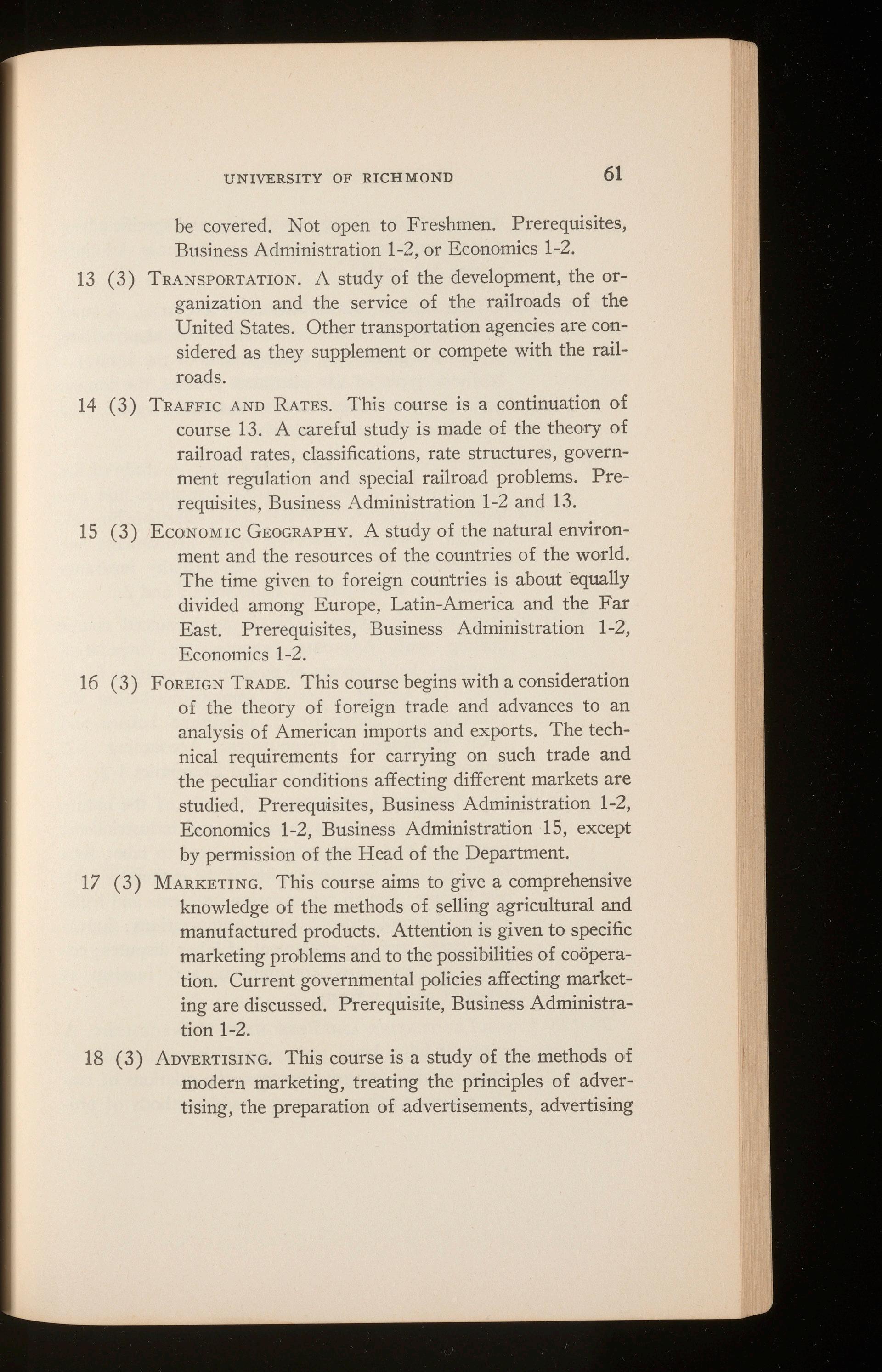
be covered. Not open to Freshmen. Prerequisites, Business Administration 1-2, or Economics 1-2.
13 (3) TRANSPORTATION. A study of the development, the organization and the service of the railroads of the United States. Other transportation agencies are considered as they supplement or compete with the railroads.
14 (3) TRAFFICAND RATES. This course is a continuation of course 13. A careful study is made of the theory of railroad rates, classifications, rate structures, government regulation and special railroad problems. Prerequisites, Business Administration 1-2 and 13.
15 (3) EcoNOMICGEOGRAPHY.A study of the natural environment and the resources of the countries of the world. The time given to foreign countries is about equally divided among Europe, Latin-America and the Far East. Prerequisites, Business Administration 1-2, Economics 1-2.
16 (3) FOREIGNTRADE.This course begins with a consideration of the theory of foreign trade and advances to an analysis of American imports and exports. The technical requirements for carrying on such trade and the peculiar conditions affecting different markets are studied. Prerequisites, Business Administration 1-2, Economics 1-2, Business Administration 15, except by permission of the Head of the Department.
17 (3) MARKETING.This course aims to give a comprehensive knowledge of the methods of selling agricultural and manufactured products. Attention is gjven to specific marketing problems and to the possibilities of cooperation. Current governmental policies affecting marketing are discussed. Prerequisite, Business Administration 1-2.
18 (3) ADVERTISING.This course is a study of the methods of modern marketing, treating the principles of advertising, the preparation of advertisements, advertising

media, the advertising organization and specific advertising campaigns. Prerequisites, Business Administration 1-2 and 17.
21 ( 3) LIFE INSURANCEPlnNCIPLESANDPRACTICES.A study of the uses of insurance, its fundamental principles, types of organization, management of the insurance business, types of life insurance policies, the computation of premiums, reserves, surrender values, loan values, surplus and dividends.
22 (3) PROPERTYANDCASUALTYINSURANCES.A study of fire and property insurance, marine insurance, and casualty insurance, the contracts, laws, salesmanship, settlement of claims, reserves, rates, investments and management of fire, marine and casualty insurance businesses. Prerequisites, Economics 1 and 2.
23-24 (6) CORPORATIONFINANCE. This is an advanced course dealing with corporate organization, corporation securities, legal aspects of modem corporation finan• cing. The second semester: security marketing, the functions of underwriting, brokerage houses and stock exchanges. Prerequisites: Accounting 1-2, Business Administration 3-4 and Economics 1-2.
27 (3) SocIAL ASPECTSOF INDUSTRY.A study of the nature and history of modern capitalism and industrialism; population and immigration as related to labor supply ; wages and the distribution of the national wealth and income; human conservation problems and legislation ; unemployment ; labor organizations ; industrial strife, and the settlement of labor disputes; cooperation, socialism, communism, and fascism as types of social reform.
28 (3) LABORLEGISLATIONANDPERSONNELMANAGEMENT.A study of labor laws, and court decisions thereon, of State and Federal governments; the relations of employer and employee; agencies and methods of pro·

moting industrial peace; personnel systems for the organization and management of labor.
29 (3) OWNERSHIP ORGANIZATIONAND MANAGEMENT. A study of capital as the foundation of ownership organization ; the single proprietor; the partnership; security-issuing organizations, including the joint stock company, the corporation, and the business trust; business combinations through associations, factors' agreements, pools, kartels and syndicates ; investment trusts; finance and assumption companies ; abuses and their remedies.
30 (3) OPERATING ORGANIZATIONAND MANAGEMENT. A study of the internal organization of manufacturing companies, from a production viewpoint, including plant layout, construction, the planning of departments, routing of work through the plant, control and regularization of output, sales management, personnel relations. Prerequisites, Economics 1 and 2.
MAJOR.-The requirement for a major in Business Administration is twelve hours in the department and Economics 1-2 and Accounting 1-2.
CHEMISTRY
PROFESSORRYLAND
PROFESSORCORNTHWAITE
Courses 1, 2, 3, 4, 5, 6, 11, 12 are required for a major in Chemistry.
1 (5) GENERALCHEMISTRY.An introduction to the phenomena, methods, principles, history and applications of the science of Chemistry. Prerequisite, high school Physics or Physics 1. Three class hours and two laboratory periods.
2 (5) GENERALCHEMISTRY. A continuation of course 1 with emphasis on the fundamental theories. Three class hours a11dtwo laboratory periods.

3 (5) QUALITATIVE ANALYSIS. Systematic laboratory procedure based on the study of modern theories of analytical methods. Two class hours and three laboratory periods.
4 (3) or (5) QUANTITATIVEANALYSIS.The elementary principles of gravimetric and volumetric analysis and the solution of problems. One class hour and two or four laboratory periods.
5 ( 5) ORGANIC CHEMISTRY. An introduction to the study of the hydrocarbons and their substituted derivatives covering the aliphatic series, with emphasis on biochemical and synthetic applications. Three class hours and two laboratory periods.
6 (5) ORGANIC CHEMISTRY. The cyclic compounds. A continuation of Chemistry 5, covering the important reactions and applications of compounds in the aromatic series. Three class hours and two laboratory periods.
7 (3) or (5) TECHNICALANALYSIS. Select and commercial methods. One class hour and two or four l'aboratory periods.
8 (5) PHYSICAL CHEMISTRY. An introduction to physicochemical properties, generalizations and theories. Three class hours and two laboratory periods.
9 (2) PHYSICAL CHEMISTRY. A continuation of the laboratory work of Chemistry 8 dealing with more difficult physico-chemical measurements. Two laboratory periods.
11-12 (2) HISTORYOF CHEMISTRY. A survey of the development of the science and of its literature. One class hour.
13 (2) INORGANICPREPARATIONS.Methods of preparing pure inorganic substances. The preparation and study of several examples to illustrate the various classes and to develop technique. Two laboratory periods.

14 (1) CHEMICALBIBLIOGRAPHY,How to use a chemical library. Instruction in the character of the various reference books, dictionaries, and sources of chemical information. One class hour.
For Graduate Students
15 (3) ORGANICPREPARATIONS.Preparation of the more difficult organic compounds. Emphasis placed on yield and purity of products. Three laboratory periods.
16 (2) ORGANIC ANALYSIS. The qualitative separation and identification of organic compounds. Two laboratory periods.
17 (3) ORGANIC CHEMISTRY SEMINAR. Lectures, assigned readings, and reports. Topic for 1934-35: Synthetic Medicinals. Three class hours.
20 RESEARCHIN CHEMISTRY. Hours and credit to be arranged.
ECONOMICS
PROFESSORCORSON ASSOCIATEPROFESSORTHOMAS
Requirements for major: Twenty-four semester hours of work in Economics, including Economics 1-2 and 11-12. Mathematics 3-4 is recommended for majors planning to pursue graduate work in Economics.
1 (3) PRINCIPLES OF EcoNOMICS. This course is designed to acquaint the student with the fundamental economic principles and problems which characterize the structure and functioning of the present economic system. The course opens with a description of the science of economics and the historical background of economic institutions and ideas. It proceeds with an analysis of value and to the consideration of the economic characteristics of government, of business organization, of price determination, money, banking and foreign exchange.

2 (3) EcoNOMICPROBLEMS.This course is concerned with the fundamental principles underlying economic distribution and consumption. It includes a survey of the economic characteristics of public utilities, transportation, public finance, social insurance, and proposals for economic reform. Outstanding current problems which have an economic significance are analyzed in order to determine their meaning in the light of economic principles and modern trends in economic thoug ,ht.
(Economics 1-2 is not open to first-year students, except upon permission of the head of this department. This course is a prerequisite of all other courses offered in Economics.)
3 (3) MONEY. This course deals with the history of exchange and the evolution of money. Especial attention is given to a study of various monetary standards , and particularly that of the United States. The principles of note issue, the value of money, the business cycle, the desirability of the control of credit, and foreign exchange are some of the problems discussed.
4 ( 3) BANKING. A course on the history of banking in the United States, with emphasis upon the national banking and the Federal Reserve systems. Among the problems considered are deposits, the collection of checks, primary and secondary reserves, loans and discounts, the bank statement, recent banking changes, and international banking relations.
5 (3) FINANCIALORGANIZATIONOF GovERNMENT.A cour se dealing with the organization and framework of the national, State and local governments. A survey is made of the history of government finance, the increase in public expenditures, and certain sources of public revenues.
6 ( 3) CURRENTTAX PROBLEMS.This course is devoted to the study of various types of taxes such as property taxes,
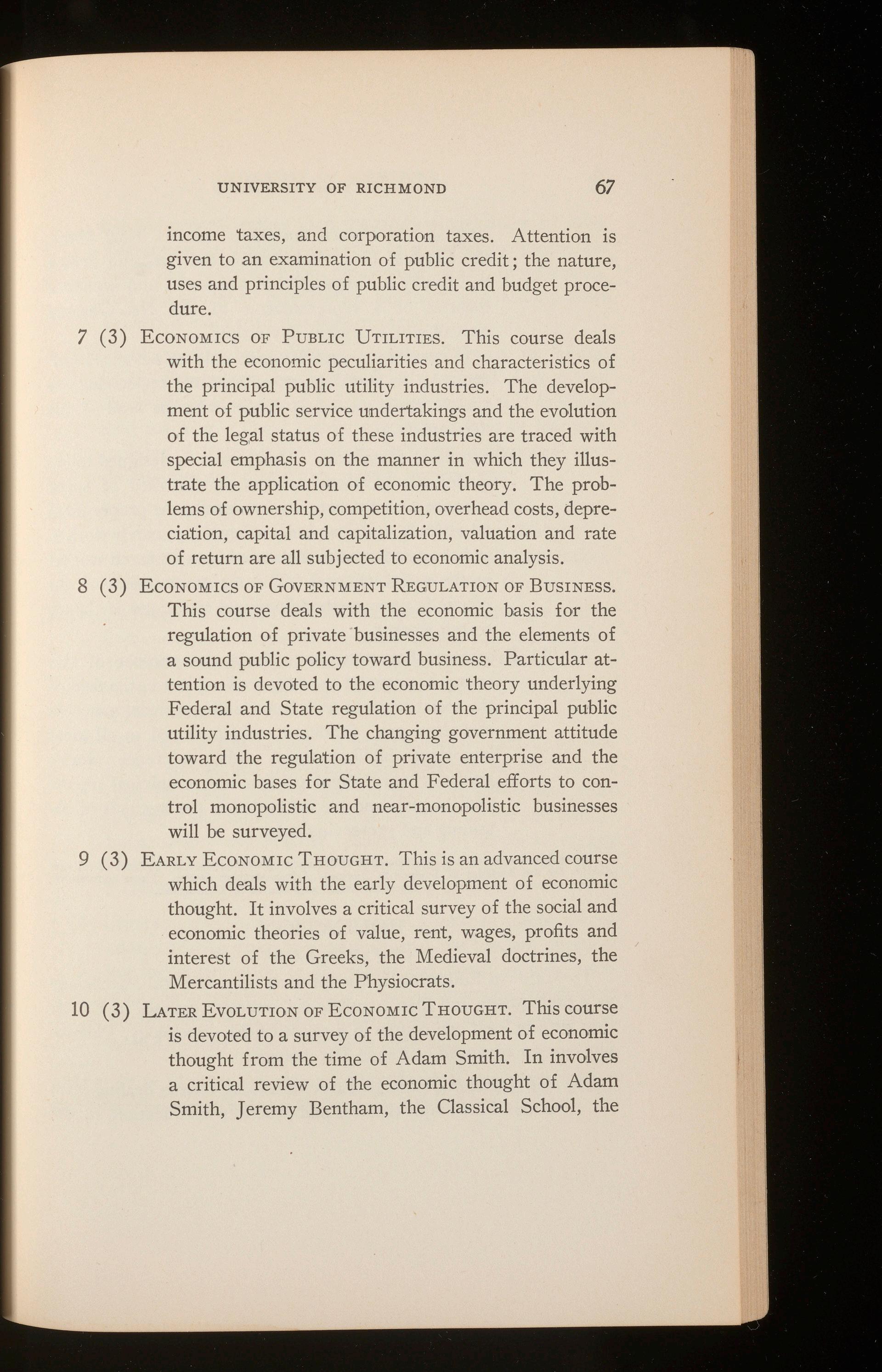
income taxes, and corporation taxes. Attention is given to an examination of public credit; the nature, uses and principles of public credit and budget procedure.
7 (3) EcoNOMICS OF PUBLIC UTILITIES. This course deals with the economic peculiarities and characteristics of the principal public utility industries. The development of public service undertakings and the evolution of the leg,al status of these industries are traced with special emphasis on the manner in which they illustrate the application of economic theory. The problems of ownership, competition, overhead costs, depreciation, capital and capitalization, valuation and rate of return are all subjected to economic analysis.
8 (3) ECONOMICSOFGOVERNMENTREGULATIONOFBUSINESS. This course deals with the economic basis for the regulation of private businesses and the elements of a sound public policy toward business. Particular attention is devoted to the economic theory underlying Federal and State regulation of the principal public utility industries. The changing government attitude toward the regulation of private enterprise and the economic bases for State and Federal efforts to control monopolistic and near-monopolistic businesses will be surveyed.
9 (3) EARLYECONOMICTHOUGHT. This is an advanced course which deals with the early development of economic thought. It involves a critical survey of the social and economic theories of value, rent, wages, profits and interest of the Greeks, the Medieval doctrines, the Mercantilists and the Physiocrats.
10 (3) LATEREvoLUTIONOFEcoNOMICTHOUGHT. This course is devoted to a survey of the development of economic thought from the time of Adam Smith. In involves a critical review of the economic thought of Adam Smith, Jeremy Bentham, the Classical School, the
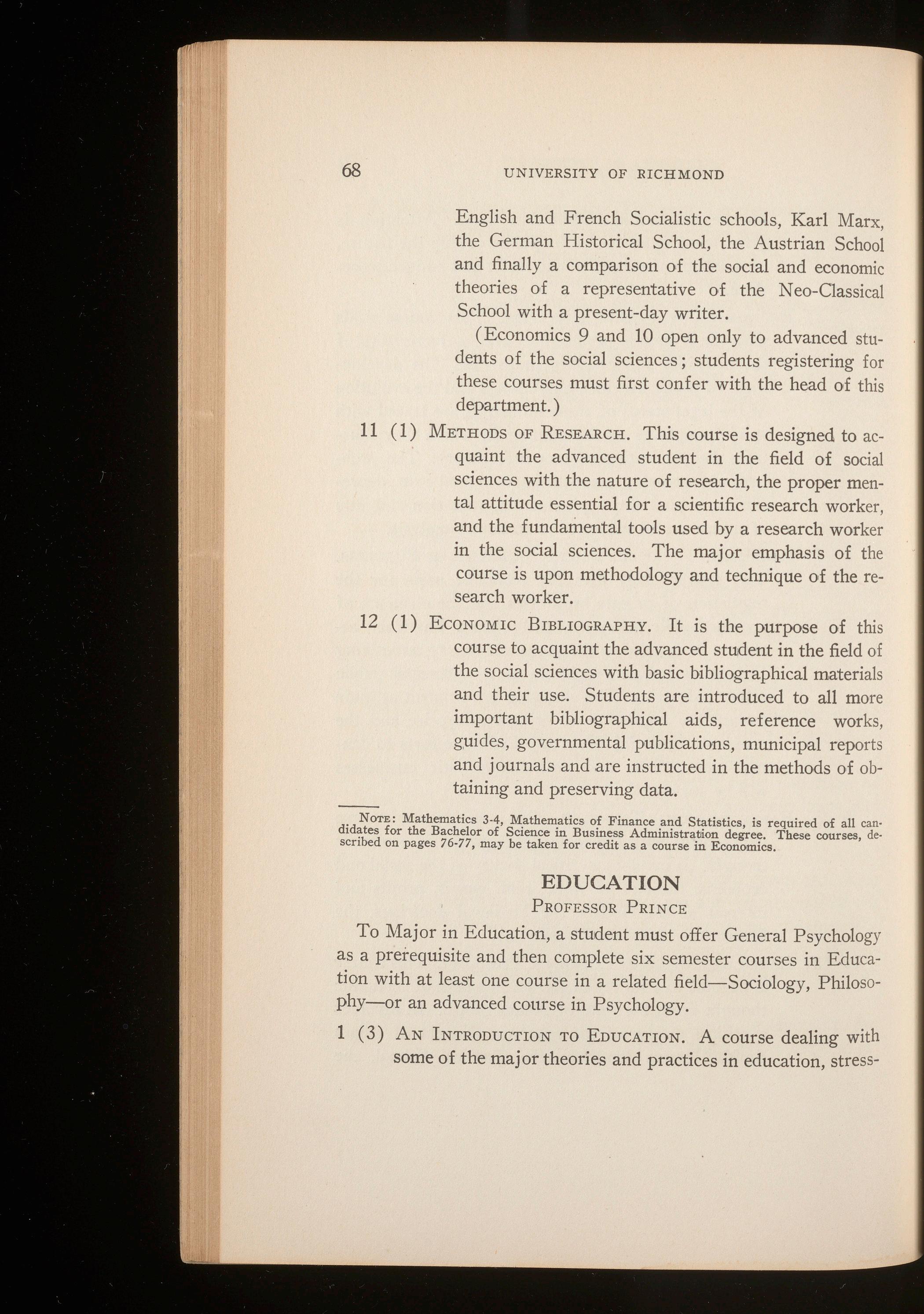
UNIVERSITYOF RICHMOND
English and French Socialistic schools, Karl Marx , the German Historical School, the Austrian School and finally a comparison of the social and economic theories of a representative of the Neo-Oassical School with a present-day writer.
(Economics 9 and 10 open only to advanced students of the social sciences ; students registering for these courses must first confer with the head of this department.)
11 ( 1) METHODSOF RESEARCH.This course is designed to acquaint the advanced student in the field of social sciences with the nature of research, the proper mental attitude essential for a scientific research worker, and the fundamental tools used by a research worker in the social sciences. The major emphasis of the course is upon methodology and technique of the research worker.
12 (1) ECONOMICBIBLIOGRAPHY.It is the purpose of this course to acquaint the advanced student in the field of the social sciences with basic bibliographical materials and their use. Students are introduced to all more important bibliographical aids, reference works, guides, governmental publications, municipal reports and journals and are instructed in the methods of obtaining and preserving data.
NOTE: Mathematics 3-4, Mathematics of Finance and Statistics, is required of all can• didates for the Bachelor of Science in Business Administration degree. These courses, de- scribed on pages 76-77, may be taken for credit as a course in Economics.
EDUCATION PROFESSORPRINCE
To Major in Education, a student must offer General Psychology as a prerequisite and then complete six semester courses in Education with at least one course in a related field-Sociology, Philos ophy-or an advanced course in Psychology.
1 ( 3) AN INTRODUCTIONTO EDUCATION.A course dealing with some of the major theories and practices in education, stress-

ing the general rather than the professional point of view. The course is designed to serve as a beginning course for those just entering upon professional study in education, and as a course of information for those who desire a more general contact with this field of study.
2 ( 3) EDUCATIONALPSYCHOLOGY.A general course of Educational Psychology, dealing with the origmal nature and development of children, and the major factors that facilitate their learning. These factors will include laws of learning, transfer of training, motivation, individual differences, special abilities and disabilities, mental hygiene, etc.
3 ( 3) PRINCIPLESOF SECONDARYEDUCATION. A course presenting the major principles underlying a sound philosophy of secondary education. These principles include population, organization, aims, functions, social outcomes, etc'.
4 (3) METHODSIN SECONDARYEDUCATION. A course presenting a characteristic range of the most effective group and individual methods appropriate for educational activities on the secondary level, including their relationships, values and applications.
5 ( 3) HISTORYOF EDUCATION.A general course pointing out the larger educational movements and theories of the past in their historical settings, and tracing their subsequent relationships and influences to their bearings on present educational theory and practice. Emphasis will be placed on the hi story of education in the United States. [Not offered in 1934-35.]
6 ( 3) EDUCATIONALADMINISTRATION.A course of public school administration from the standpoint of the teacher, portraying the organization of the major functional units in such a way as to enable the teacher to adjust himself in his various relationships with greater understanding and higher ethical considerations. [Not offered in 1934-35.]
NOTE: Course 1-2 will be given each year; 3-4 and 5-6 will be given alternate years . NOTE: Human Physiology which meets the requirements of the "West Law" for Vir• ginia Public School teachers is given in the Department of Biology, Zoology 12.
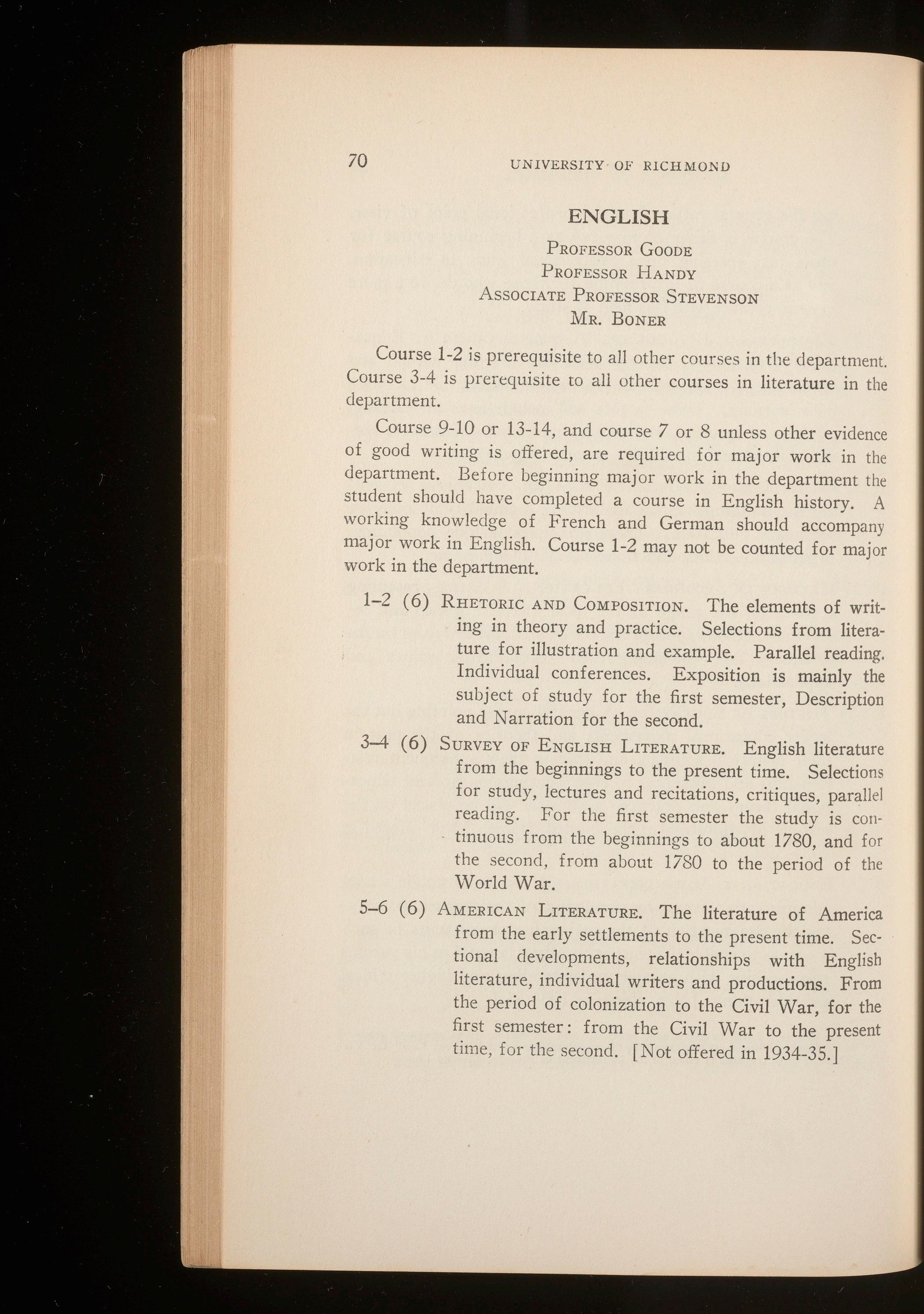
UNIVERSITYOF RICHMOND
ENGLISH
PROFESSORGOODE
PROFESSORHANDY
ASSOCIATEPROFESSORSTEVENSON
MR. BONER
Course 1-2 is prerequisite to all other courses in the department. Course 3-4 is prerequisite to all other courses in literature in the department.
Course 9-10 or 13-14, and course 7 or 8 unless other evidence of good writing is offered, are required for major work in the department. Before beginning major work in the department the student should have completed a course in English history. A working knowledge of French and German should accompany major work in English. Course 1-2 may not be counted for major work in the department.
1-2 (6) RHETORIC AND COMPOSITION. The elements of writing in theory and practice. Selections from literature for illustration and example. Parallel reading. Individual conferences. Exposition is mainly the subject of study for the first semester, Description and Narration for the second.
3-4 (6) SURVEYOF ENGLISH LITERATURE. English literature from the beginnings to the present time. Selections for study, lectures and recitations, critiques, parallel reading. For the first semester the study is continuous from the beginnings to about 1780, and for the second, from about 1780 to the period of the \Vorld War.
5-6 (6) AMERICAN LITERATURE. The literature of America from the early settlements to the present time. Sectional developments, relationships with English literature, individual writers and productions. From the period of colonization to the Civil War, for the first semester: from the Civil War to the present time, for the second. [Not offered in 1934-35.]

7 (3) ADVANCEDCOMPOSITION-THE SHORT STORY. The tedmique of the Short Story, exercises in the elements of the type, complete short stories. Class instruction, copious reading, individual conferences.
8 (3) ADVANCEDCOMPOSITION-CREATIVEWRITING. Instruction and criticism for students who wish to write for publication. Several genres are carefully analyzed. Reading in current periodical literature, individual conferences. This course may be repeated, with full credit.
9-10 (6) OLD ENGLISH. Anglo-Saxon grammar and phonology, with readings in West Saxon prose, for the first semester: systematic reading and study of Beowulf, for the second semester. Recommended for Seniors and Graduates.
11 (3) ENGLISH DRAMA. The development of English drama from the beginnings, through the early types, to Shakespeare and his contemporaries, and the decline to the closing of the theaters in 1642. Lectures, wide reading, reports. [Not offered in 1934-35.]
12 (3) ENGLISH DRAMA. English drama from 1660 to the present time, with emphasis on the Restoration, Victorian, and Modern periods. Lectures, wide reading, reports. [Not offered in 1934-35.]
13-14 (6) CHAUCER. Introductory study in the pronunciation, language, and meter of Chaucer. Close reading of some of the Canterbury Tales, from the linguistic standpoint primarily, for the first semester: appreciative reading of other works of Chaucer, and of the period, for the second semester. Recommended for Seniors and Graduates. [Not offered in 1934-35.]
15-16 (6) SHAKESPEARE. Intensive study of a few plays, for the first semester: comprehensive reading and study of others, for the second semester. Emphasis mainly upon linguistic and literary elements. Lectures and

UNIVERSITYOF RICHMOND
recitations. This course includes, in one year, about half the works of Shakespeare. In alternate years a different set of plays and other works of the author are given. The course, therefore, may be repeated, with full credit.
17 ( 3) THE CLASSICALREGIME. English literature from the Restoration to the Tattler and Spee tator papersdrama, satire, journalistic prose, etc., with individual studies in Milton, Bunyan, Dryden, Evelyn and Pepys, Defoe, and Steele and Addison. Lectures, extensive reading, critiques.
18 ( 3) THE CLASSICALREGIME. The classical tradition from the appearance of Pope to the death of Johnson. Lectures, extensive reading, critiques.
19 (3) THE ROMANTICMOVEMENT.English poetry approximately from 1780 to 1825. Studies in Wordsworth, Coleridge, Byron, Shelley, and Keats, with some attention to such as Cowper, Burns, and Scott. Reports on the minor poets of the time. Lectures and class discussions.
20 (3) VICTORIANPOETRY. Studies in the poetry of Arnold, Tennyson, Browning, Rossetti, Morris, and Swinburne, with some notice of Mrs. Browning, Fitzgerald, James Thomson, and Miss Rossetti. Reports on the minor poets of the period. Lectures and class discussions.
21-22 (6) THE ENGLISHNovEL. A rapid survey of prose fiction in England before the novel proper. The great novelists and types of the novel from Defoe to Conrad. Lectures, wide reading, class papers. The first semester is devoted to a study of the novel before the appearance of Scott, and the second semester to a similar study from Scott to Conrad.
Graduate courses will be arranged to suit the needs of the individual student. See de• scription of graduate work, page 108.
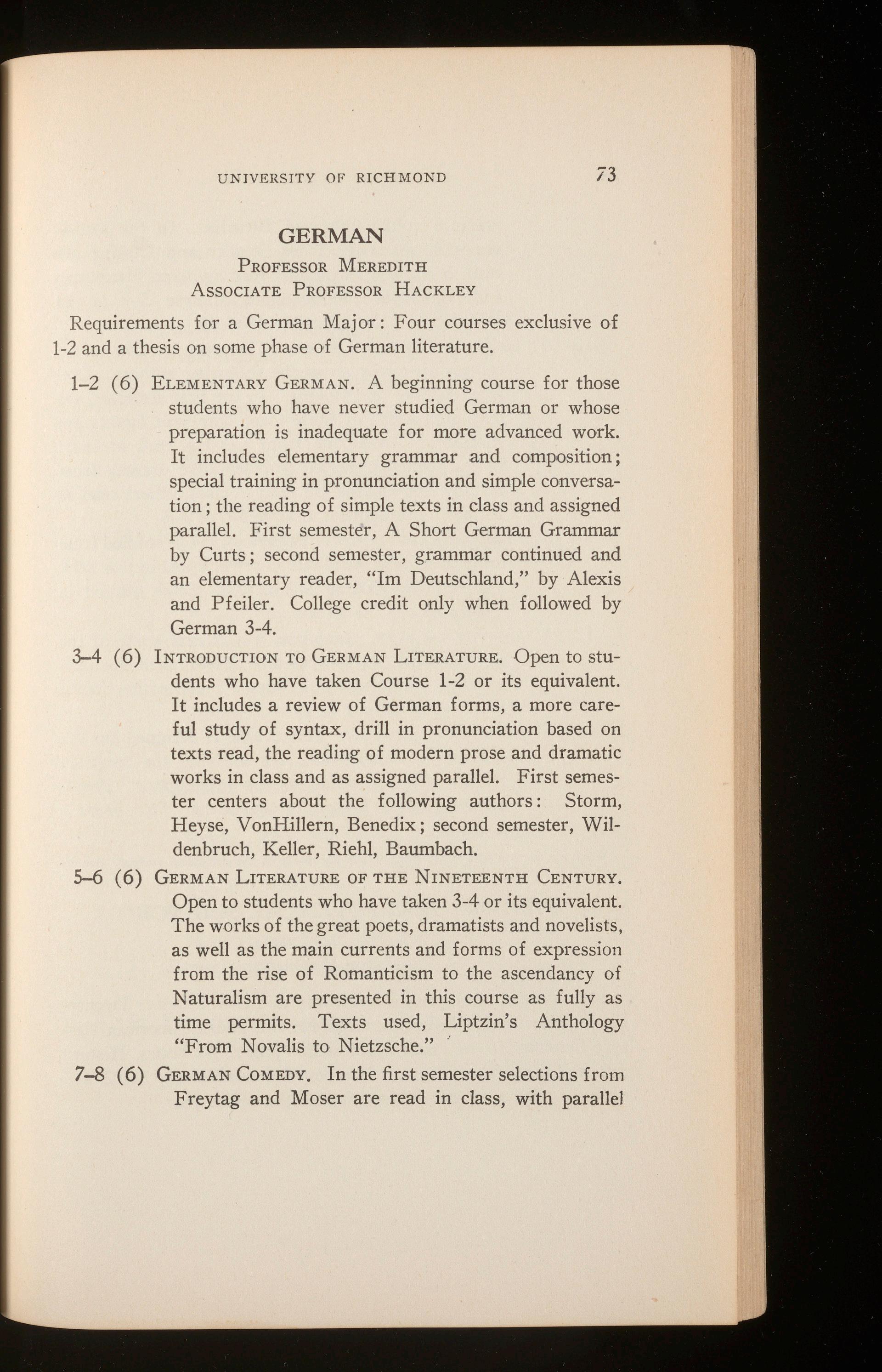
UNIVERSITYor RICHMOND
GERMAN
PROFESSORMEREDITH
AssocIA TE PROFESSORHACKLEY
Requirements for a German Major: Four courses exclusive of 1-2 and a thesis on some phase of German literature.
1-2 (6) ELEMENTARYGERMAN. A beginning course for those students who have never studied German or whose preparation is inadequate for more advanced work. It includes elementary grammar and composition; special training in pronunciation and simple conversation ; the reading of simple texts in class and assigned parallel. First semester, A Short German Grammar by Curts ; second semester, grammar continued and an elementary reader, "Im Deutschland," by Alexis and Pfeiler. College credit only when followed by German 3-4.
3-4 (6) INTRODUCTIONTO GERMANLITERATUREOpen to students who have taken Course 1-2 or its equivalent. It includes a review of German forms, a more careful study of syntax, drill in pronunciation based on texts read, the reading of modern prose and dramatic works in class and as assigned parallel. First semester centers about the following authors : Storm, Heyse, VonHillern, Benedix; second semester, Wildenbruch, Keller, Riehl, Baumbach.
5-6 (6) GERMANLITERATUREOFTHE NINETEENTHCENTURY. Open to students who have taken 3-4 or its equivalent. The works of the great poets, dramatists and novelists, as well as the main currents and forms of expression from the rise of Romanticism to the ascendancy of Naturalism are presented in this course as fully as time permits. Texts used, Liptzin's Anthology "From N ovalis to Nietzsche." ·
7-8 (6) GERMANCOMEDY. In the first semester selections from Freytag and Moser are read in class, with parallel

UNIVERSITYOF RICHMOND
reading from Fulda and Benedix. In the second semester, selections from Schiller and Lessing are read in class , with parallel reading from Hauptman and Wilhelmi. Prerequisite, Course 3-4 or its equivalent. [Not offered in 1934-35.]
9-10 (6) GERMAN SERIOUSDRAMA. The work of this course centers especially about the following authors: Lessing , Schiller and Goethe. In the first semester, the lives and works of these three dominant figures are studied and selections from Lessing read in class. In the second semester representative dramas from Schiller and Goethe are read in class, others read as parallel. Prerequisite, Course 5-6 or 7-8
11 ( 3) GERMANLYRICPOETRY.Selections will be studied from those poets who stand out as pre-eminent in this field. Prerequisite, Course 5-6 or 7-8. [Not offered in 1934-35.]
12 (3) GoETHE's FAUST. Analytical and critical study of the whole drama, its sources and development are outstanding features of this course. Prerequisite, Course 9-10. [Not offered in 1934-35 ]
13-14 ( 4) SCIENTIFICGERMAN. This course is designed for the students of science who are studying the language for its practical value to the investigator. Prerequisite, Course 3-4 or its equivalent. Two hours a week.
Graduate courses will be arranged to suit the needs of the individual student. See de • scr ipti on of gr a duate work, pa ge 108
HISTORY AND POLITICAL SCIENCE
PROFESSORMITCHELL
PROFESSORMcDANEL
Requirements for a major in History and Government: Twentysix semester hours, following required: two hours, American History Seminar ( to be taken in the senior year) ; six hours, History 5-6; and three hours from Government 5-6 and History 11-12. An essay in original research is required in the senior year.

Government
1 (3) AMERICAN GOVERNMENTwill be discussed, National, State and Local, both in theory and practice. For Sophomores and Juniors.
2 (3) MODERN GOVERNMENTSOF EUROPE. For Sophomores and Juniors.
3 (3) INTERNATIONALRELATIONS. An effort will be made to articulate important happenings of the day with the course of study. Special attention will be given to such agencies as the League of Nations and Permanent Court of International Justice. For Sophomores and Juniors.
4 ( 3) RECENT POLITICAL THOUGHT. For Sophomores and Juniors.
5 (3) INTERNATIONALLAW. The publiclaw of nations studied through text and cases. For Juniors and Seniors.
6 (3) AMERICAN DIPLOMATICHISTORY. This will include a detailed study of American foreign relations, from the Revolution to the present time. For Juniors and Seniors.
History
1 (3) GENERALEUROPEANHISTORY. Civilization in the Middle Ages will be studied as fully as time permits, but special stress will be laid upon the period from the Reformation to the French Revolution. For Freshmen and Sophomores.
2 ( 3) RECENT AND CONTEMPORARYEUROPEANHISTORYwill be surveyed. For Freshmen and Sophomores.
3 ( 3) HISTORYOF ENGLANDwill be studied, up to the Congress of Vienna in 1815. For Juniors ·and Seniors.
4 (3) THE BRITISH COMMONWEALTHOF NATIONS will be viewed in its various aspects. For Juniors and Seniors.
5 ( 3) AMERICAN HISTORY from its beginning through the Civil War. The treatment of the Colonial period will

UNIVERSITYOF RICHMOND
be brief, with more attention paid to the political and social development after the Revolution. For Sophomores and Juniors.
6 (3) AMERICAN HISTORY from the Civil War to the present time will be studied in detail. For Sophomores and Juniors.
11 ( 3) THE FAR EAST. A course in the modern history of China, Japan and the Pacific area. For Juniors and Seniors.
12 (3) LATIN-AMERICAN HISTORY. The republics of LatinAmerica will be studied, with special attention being given to their political history and international relations and to their relations with the United States.
Graduate courses will be arranged to suit the needs of the individual student. See de- scription of graduate work, page 108.
MATHEMATICS
PROFESSORGAINES
ASSOCIATEPROFESSORWHEELER
For a major in Mathematics a student must offer twenty-four semester hours in approved courses in the department, and in addition must take Course 14.
1 ( 3) COLLEGEALGEBRA.This course includes quadratic equations, theory of equations, determinants, progressions, permutations, combinations, and probability.
2 (3) MATHEMATICALANALYSIS. An elementary course including functions and graphs, rate problems, simple differentiation and integration, logarithms, trigonometry, and rectangular coordinates.
3 (3) MATHEMATICSOF FINANCE. Theory of interest and discount; annuities, amortization, sinking funds, bond valuation, depreciation, and life insurance. Prerequisite, 1-2.
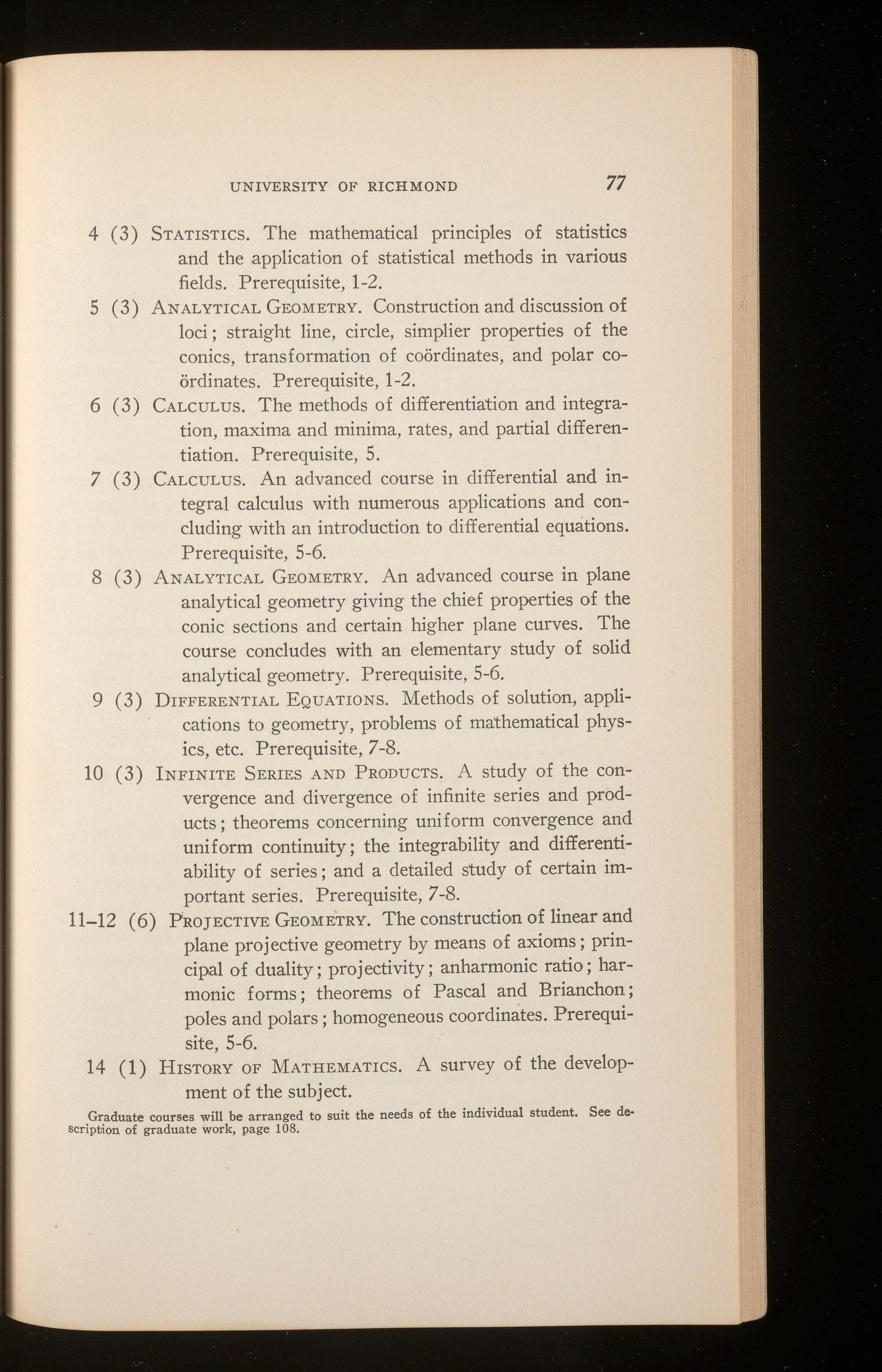
4 ( 3) STATISTICS.The mathematical principles of statistics and the application of statistical methods in various fields. Prerequisite, 1-2.
5 (3) ANALYTICALGEOMETRY.Construction and discussion of loci ; straight line, circle, simplier properties of the conics, transformation of coordinates, and polar coordinates. Prerequisite, 1-2.
6 ( 3) CALCULus. The methods of differentiation and integration, maxima and minima, rates, and partial differentiation. Prerequisite, 5.
7 (3) CALCULUS.An advanced course in differential and integral calculus with numerous applications and concluding with an introduction to differential equations. Prerequisite, 5-6.
8 (3) ANALYTICALGEOMETRY.An advanced course in plane analytical geometry giving the chief properties of the conic sections and certain higher plane curves. The course concludes with an elementary study of solid analytical geometry. Prerequisite, 5-6.
9 (3) DIFFERENTIALEQUATIONS.Methods of solution, applications to geometry, problems of mathematical physics, etc. Prerequisite, 7-8.
10 ( 3) INFINITE SERIES AND PRODUCTS.A study of the convergence and divergence of infinite series and products; theorems concerning uniform convergence and uniform continuity; the integrability and differentiability of series; and a detailed study of certain important series. Prerequisite, 7-8.
11-12 (6) PROJECTIVEGEOMETRY.The construction of linear and plane projective geometry by means of axioms; principal of duality; projectivity; anharmonic ratio; harmonic forms ; theorems of Pascal and Brianchon; poles and polars ; homogeneous coordinates. Prerequisite, 5-6.
14 (1) HISTORYOF MATHEMATICS.A survey of the development of the subject.
Graduate courses will be arranged to suit the needs of the individual student. See description of graduate work, page 108.

UNIVERSITYOF RICHMOND
PHILOSOPHY
PROFESSORHOLTZCLAW
Requirements for Majors: 24 semester hours in Philosophy; or, with the consent of the Head of the Department, 18 hours in Philosophy and 6 hours in a closely related field in Education, Psychology or Sociology. An essay embodying the results of some special line of investigation in Philosophy will be required of all majors in their senior year.
1 ( 3) INTRODUCTIONTO PHILOSOPHY. A general survey of the field of philosophy, its aims, methods and meaning; a study of the various types of metaphysical theory; and an introduction to the major problems of philosophy, such as the nature of matter, life and mind; the existence of God; the relation of mind and body; freedom and determinism; and the status of values in the cosmos.
2 ( 3) ETHICS. A study of the development of moral conceptions, an examination of the different types of ethical theory, and an attempt to determine the valid principles of right conduct.
3 (3) HISTORYOF ANCIENT AND MEDIEVALPHILOSOPHY. This course offers a survey of the doctrines of the great thinkers of classical antiquity and of the middle ages, with especial emphasis on the teachings of Plato and Aristotle and a study of selections from their writings.
4 (3) HISTORYOF MODERNPHILOSOPHY. A study of the development of European philosophy since the Renaissance; the philosophy of Descartes and the rationalistic movement on the continent; English empiricism; the system of Kant and the German idealistic movement; Schopenhauer and Spencer.
5 ( 3) PHILOSOPHYOFRELIGION. This course includes a brief survey of comparative religion and the psychology of the religious experience, and seeks to determine the validity of fundamental religious ideas, examining such questions as the existence and nature of God, His relation to the world, the problem of evil, human freedom, salvation and immortality. [Not given in 1934-35.]
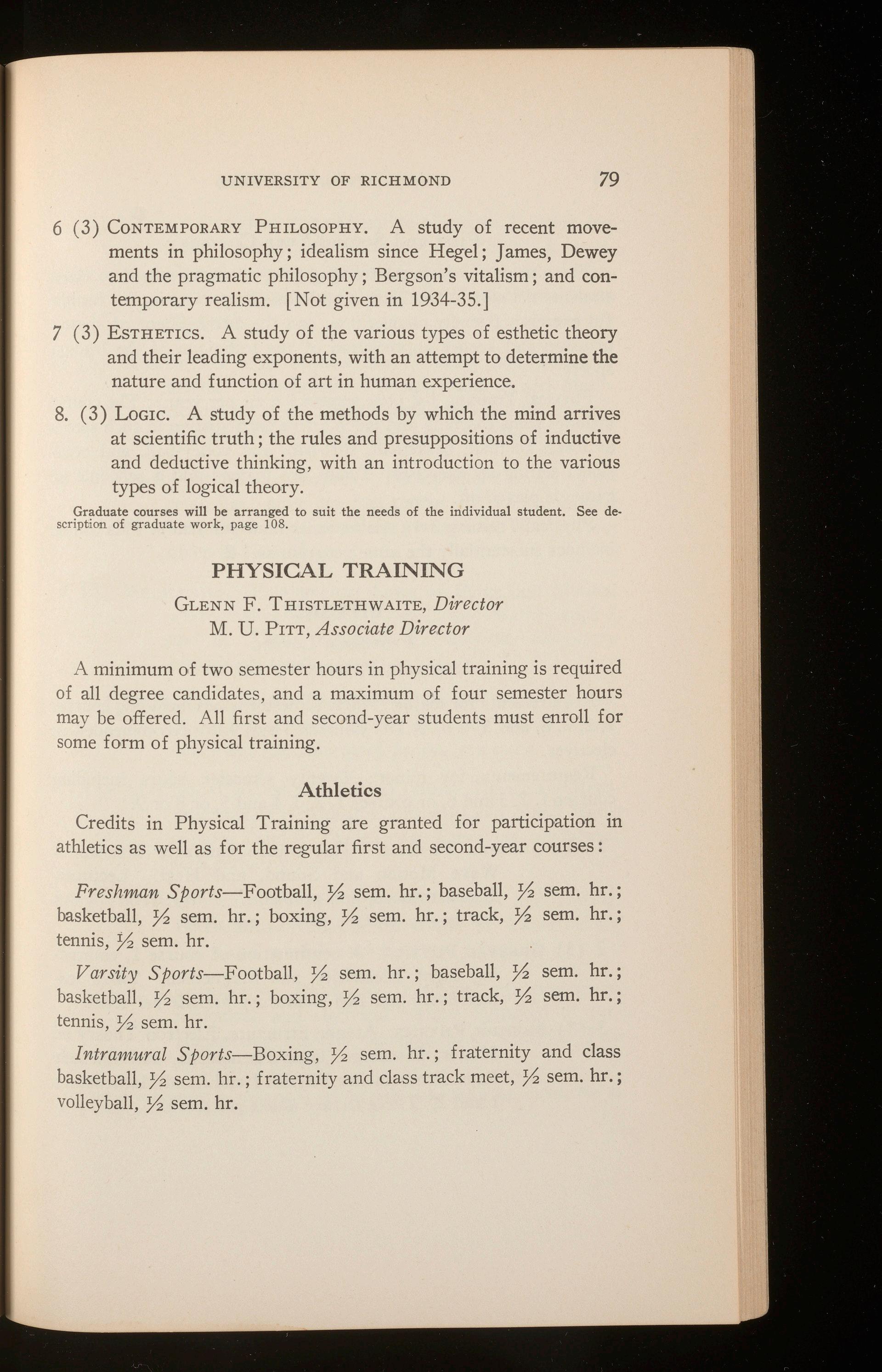
6 (3) CONTEMPORARYPHILOSOPHY. A study of recent movements in philosophy; idealism since Hegel; James, Dewey and the pragmatic philosophy; Bergson's vitalism; and contemporary realism. [Not given in 1934-35.]
7 (3) EsTHETICS. A study of the various types of esthetic theory and their leading exponents, with an attempt to determine the nature and function of art in human experience.
8. ( 3) LOGIC. A study of the methods by which the mind arrives at scientific truth; the rules and presuppositions of inductive and deductive thinking, with an introduction to the various types of logical theory.
Graduate courses will be arranged to suit the needs of the individual student. See description of graduate work, page 108.
PHYSICAL TRAINING
GLENN F. THISTLETHWAITE,Director M. U. PITT, Associate Director
A minimum of two semester hours in physical training is required of all degree candidates, and a maximum of four semester hours may be offered. All first and second-year students must enroll for some form of physical training.
Athletics
Credits in Physical Training are granted for participation in athletics as well as for the regular first and second-year courses:
Freshman Sports-Football, ¼ sem. hr.; baseball, ¼ sem. hr.; basketball, ¼ sem. hr.; boxing, ¼ sem. hr.; track, ¼ sem. hr.; tennis, ¼ sem. hr.
Varsity Sports-Football, ¼ sem. hr.; baseball, ¼ sem. hr.; basketball, ¼ sem. hr.; boxing, ¼ sem. hr.; track, ½ sem. hr.; tennis, ½ sem. hr.
Intramural Sports-Boxing, ¼ sem. hr.; fraternity and class basketball, ¼ sem. hr.; fraternity and class track meet, ¼ sem. hr.; volleyball, ½ sem. hr.
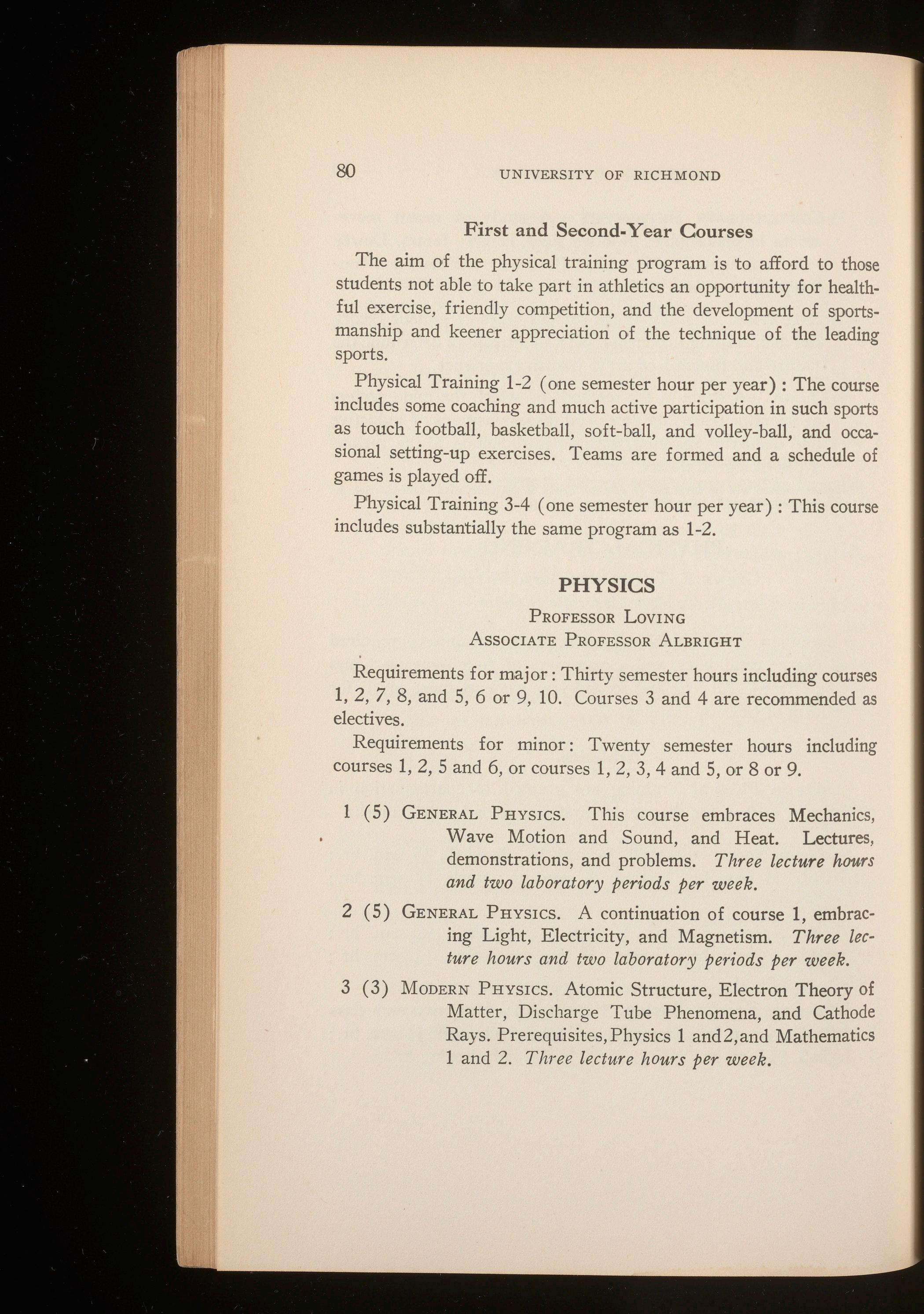
UNIVERSITYOF RICHMOND
First and Second-Year Courses
The aim of the physical training program is to afford to those students not able to take part in athletics an opportunity for healthful exercise, friendly competition, and the development of sportsmanship and keener appreciation of the technique of the leading sports.
Physical Training 1-2 ( one semester hour per year) : The course includes some coaching and much active participation in such sports as touch football, basketball, soft-ball, and volley-ball, and occasional setting-up exercises. Teams are formed and a schedule of games is played off.
Physical Training 3-4 ( one semester hour per year) : This course includes substantially the same program as 1-2.
PHYSICS
PROFESSORLOVING ASSOCIATEPROFESSORALBRIGHT
Requirements for major: Thirty semester hours including courses 1, 2, 7, 8, and 5, 6 or 9, 10. Courses 3 and 4 are recommended as electives.
Requirements for minor: Twenty semester hours including courses 1, 2, 5 and 6, or courses 1, 2, 3, 4 and 5, or 8 or 9.
1 ( 5) GENERALPHYSICS. This course embraces Mechanics, Wave Motion and Sound, and Heat. Lectures, demonstrations, and problems. Three lecture hours and two laboratory periods per week.
2 (5) GENERALPHYSICS. A continuation of course 1, embracing Light, Electricity, and Magnetism. Three lecture hours and two laboratory periods per week.
3 ( 3) MODERNPHYSICS. Atomic Structure, Electron Theory of Matter, Discharge Tube Phenomena, and Cathode Rays. Prerequisites, Physics 1 and2,and Mathematics 1 and 2. Three lecture hours per week.
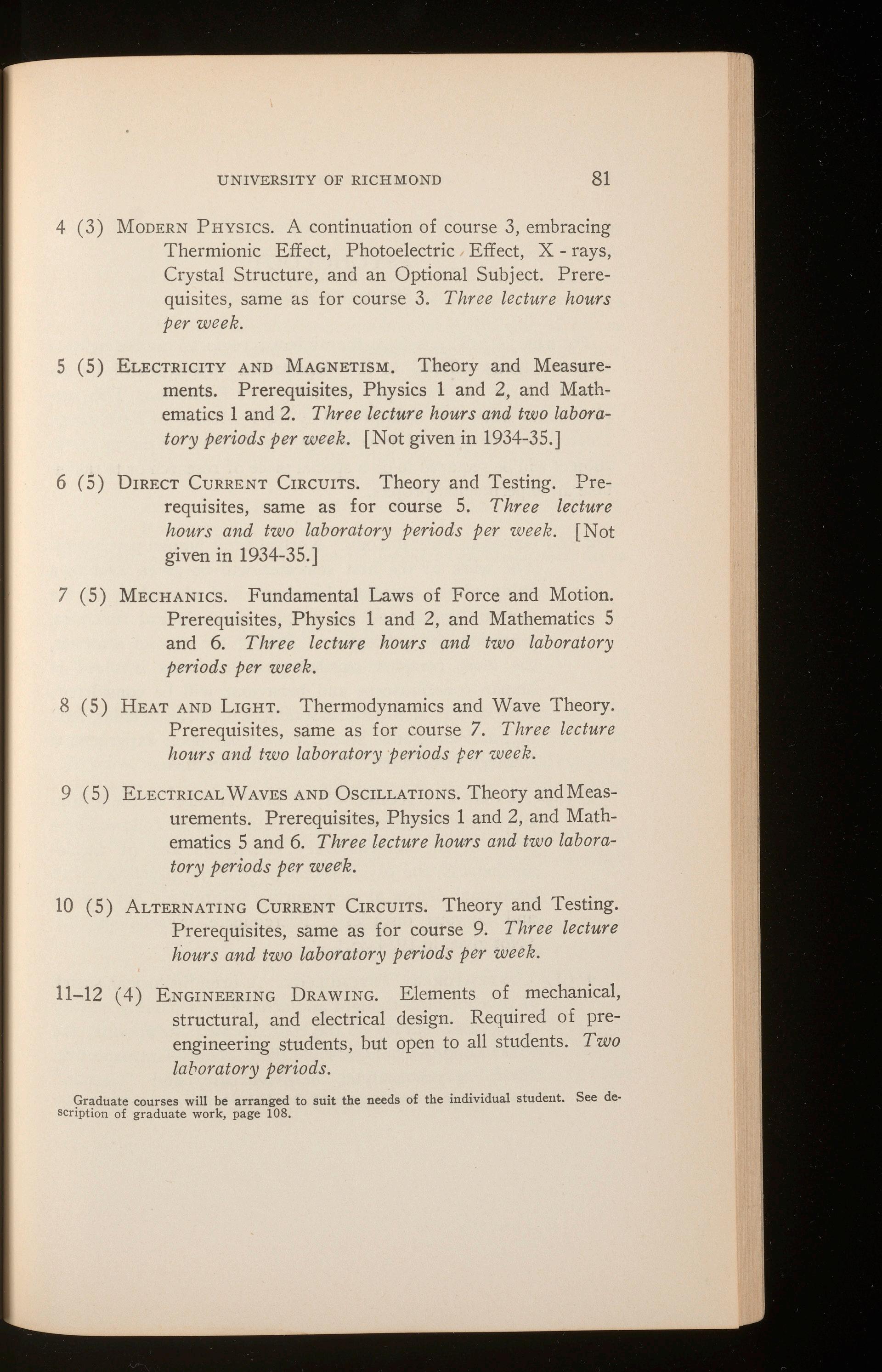
4 (3) MODERNPHYSICS. A continuation of course 3, embracing Thermionic Effect, Photoelectric Effect, X - rays, Crystal Structure, and an Optional Subject. Prerequisites, same as for course 3. Three lecture hours per week.
5 ( 5) ELECTRICITYAND MAGNETISM. Theory and Measurements. Prerequisites, Physics 1 and 2, and Mathematics 1 and 2. Three lecture hours and two laboratory periods per week. [Not given in 1934-35.]
6 (5) DIRECT CURRENT CIRCUITS. Theory and Testing. Prerequisites, same as for course 5. Three lecture hours and two laboratory periods per week. [Not given in 1934-35.]
7 (5) MECHANICS. Fundamental Laws of Force and Motion. Prerequisites, Physics 1 and 2, and Mathematics 5 and 6. Three lecture hours and two laboratory periods per week.
8 (5) HEAT AND LIGHT. Thermodynamics and Wave Theory. Prerequisites, same as for course 7. Three lecture hours and two laboratory periods per week.
9 (5) ELECTRICALWAVESAND OSCILLATIONS.Theory andMeasurements. Prerequisites, Physics 1 and 2, and Mathematics 5 and 6. Three lecture hours and two laboratory periods per week.
10 (5) ALTERNATINGCURRENT CIRCUITS. Theory and Testing. Prerequisites, same as for course 9. Three lecture hours and two laboratory periods per week.
11-12 ( 4) ENGINEERING DRAWING. Elements of mechanical, structural, and electrical design. Required of preengineering students, but open to all students. Two laboratory periods.
Graduate courses will be arranged to suit the needs of the individual student. See description of graduate work, page 108.

PSYCHOLOGY PROFESSORASTROP
For a major in Psychology, the student is required to take eighteen semester hours offered in the department supplemented by six semester hours in Phiiosophy, Sociology, or Education. This supplementary work is to be approved by the Professor of Psychology. During the last year of Psychology, the student majoring in the subject will be required to do a special piece of research or to undertake an experimental project.
1-2 (6) GENERALPSYCHOLOGY.Normal adult human psychology. The work of the first semester will be given over to a study of the anatomy, histology, and physiology of the nervous system and the simpler psychological functions, sensation and perception . During the second semester, the more complex psychological processes involved in human consciousness and behaviour will be considered; imagination , attention, reasoning, will, instinct, habit, feeling, and emotion. Stress will be put upon experimental findings throughout. Not open to Freshmen.
3 (3) ABNORMALPSYCHOLOGY.A brief account of the history and changing conceptions of mental disorder followed by a study of the contemporary viewpoints and of feeblemindedness, the psychoneuroses, and the psychoses with occasional clinics at neighboring institutions for mental and nervous disorders. Prerequisite, Psychology 1-2. [Not given in 1934-35.]
4 (3) CONTEMPORARYPSYCHOLOGY.A brief historical sketch of psychological thought and achievement passing quickly to a general survey of the contemporary viewpoints ; the outstanding psychologists and their schools-introspective, "Self," psychoanalytic, behaviouristic, and "Gestalt." Prerequisite, Psychology 1-2. [Not offered in 1934-35 ]
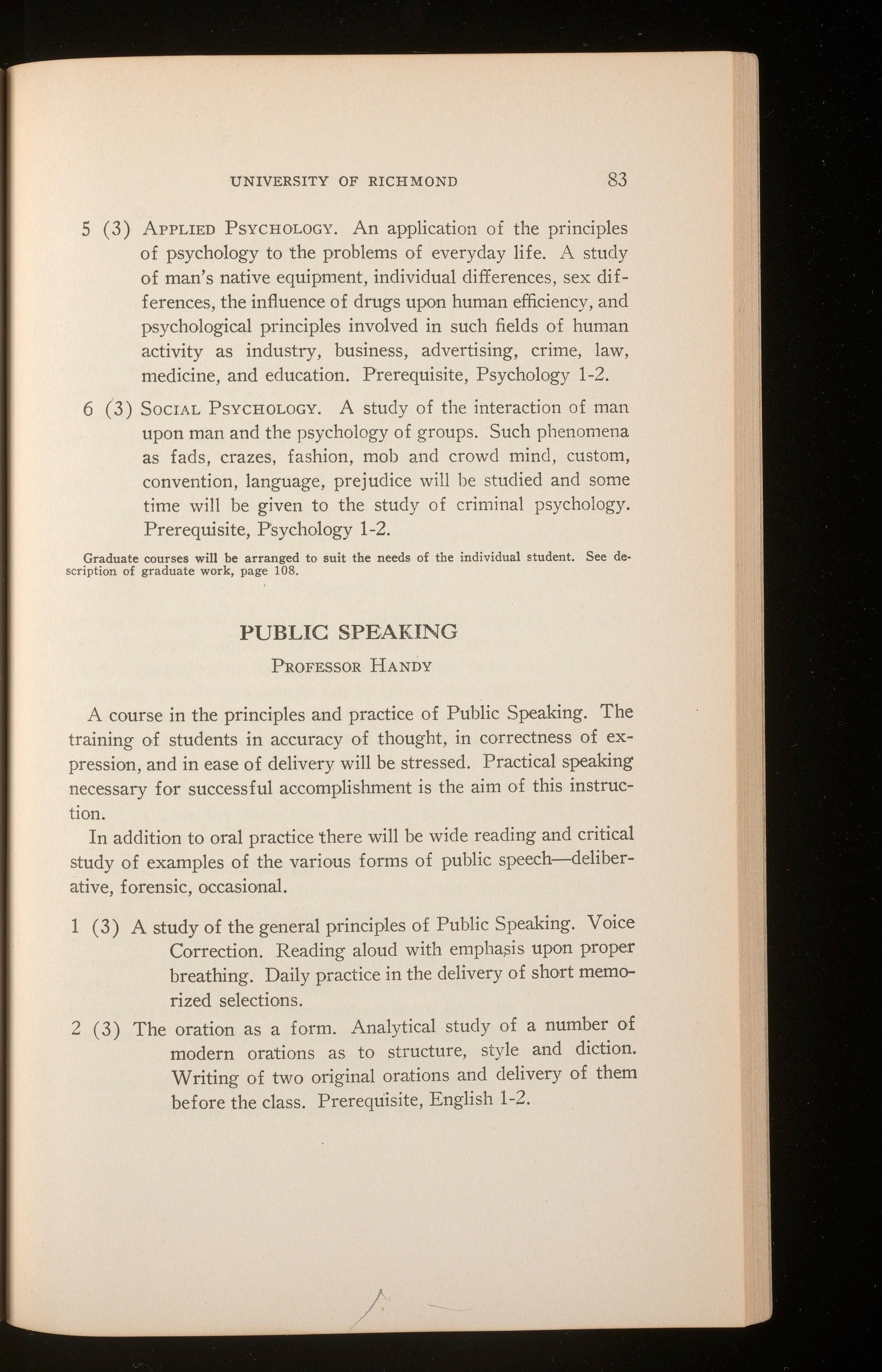
5 ( 3) APPLIED PSYCHOLOGY.An application of the principles of psychology to the problems of everyday life. A study of man's native equipment, individual differences, sex differences, the influence of drugs upon human efficiency, and psychological principles involved in such fields of human activity as industry, business, advertising, crime, law, medicine, and education. Prerequisite, Psychology 1-2.
6 ( 3) SocrAL PSYCHOLOGY.A study of the interaction of man upon man and the psychology of groups. Such phenomena as fads, crazes, fashion, mob and crowd mind, custom, convention, language, prejudice will be studied and some time will be given to the study of criminal psychology. Prerequisite, Psychology 1-2.
Graduate courses will be arranged to suit the needs of the individual student. See de• scription of graduate work, page 108.
PUBLIC SPEAKING
PROFESSORHANDY
A course in the principles and practice of Public Speaking. The training of students in accuracy of thought, in correctness of expression, and in ease of delivery will be stressed. Practical speaking necessary for successful accomplishment is the aim of this instruction.
In addition to oral practice there will be wide reading and critical study of examples of the various forms of public speech-deliberative, forensic, occasional.
1 ( 3) A study of the general principles of Public Speaking. Voice Correction. Reading aloud with empha13isupon proper breathing. Daily practice in the delivery of short memorized selections.
2 ( 3) The oration as a form. Analytical study of a number of modern orations as to structure, style and diction. Writing of two original orations and delivery of them before the class. Prerequisite, English 1-2.
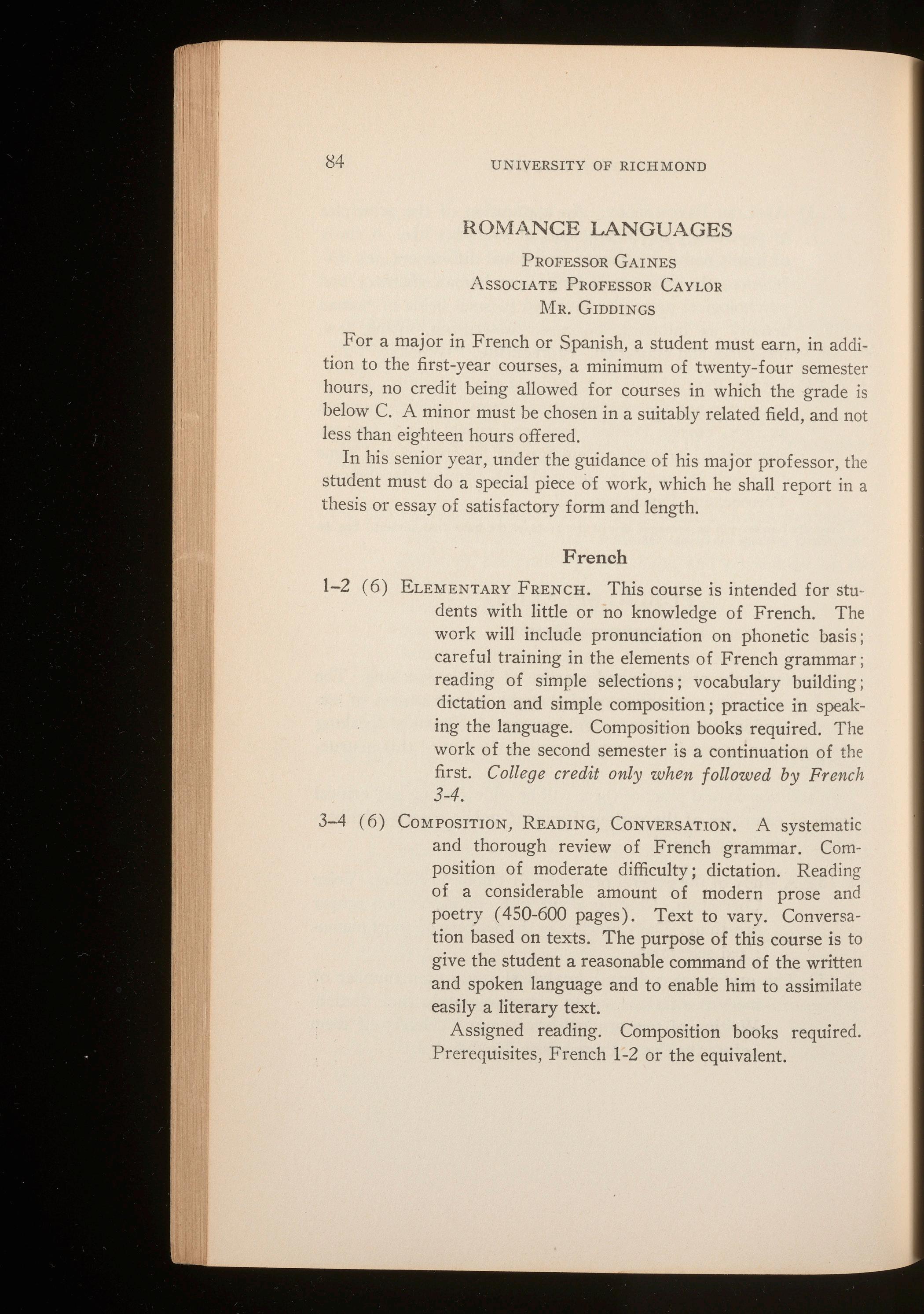
UNIVERSITYOF RICHMOND
ROMANCE LANGUAGES
PROFESSORGAINES
ASSOCIATEPROFESSORCAYLOR
MR. GIDDINGS
For a major in French or Spanish, a student must earn, in addition to the first-year courses, a minimum of twenty-four semester hours, no credit being allowed for courses in which the grade is below C. A minor must be chosen in a suitably related field, and not less than eighteen hours offered.
In his senior year, under the guidance of his major professor, the student must do a special piece of work, which he shall report in a thesis or essay of satisfactory form and length.
French
1-2 (6) ELEMENTARYFRENCH. This course is intended for students with little or no knowledge of French. The work will include pronunciation on phonetic basis; careful training in the elements of French grammar; reading of simple selections ; vocabulary building; dictation and simple composition; practice in speaking the language. Composition books required. The work of the second semester is a continuation of the first. Callege credit only when fallowed by French 3-4.
3-4 ( 6) COMPOSITION,READING, CONVERSATION.A systematic and thorough review of French grammar. Composition of moderate difficulty; dictation. Reading of a considerable amount of modern prose and poetry ( 450-600 pages). Text to vary. Conversation based on texts. The purpose of this course is to give the student a reasonable command of the written and spoken language and to enable him to assimilate easily a literary text. Assigned reading. Composition books required. Prerequisites, French 1-2 or the equivalent.
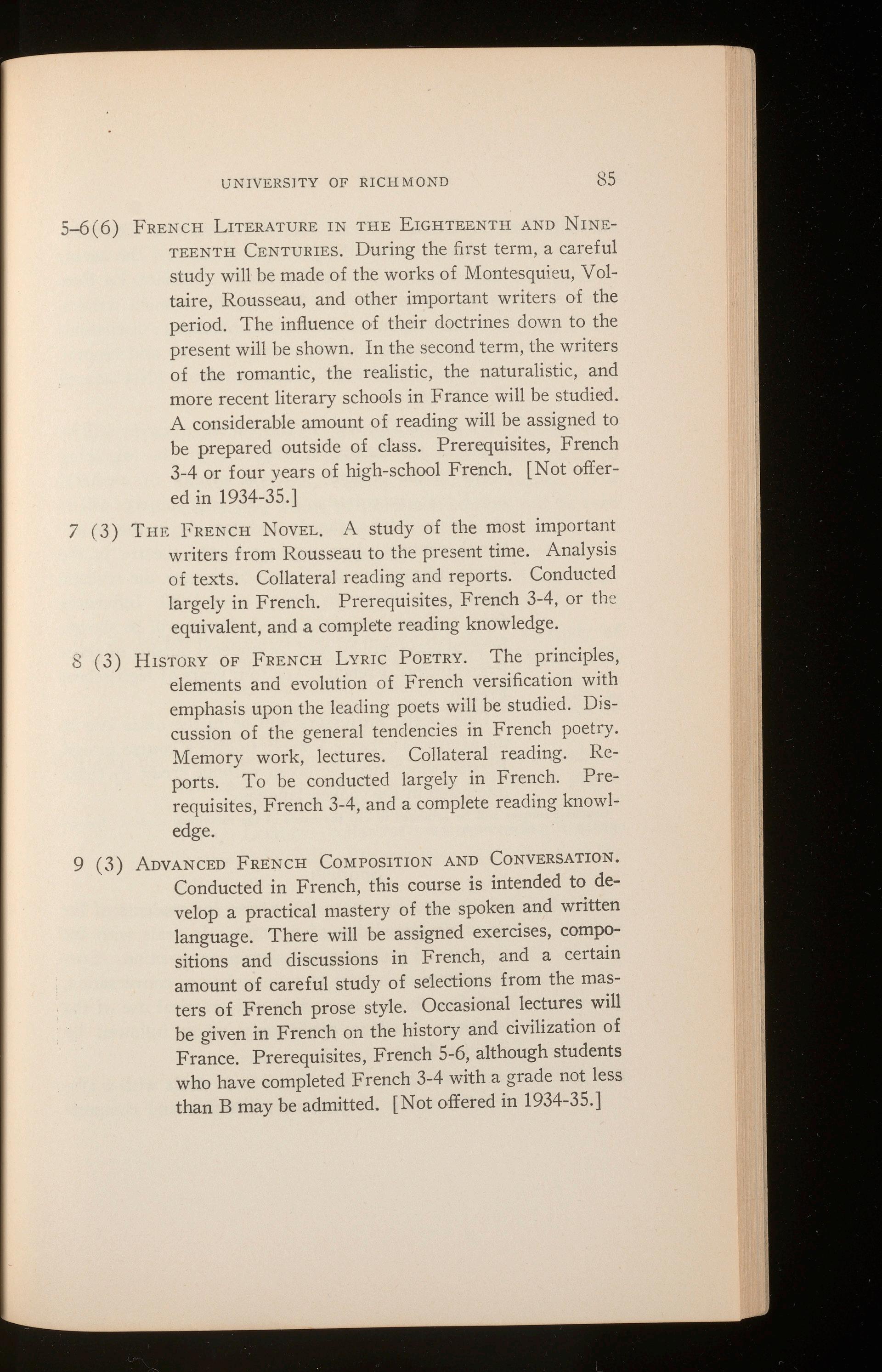
UNIVERSJTYOF RICHMOND
5-6(6) FRENCH LITERATUREIN THE EIGHTEENTHAND NINETEENTHCENTURIES.During the first term, a careful study will be made of the works of Montesquieu, Voltaire, Rousseau, and other important writers of the period. The influence of their doctrines down to the present will be shown. In the second term, the writers of the romantic, the realistic, the naturalistic, and more recent literary schools in France will be studied. A considerable amount of reading will be assigned to be prepared outside of class. Prerequisites, French 3-4 or four years of high-school French. [Not offered in 1934-35.]
7 ( 3) THE FRENCH NOVEL. A study of the most important writers from Rousseau to the present time. Analysis of texts. Collateral reading and reports. Conducted largely in French. Prerequisites, French 3-4, or th e equivalent, and a complete reading knowledge.
8 ( 3) HISTORY OF FRENCH LYRIC POETRY. The principles, elements and evolution of French versification with emphasis upon the leading poets will be studied. Discussion of the general tendencies in French poetry. Memory work, lectures. Collateral reading. Reports. To be conducted largely in French. Prerequisites, French 3-4, and a complete reading knowledge.
9 (3) ADVANCEDFRENCH COMPOSITIONAND CONVERSATION. Conducted in French, this course is intended to develop a practical mastery of the spoken and written language. There will be assigned exercises, compositions and discussions in French, and a certain amount of careful study of selections from the masters of French prose style. Occasional lectures will be given in French on the history and civilization of France. Prerequisites, French 5-6, although students who have completed French 3-4 with a grade not less than B may be admitted. [Not offered in 1934-35.]
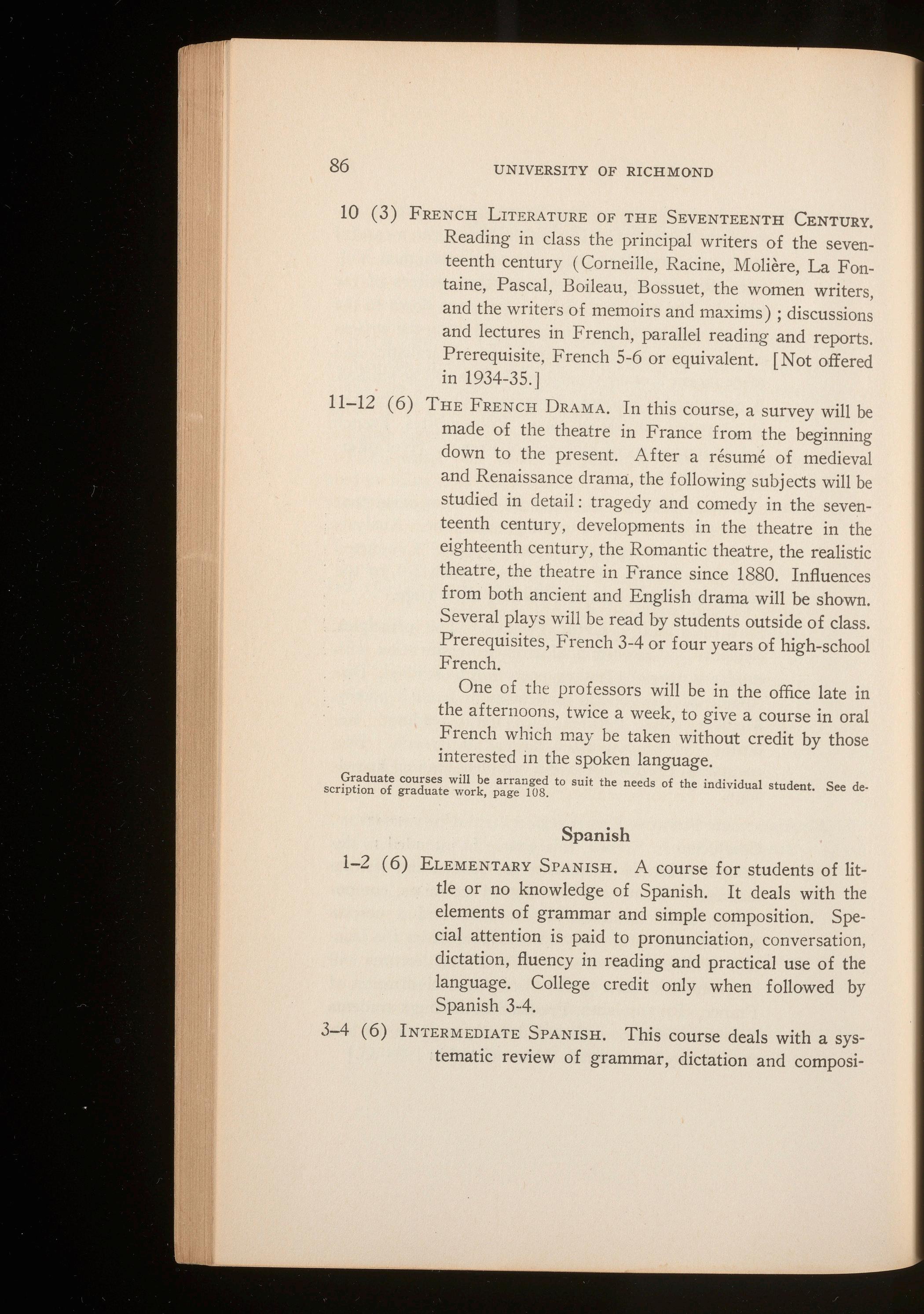
UNIVERSITYOF RICHMOND
10 (3) FRENCH LITERATUREOF THE SEVENTEENTHCENTURY. Reading in class the principal writers of the seventeenth century ( Corneille, Racine, Moliere, La Fontaine, Pascal, Boileau, Bossuet, the women writers , and the writers of memoirs and maxims) ; discussions and lectures in French, parallel reading and reports. Prerequisite, French 5-6 or equivalent. [Not offered in 1934-35.]
11-12 (6) THE FRENCH DRAMA. In this course, a survey will be made of the theatre in France from the beginning down to the present. After a resume of medieval and Renaissance drama, the following subjects will be studied in detail: tragedy and comedy in the seventeenth century, developments in the theatre in the eighteenth century, the Romantic theatre, the realistic theatre, the theatre in France since 1880. Influences from both ancient and English drama will be shown. Several plays will be read by students outside of class. Prerequisites, French 3-4 or four years of high-school French.
One of the professors will be in the office late in the afternoons, twice a week, to give a course in oral French which may be taken without credit by those interested in the spoken language.
Graduate courses will be arranged to suit the needs of the individual student. See de- scription of graduate work, page 108.
Spanish
1-2 (6) ELEMENTARYSPANISH. A course for students of little or no knowledge of Spanish. It deals with the elements of grammar and simple composition. Special attention is paid to pronunciation, conversation, dictation, fluency in reading and practical use of the language. College credit only when followed by Spanish 3-4.
3-4 (6) INTERMEDIATESPANISH. This course deals with a systematic review of grammar, dictation and composi-
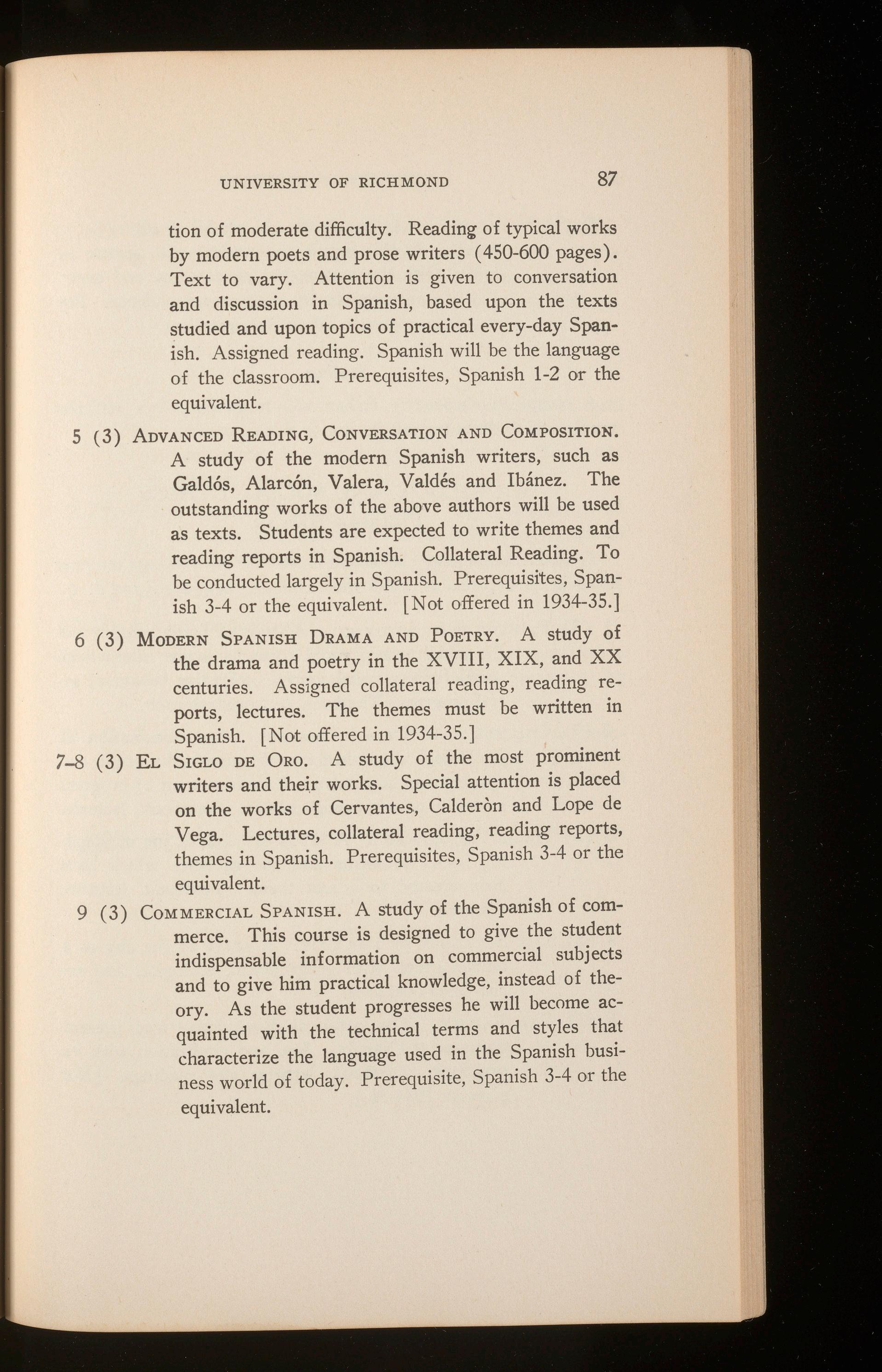
UNIVERSITYOF RICHMOND
tion of moderate difficulty. Readin~ of typical works by modern poets and prose writers ( 450-600 pages). Text to vary. Attention is given to conversation and discussion in Spanish, based upon the texts studied and upon topics of practical every-day Spanish. Assigned reading. Spanish will be the language of the classroom. Prerequisites, Spanish 1-2 or the equivalent.
5 (3) ADVANCEDREADING,CONVERSATIONAND COMPOSITION. A study of the modern Spanish writers, such as Gald6s, Alarcon, Valera, Valdes and Ibanez. The outstanding works of the above authors will be used as texts. Students are expected to write themes and reading reports in Spanish. Collateral Reading. To be conducted largely in Spanish. Prerequisites, Spanish 3-4 or the equivalent. [Not offered in 1934-35.]
6 (3) MODERNSPANISH DRAMAAND POETRY. A study of the drama and poetry in the XVIII, XIX, and XX centuries. Assigned collateral reading, reading reports, lectures. The themes must be written in Spanish. [Not offered in 1934-35.]
7-8 (3) EL SIGLO DE ORo. A study of the most prominent writers and thei r works. Special attention is placed on the works of Cervantes ., Calderon and Lope de Vega. Lectures, collateral reading, reading reports, themes in Spanish. Prerequisites, Spanish 3-4 or the equivalent.
9 (3) COMMERCIALSPANISH. A study of the Spanish of commerce. This course is designed to give the student indispensable information on commercial subjects and to give him practical knowledge, instead of theory. As the student progresses he will become acquainted with the technical terms and styles that characterize the language used in the Spanish business world of today. Prerequisite, Spanish 3-4 or the equivalent.

UNIVERSITYOF RICHMOND
10 (3) SPANISH CORRESPONDENCE. A study of all types of letters. In this course the student will become familiar with the commercial expressions and everyday idioms used in Spanish correspondence. Prerequisites, Spanish 3-4 or the equivalent.
Italian
A course in elementary Italian will be offered if a sufficient number of students request it.
SOCIOLOGY AND SOCIAL ETHICS PROFESSORHARLAN
To major in Sociology, a student must offer twenty-four semester hours in the department which must include Sociology 7 and 8.
1 (3) PRINCIPLESOF SocIOLOGY. A study of human nature and the social order ; social contacts ; social interaction ; social forces; social control; collective behavior; social progress. Textbook, lectures, research.
2 ( 3) CULTUREAND SOCIAL PROGRESS. An examination of the biological and historical factors in the origin and development of culture. A measurement of progress in terms of advancing culture. Textbook, lectures.
3 (3) SOCIALADJUSTMENT. A study of some of the outstanding social problems and the agencies which have been created to adjust them. Textbook, lectures , research.
4 ( 3) THE SocIOLOGYOF THE CITY. A study of the city as a human group with geographical, ecological and social-functional area.
S (3) THE FAMILY. The historical development and present status of the family. Sex and civilization with its problems. Textbook, lectures and readings. [Not given in 1934-35.]
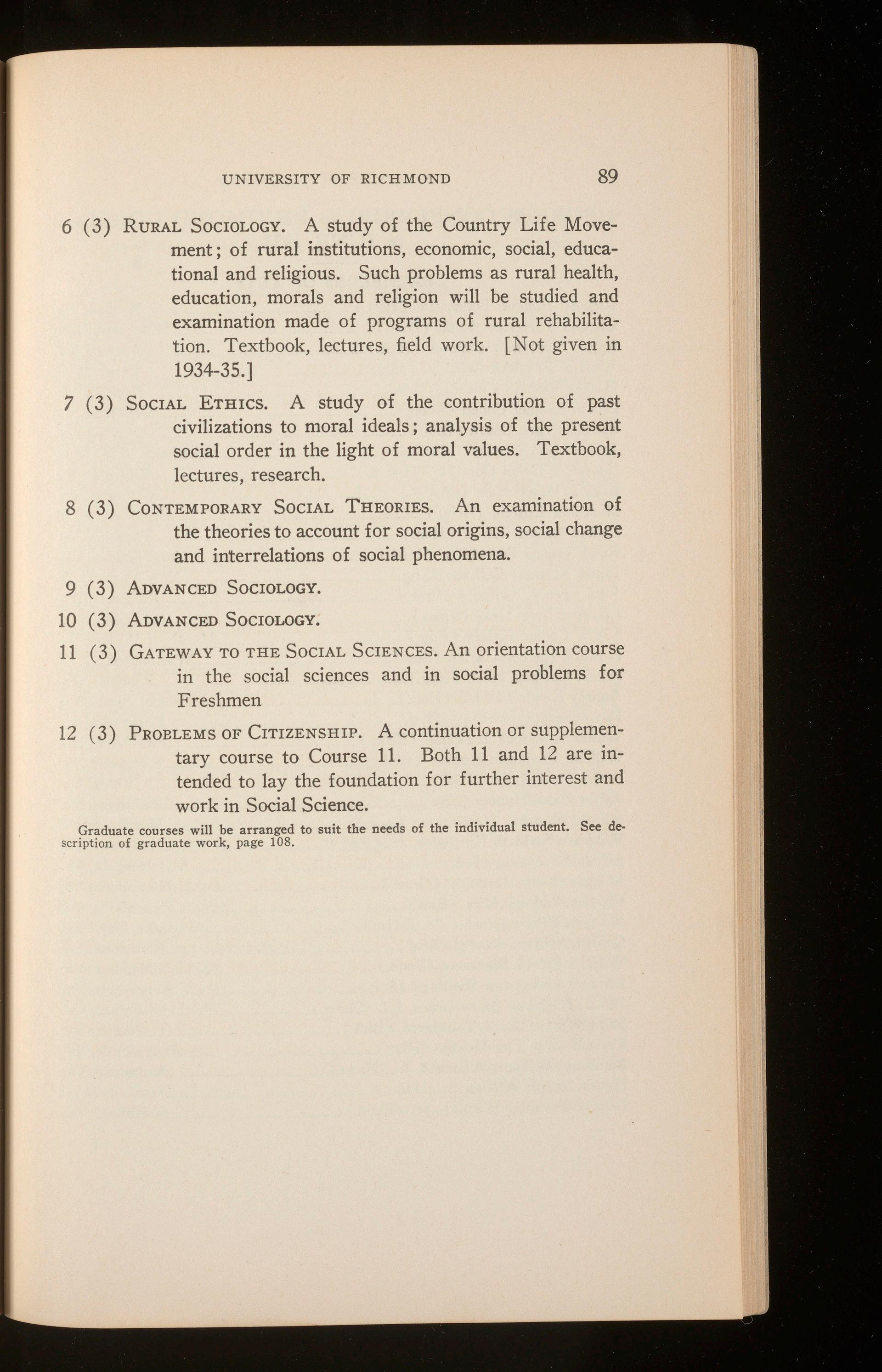
6 (3) RURAL SocIOLOGY. A study of the Country Life Movement; of rural institutions, economic, social, educational and religious. Such problems as rural health, education, morals and religion will be studied and examination made of programs of rural rehabilitation. Textbook, lectures, field work. [Not given in 1934-35.]
7 ( 3) SOCIAL ETHICS. A study of the contribution of past civilizations to moral ideals; analysis of the present social order in the light of moral values. Textbook, lectures, research.
8 ( 3) CONTEMPORARYSocIAL THEORIES. An examination of the theories to account for social origins, social change and interrelations of social phenomena.
9 (3) ADVANCEDSOCIOLOGY.
10 (3) ADVANCEDSOCIOLOGY.
11 (3) GATEWAYTO THE SocIAL SCIENCES.An orientation course in the social sciences and in social problems for Freshmen
12 (3) PROBLEMSOF CITIZENSHIP. A continuation or supplementary course to Course 11. Both 11 and 12 are intended to lay the foundation for further interest and work in Social Science.
Graduate courses will be arranged to suit the needs of the individual student. See descript ion of graduate work, page 108
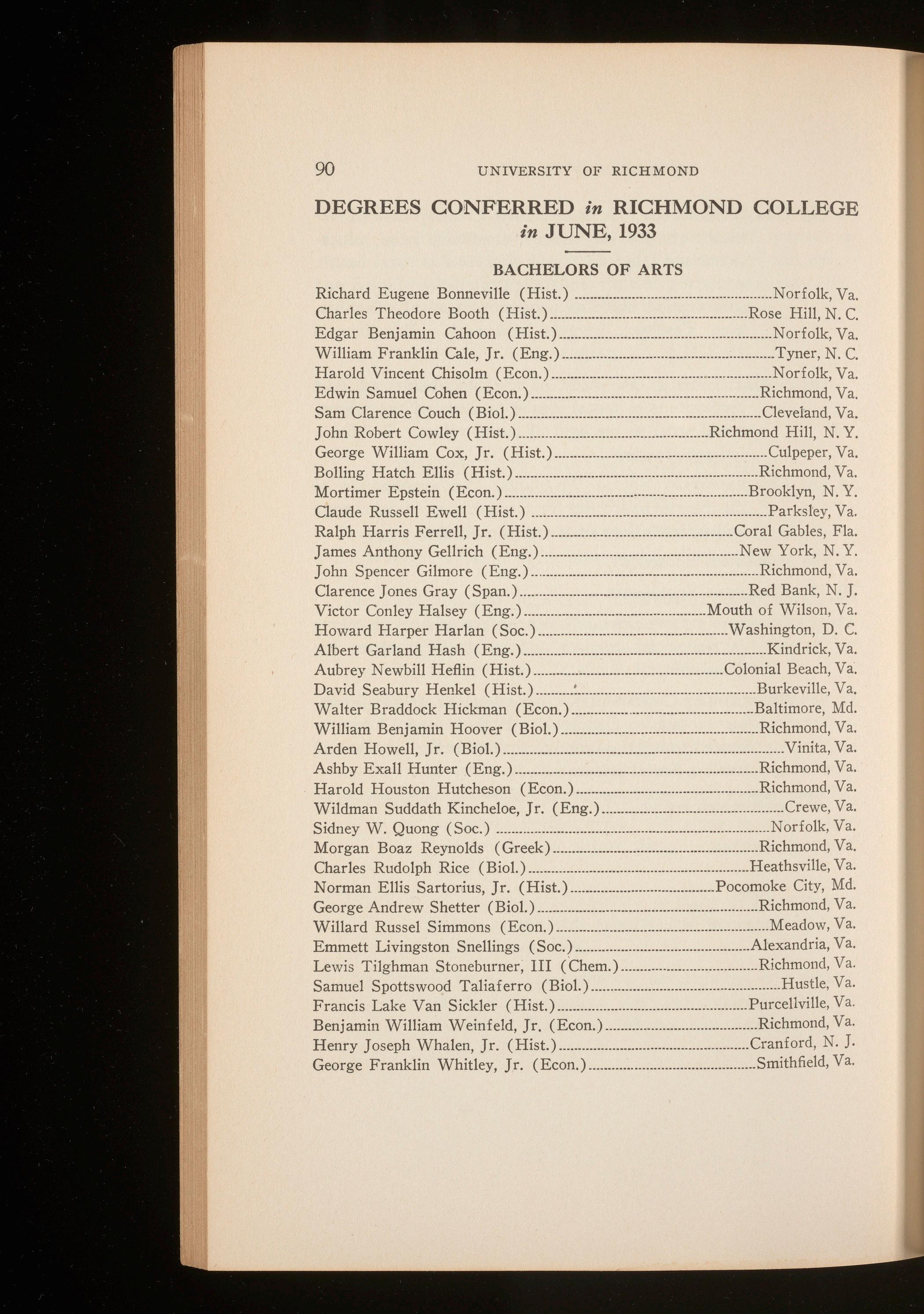
UNIVERSITY OF RICHMOND
DEGREES CONFERRED in RICHMOND COLLEGE
in JUNE, 1933
BACHELORS OF ARTS
Richard Eugene Bonneville (Hist.) ....................................................Norfolk, Va.
Charles Theodore Booth (Hist.) Rose Hill, N. C.
Edgar Benjamin Cahoon (Hist.) ........................................................Norfolk, Va.
William Franklin Cale, Jr. (Eng.) ........................................................Tyner, N. C.
Harold Vincent Chisolm (Econ.) Norfolk, Va.
Edwin Samuel Cohen (Econ.) ............................................................Richmond, Va.
Sam Clarence Couch (Biol.) ................................................................Cleveland, Va.
John Robert Cowley (Hist.) Richmond Hill, N. Y.
George William Cox, Jr. (Hist.) ......Culpeper, Va.
Bolling Hatch Ellis (Hist.) ................................................................Richmond, Va.
Mortimer Epstein (Econ.) Brooklyn, N. Y.
Claude Russell Ewell (Hist.) ..............................................................Parksley, Va.
Ralph Harris Ferrell, Jr. (Hist.) ................................................Coral Gables, Fla.
James Anthony Gellrich (Eng.) ....................................................New York, N. Y.
John Spencer Gilmore (Eng.) ............................................................Richmond, Va.
Clarence Jones Gray (Span.) Red Bank, N. J.
Victor Conley Halsey (Eng.) ................................................Mouth of Wilson, Va.
Howard Harper Harlan (Soc.) ..................................................Washington, D. C.
Albert Garland Hash (Eng.) ................................................................Kindrick, Va.
Aubrey Newbill Heflin (Hist.) ..................................................Colonial Beach, Va.
David Seabury Henkel (Hist.) ..........'................................................Burkeville, Va.
Walter Braddock Hickman (Econ.) ................................................Baltimore, Md.
William Benjamin Hoover (Biol.) Richmond, Va.
Arden Howell, Jr. (Biol.) Vinita, Va.
Ashby Exall Hunter (Eng.) ................................................................Richmond, Va.
Harold Houston Hutcheson (Econ.) ................................................Richmond, Va.
Wildman Suddath Kincheloe, Jr. (Eng.) ................................................Crewe, Va.
Sidney W. Quong (Soc.) ........................................................................Norfolk, Va.
Morgan Boaz Reynolds (Greek) ......................................................Richmond, Va.
Charles Rudolph Rice (Biol.) ..........................................................Heathsville, Va.
Norman Ellis Sartorius, Jr. (Hist.) Pocomoke City, Md.
George Andrew Shetter (Biol.) Richmond, Va.
Willard Russel Simmons (Econ.) ........................................................Meadow, Va.
Emmett Livingston Snellings (Soc.) ..............................................Alexandria, Va.
Lewis Tilghman Stoneburner; III (Chem.) Richmond, Va.
Samuel Spottswood Taliaferro (Biol.) ..................................................Hustle, Va.
Francis Lake Van Sickler (Hist.) ..................................................Purce!lville, Va.
Benjamin William Weinfeld, Jr . (Econ.) ........................................Richmond, Va.
Henry Joseph Whalen, Jr. (Hist.) ..................................................Cranford, N. J.
George Franklin Whitley, Jr. (Econ.) ............................................Smithfield, Va.

Samuel Wilcox (Eng.) Richmond, Va.
Elbert Lee Wright (Hist.) Richmond, Va.
BACHELORS OF SCIENCE
Robert Reynolds Anderson, Jr. (Phys.) ..........................................Richmond, Va.
William Hughes Evans (Chem.) Richmond, Va.
William Frederic Fidler (Chem.) ....................................................Richmond, Va.
Welty Cecil Good (Chem.) Penn Laird, Va.
\Villiam Jesse Hudgins, Jr. (Chem.) Richmond, Va.
Abe Meyer Jacobson (Chem.) Richmond, Va.
Alberti Fraser Lapsley (Chem.) Richmond, Va.
Sam Lazaru~ (Chem.) ........................................................................Richmond, Va.
Euclid Buxton Luning (Chem.) ................................................Newport News, Va.
Harrill McGinnis (Chem.) ..................................................................Richmond, Va.
Christopher Pappenheim Miller (Chem.) ........................................Richmond, Va.
Thomas Ovid Newell (Phys.) ..............................Richmond, Va.
Richard Spurgeon Owens, Jr. (Biol.) ...................................................Roanoke, Va.
Joseph Ross Perkins, Jr. (Phys.) ......................................................Richmond, Va.
William Henry Pettus, Jr. (Chem.) ........................................Charleston, W. Va.
Aaron Gene Roberts (Chem.) Richmond, Va.
Herbert Grayson Ruffin (Chem.) ......................................................Richmond, Va.
Marshall Washington Smith (Biol.) Alexandria, Va.
Robert Henning Snellings, Jr. (Chem.) Richmond, Va.
Henry Vranian (Chem.) .....................................................................Richmond, Va.
Fletcher Johnston Wright, Jr. (Chem.) ....................................Petersburg, Va.
BACHELORS OF SCIENCE in BUSINESS ADMINISTRATION
Erasmus Derwin Booker ........................................................................Farnham, Va.
Gamble McAllister Bowers, 11..........................................................Richmond, Va.
Henry Lewis Brothers, J r ...................................................................Richmond, Va.
Louis Buffenstein ..................................................................................Richmond, Va.
Cary Wilson Burkholder ............................ ........................................Richmond, Va.
Robert Bailey CampbelL Richmond, Va.
Randolph Patrick Canada ....................................................................Richmond, Va.
Frederick William Chapman, Jr .......................................................Richmond, Va.
James Woodfin Dodd, Jr Richmond, Va.
Stuart Anthony Eacho ..........................................................................Richmond, Va.
Howard Parker Falls Richmond, Va.
Robert Pollard Fox West Point, Va.
Taylor Pierce Grasty Orange, Va.
Leon Grossman ......................................................................................Richmond, Va.
Richard Charles Hannan ..............................................................West Haven, Conn.
Richard Milton Hobson Richmond, Va.
92
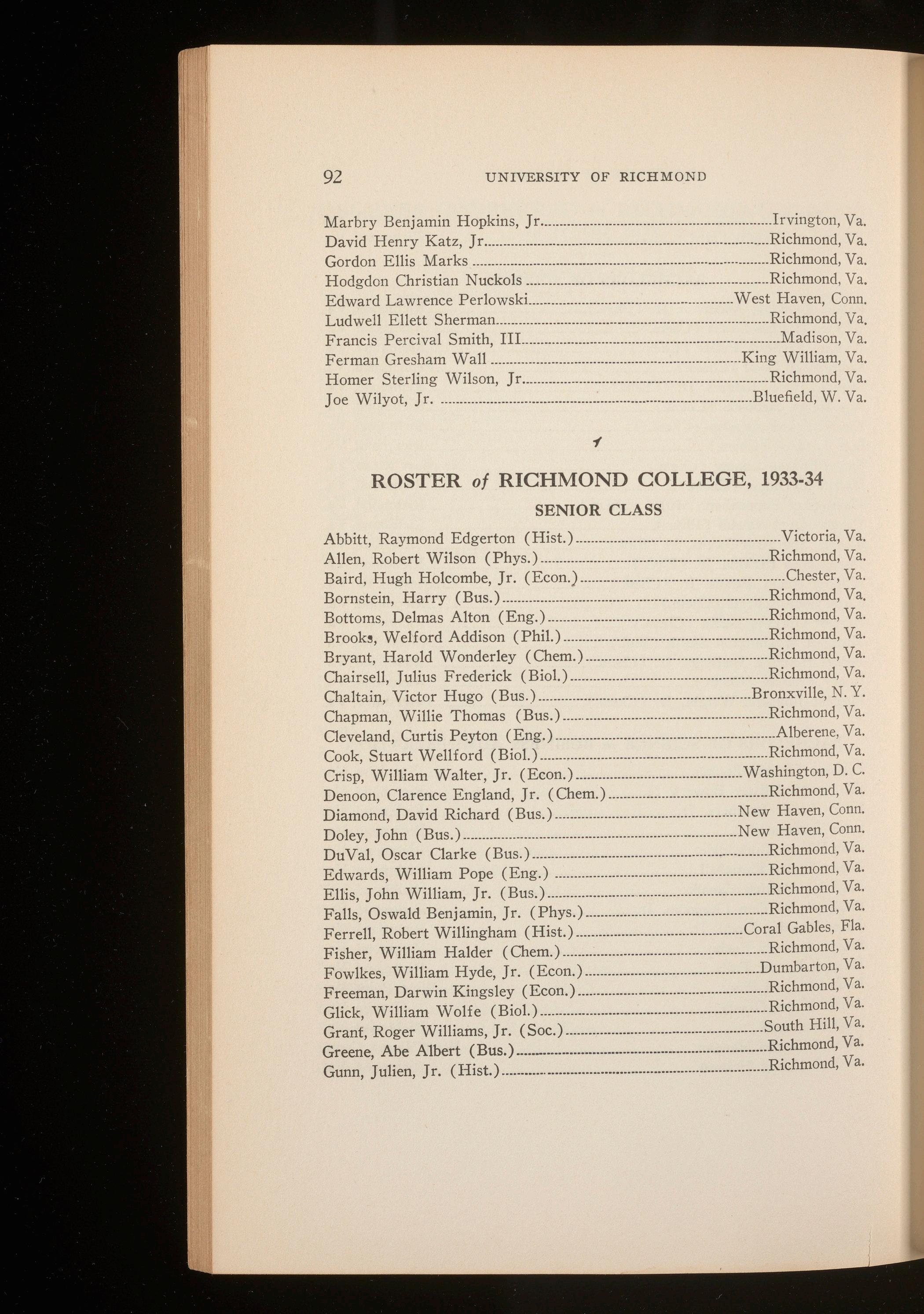
UNIVERSITY OF RICHMOND
Marbry Benjamin Hopkins, Jr .............................................................Irvin gton, Va.
David Henry Katz, Jr. ..........................................................................Richmond, Va.
Gordon Ellis Marks ..............................................................................Richmond, Va.
Hodgdon Christian Nuckols ................................................................Richmond, Va.
Edward Lawrence Perlowski ................... West Haven, Conn.
Ludwell Ellett Sherman ........................................................................Richmond, Va.
Francis Percival Smith, IIL .......................... ..................Madison, Va.
Ferman Gresham Wall ..................................................................King William, Va.
Homer Sterling \Vil son, Jr .................................................................Richmond, Va.
Joe Wilyot, Jr. ..................................................................................Bluefield, W. Va.
ROSTER of RICHMOND COLLEGE, 1933-34
SENIOR CLASS
Abbitt, Raymond Edgerton (Hist.) ......................................................Victoria, Va.
Allen, Robert Wilson (Phys.) ............................................................Richmond, Va. Baird , Hugh Holcombe, Jr. (Econ.) ......................................................Chester, Va. Bornstein, Harry (Bus.) ......................................................................Richmond, Va. Bottoms, Delmas Alton (Eng.) ..........................................................Richmond, Va. Brook~, Welford Addison (Phil.) ......................................................Richmond , Va. Bryant, Harold Wonderley (Chem.) ................................................Richmond, Va. Chairsell, Julius Frederick (Biol.) ..................................... ............Richmond , Va. Chaltain, Victor Hugo (Bus.) ........................................................Bronxville, N. Y. Chapman, Willie Thomas (Bus.) ................. ............Richmond, Va. Cleveland, Curtis Peyton (Eng.) ..........................................................Alberene , Va. Cook, Stuart Well ford (Biol.) ............................................................Richmond , Va. Crisp, William Walter, Jr. (Econ.) ............................................Washington, D. C. Denoon, Clarence England, Jr. (Chem.) ..........................................Richmond, Va. Diamond, David Richard (Bus.) ................................................New Haven, Conn. Daley, John (Bus.) ........................................................................New Haven, Conn. DuVal, Oscar Clarke (Bus.) ..............................................................Richmond, Va. Edwards, William Pope (Eng.) ......... .......................................Richmond, Va. Ellis, John William, Jr. (Bus.) .........................................................Richmond , Va. Falls, Oswald Benjamin, Jr. (Phys.) ............... ...............................Richmond , Va. Ferrell, Robert Willingham (Hist.) ............................................Coral Gables, Fla. Fisher, William Halder (Chem.) ......................................................Richmond, Va. Fowlkes, William Hyde, Jr. (Econ.) ..............................................Dumbarton, Va. Freeman, Darwin Kingsley (Econ.) ..................................................Richmond, Va. Glick, William Wolfe (Biol.) ............................................................Richmond, Va. Granf, Roger Williams, Jr. (Soc.) ....................................................South Hill, Va. Greene, Abe Albert (Bus.)
Va.
Va. Gunn, Julien, Jr. (Hist.)

Haberer, Frederick William (Soc.) ................................................Evansville, Ind. Haddock, Edward Ellis (Biol.) ..........................................................Richmond, Va. Hardcastle, Aaron Bascom (Biol.) ...................................................Sutherlin, Va. Bening, John Burwell (Bus.) ............................................................Pittsburgh, Pa. Hill, Walter Launcelot (Biol.) ..........................................................Richmond, Va. Ingalls, Parker William (Bus.) ..........................................................Richmond, Va. Johnson, Henry Satterwhite (Ed., Hist.) ..............................................Hylas, Va. Johnson, James Mercer (Bus.) ................................................Fort Spring, W. Va. Kamsky, David (Bus.) ..........................................................................Richmond, Va. Kent, Oarence Linden (Bus.) ............................................................Richmond, Va. Koslow, Herman (Biol.) ......................................................................Richmond, Va. Kovacs, Sandor Bodonsky (Soc.) ..............................................Kiskoros, Hungary Ligon, John Dickey (Bus.) ............................................................College Park, Ga. Lingamfelter, Carl Scott (Biol.) ......................................................Dumbarton, Va. Mallonee, Guy Vernon (Bus.) ............................................................Richmond, Va. May, John Howard, Jr. (Bus.) ..........................................................Richmond, Va. Meade, Foy Emmett (Math.) ....................................................................Pound, Va. Moore, John Armead (Bus.) ..........................................................Bronxville, N. Y. Neblett, Orison Trine (Hist.) ............................................................Richmond, Va. Nye, Paul Washington (Eng.) ......................................................Ellwood City, Pa. Owens, Maurice E. Broadus, Jr. (Chem.) ..................................Cumberland, Md. Palmore, Carlyle Harris (Bus.) ........................................................Richmond, Va. Peele, Benjamin Thomas, Jr. (Educ.) ..........................................Portsmouth, Va. Pointer, Emmett Haywood (Span.) ................................................South Hill, Va. Pressley, Harry Lee (Bus.) ................................................................Clintwood, Va. Puckett, Roy Nelson (Biol.) ..............................................................Richmond, Va. Ravdin, Alexander Junius (Bus.) ····················································-·Richmond, Va. Roberts, Harry Agee (Bus.) ................................................................Richmond, Va. Rowland, Homer E. (Bus.) ............................................................Hagerstown, Md. Schmidt, William Charles, Jr. (Bus.) Richmond, Va. Seward, William Ward, Jr. (Eng.) ..........................................................Surry, Va. Snead, Howard Garnett (Biol.) ..........................................................Morattico, Va. Stevenson, Vernon Hearne (French) Pocomoke City, Md. Stockdell, Hugh (Eng.) ......................................................................Richmond, Va. Straus, Clifford Allen (Chem.) ..........................................................Richmond, Va. Taylor, Beverley Douglas (Bus.) ......................................................Richmond, Va. Terry, William Parker (Biol.) ..........................................................Burkeville, Va. Trawick, MacE!din (Psych.) ..............................................................Richmond, Va. Tyler, Gilman Rackley (Chem.) ........................................................Richmond, Va. Van Allen, Harold (Phys.) ................................................................Scottsville, Va. Walker, John Edwin, Jr. (Bus.) ........................................................Richmond, Va. White, Edward Street (Econ.) ..................................................................Cadiz, Ky. Williams, Ernest Newsom (Hist.) ......................................................Franklin, Va. Wood, James Ira (Educ.) ........................................................................Moseley, Va.

UNIVERSITY OF RICHMOND
Wright, Samuel Anderson (Math.) ..................................................Richmond, Va, Wright, William Wiatt (Phil.) ..............................................................Norfolk, Va.
JUNIORS
Allen, George Ira (Soc.) ..............................................................Washington, D. C. Anderson, John Marshall (Econ.).................. ............................Richmond, Va. Arendall, Charles Baker, Jr. (Hist.) ......................................................Mobile, Ala. Bagby, Ernest Lynwood (Chem.) ......................................................R,ichmond,Va. Bagby, Samuel Adams (Hist.) .....................................................Sao Paulo, Brazil Baker, Stuart Watkins ..........................................................................Hallsboro, Va. Ballowe, Lloyd Dabney ..........................................................................Richmond, Va. Ballou, Billy Witt (Bus.) ....................................................................Richmond, Va. Baroody, Eugene Michael (Phys.) ....................................................Richmond, Va. Barbe, Waverly ,vilson (Eng.) ..........................................................Franklin, Ky. Bass, David Edward, Jr. (Bus.) ........................................................Richmond, Va. Bass, Howard Aubrey, Jr. (Biol.) ........................................................Moseley, Va. Benenson, Edward Hartley ............................................................New York, N. Y. Berkley, Julius Lyons ....................................................................Charleston, W. Va. Blanton, Boyd Hampton, Jr. (Bus.) ......................................Rutherfordton, N. C. Booker, James Motley (Hist.) ............................................................Lottsburg, Va. Bousman, Gary Alfred (Soc.) ..........................................................Richmond, Va. Bowles, Bowlman Tarleton ........................................................Chattanooga, Tenn. Branch, Garland Harold (Phys.) ......................................................Richmond, Va. Briggs, Joseph Augustus (Hist.) ......................................................Richmond, Va. Britton, Beverley Lyle (Eng.) ............................................................Richmond, Va. Brooking, Raymond Edward (Bus.) ................................................Richmond, Va. Buck, Walter Roger III (Chem.) ..............................................................Glass, Va. Bunting, Freddie Roland (Bus.) ..............................................Temperanceville, Va. Butler, L. V. Winfrey (Biol.) ..............................................................Culpeper, Va. Campbell, Ben Logan (Bus.) ............................................................Petersburg, Va. Capps, John Talbot, Jr. (Bus.) ..............................................................Norfolk, Va. Cardoza, Hugh Latimer, Jr. (Bus.) ..................................................Richmond, Va. Carter, Woodrow Earl (Bus.) ........................................................Martinsville, Va. Casey, Thomas Francis (Econ.) ....................................................Worcester, Mass. Cavan, Richard Harvey, Jr. (Chem.) ..........................................Greensboro, N. C. Chadwick, Robert E. Lee (H.ist.) ..........................................................Ontario, Va. Charnock, Rodger Homer ..............................................................Cape Charles, Va. Oarke, William Frederick (Fr.) ......................................................Richmond, Va. Clayton, Walter William (Bus.) ........................................................Richmond, Va. Collins, Lewis Garland (Educ.) ...............................................................Ideal, Va. Connors, David James (Bus.) .......................................................Saybrook, Conn. Cooke, Lawson Hill, Jr. (Bus.) ..........................................................Richmond, Va. Cosby, Clifton David (Soc.) ................................................................Powhatan, Va. Courtney, John Wilfred (Biol.) ......................................................West Point, Va.
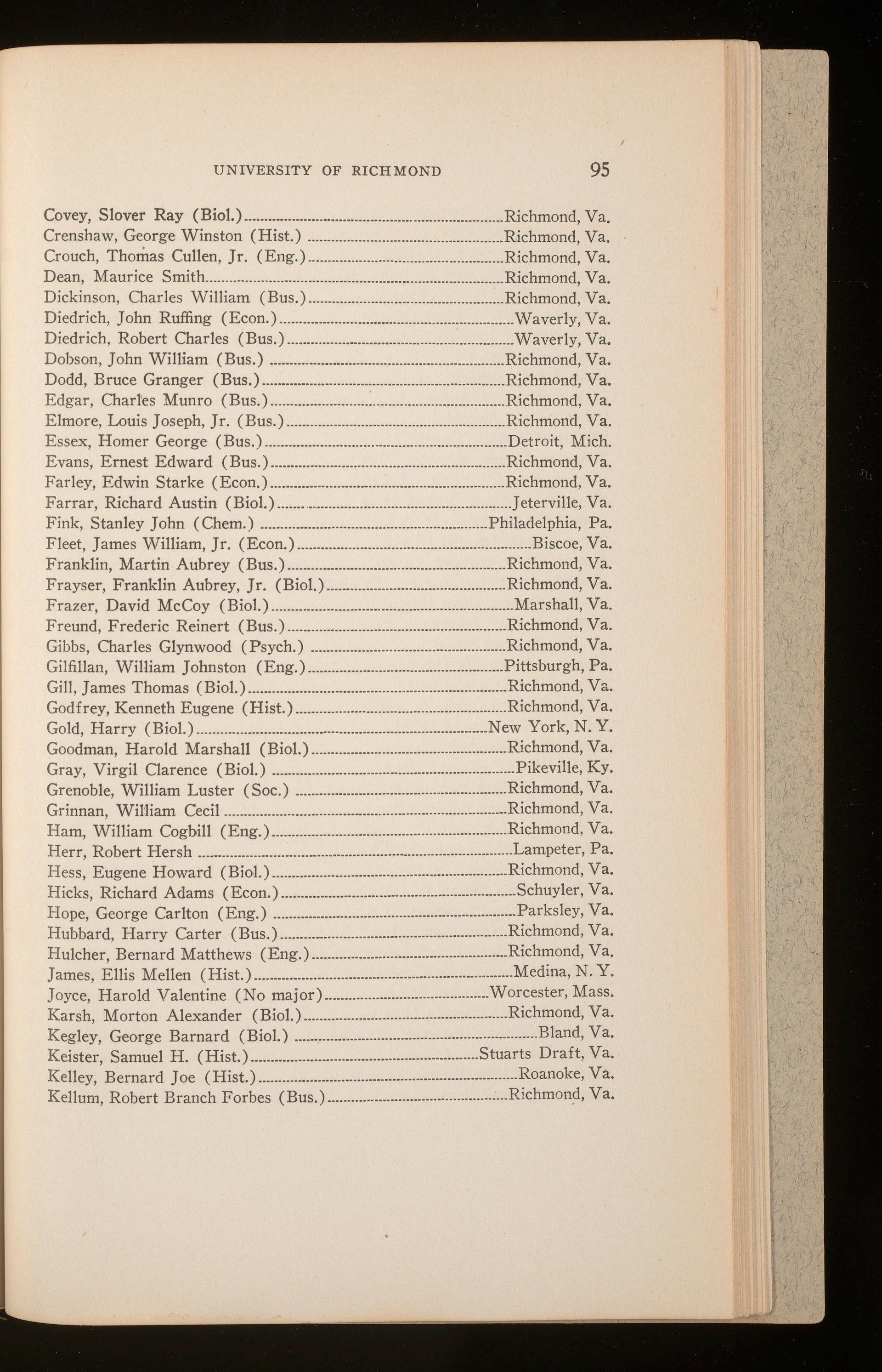
Covey, Slover Ray (Biol.) ..................................................................Richmond, Va. Crenshaw, George Winston (Hist.) ..................................................Richmond, Va.
Crouch, Thomas Cullen, Jr. (Eng.) ..................................................Richmond, Va.
Dean, Maurice Smith ............................................................................Richmond, Va.
Dickinson, Char !es William (Bus.) ..................................................Richmond, Va.
Diedrich, John Ruffing (Econ.) ............................................................Waverly, Va. Diedrich, Robert Charles (Bus.) ..........................................................Waverly, Va.
Dobson, John William (Bus.) ............................................................Richmond, Va. Dodd, Bruce Granger (Bus.) ..............................................................Richmond, Va.
Edgar, Charles Munro (Bus.) ... - .......................................................Richmond, Va.
Elmore, Louis Joseph, Jr. (Bus.) ........................................................Richmond, Va. Essex, Homer George (Bus.) ............................................................Detroit, Mich.
Evans, Ernest Edward (Bus.) ............................................................Richmond, Va. Farley, Edwin Starke (Econ.) ............................................................Richmond, Va.
Farrar, Richard Austin (Biol.) Jeterville, Va. Fink, Stanley John (Chem.) ........._ ....................Philadelphia, Pa. Fleet, James William, Jr. (Econ.) ............................................................Biscoe, Va.
Franklin, Martin Aubrey (Bus.) ...................................... Richmond, Va.
Frayser, Franklin Aubrey, Jr. (Biol.) ..............................................Richmond, Va.
Frazer, David McCoy (Biol.) ..............................................................Marshall, Va. Freund, Frederic Reinert (Bus.) .....................................................Richmond, Va. Gibbs, Charles Glynwood (Psych.) ..................................................Richmond, Va. Gilfillan, William Johnston (Eng.) ..................................................Pittsburgh, Pa. Gill, James Thomas (Biol.) ..................................................................Richmond, Va. Godfrey, Kenneth Eugene (Hist.) ......................................................Richmond, Va. Gold, Harry (Biol.) ............. - ...........................................................New York, N. Y. Goodman, Harold Marshall (Biol.) ..................................................Richmond, Va. Gray, Virgil Clarence (Biol.) ..._ - Pikeville, Ky. Grenoble, William Luster (Soc.) _.....Richmond, Va. Grinnan, William Cecil ................................. - .....................................Richmond, Va. Ham, William Cogbill (Eng.) ............................................................Richmond, Va. Herr, Robert Hersh ................................................................................Lampeter, Pa. Hess, Eugene Howard (Biol.) .............................................................Richmond, Va. Hicks, Richard Adams (Econ.) ............................................................Schuyler, Va. Hope, George Carlton (Eng.) ...............- .............................................Parksley, Va. Hubbard, Harry Carter (Bus.) ..........................................................Richmond, Va. Hu!cher, Bernard Matthews (Eng.) ..................................................Richmond, Va. James, Ellis Mellen (Hist.) ..................................................................Medina, N. Y. Joyce, Harold Valentine (No major) ..........................................Worcester, Mass. Karsh, Morton Alexander (Biol.) ....................................................Richmond, Va. Kegley, George Barnard (Biol.) ..............................................................Bland, Va. Keister, Samuel H. (Hist.) ..........................................................Stuarts Draft, Va. Kelley, Bernard Joe (Hist.) ..................................................................Roanoke, Va. Kellum, Robert Branch Forbes (Bus.) ..............................................Richmond, Va.

UNIVERSITY OF RICHMOND
Kern, Cleveland Craddock (Biol.) ....................................................Richmond, Va. Lamb, Anderson Wade, Jr. (Chem.) ..............................................Dumbarton, Va. Lane, Allan Herbert, Jr. (Hist.) .......................................................Richmond, Va. Lanier, Raymond Ray, Jr. (Biol.) ..............................................Modest Town, Va. Leitch, William White (Phys.) ..........................................................Richmond, Va. Leverton, Roger Walker (Bus.) ................................................Washington, D. C. Levin, Martin Leonard (Biol.) ........................................................Brooklyn, N. Y. Long, Cyrus Oscar, Jr. (Bus.) .............................................................Richmond, Va. Long, Henry Pollard ............................................................................Richmond, Va. Longan, Robert Coleman, Jr ...............................................................Richmond, Va. Lucas, George Harold ........................................................................Winchester, Va. McCrone, Richard Thomas (Hist.) .................................................Richmond, Va. McGehee, Thomas Edmund (Hist.) ..............................................Kents Store, Va. Meador, Meredith Leake (Bus.) ........................................................Richmond, Va. Meredith, Edward Clement (Eng.) ..................................................Richmond, Va. Miller, Charles Ellis (Math.) ............................................................Richmond, Va. Miller, David Hentshel (Chem.) ........................................................Richmond, Va. Millner, Pryor Reynolds (Bus.) ......................................................Reidsville, N. C. Montgomery, Robert Starling, Jr. (Bus.) ........................................Richmond, Va. Morris, Thomas Hilly (Bus.) ........................................................Martinsville, Va. Morris, William Smithson (Hist.) ................................................Martinsville, Va. Nauman, Charles Anton ........................................................................Richmond, Va. Neathery, Owen Lee (Hist.) ............................................................Falconer, N. Y. Nenon, Ulmer Hunt (Chem.) ................................................................Lenoir, N. C. Nickel, Grayson Lewis, Jr. (Hist.) ..................................................Richmond, Va. Norfleet, John Edward (Hist.) ................................................................Amelia, Va. Parker, Fred Joseph (Soc.) ..............................................................Portsmouth, Va. Patrick, Cary Eldridge (Hist.) ............................................................Hampton, Va. Pearman, William Warren, Jr. (Bus.) ............................................Richmond, Va. Peterson, Charles Wilbur (Bus.) ......................................................Richmond, Va. Pittaro, Ernest Michael... .................................................................New York, N. Y. Poage, Richard Conduff (Hist.) ..........................................................Roanoke, Va. Poehler, Paul Henry, Jr. (Span.) ......................................................Richmond, Va. Rayborn, Leroy Elmer, Jr. (Bus.) ....................................................Richmond, Va. Redford, Andrew Cornelius, Jr ............................................... Richmond, Va. Richardson, Vernon Britt (Hist.) ..................................................Portsmouth, Va. Ridgway, Charles Edward Sylvester (Eng.) ..................................Baltimore, Md. Robertson, Elmer Shackleford (Psych.) ..........................................Richmond, Va. Rudlin, Samuel Edwin (Bus.) ............................................................Richmond, Va. Ryland, William Herman (Bus.) ........................... - .........................South Hill, Va. Sanford, Fillmore Hargrove (Psych.) ................................................Norfolk, Va. Sauer, Enno Thieme (Chem.) ............................................................Richmond, Va. Scarborough, John Thomas (Soc.) ..................................................Disputanta, Va. Schools, Maxwell Rock (Latin) ..........................................................Farnham, Va.
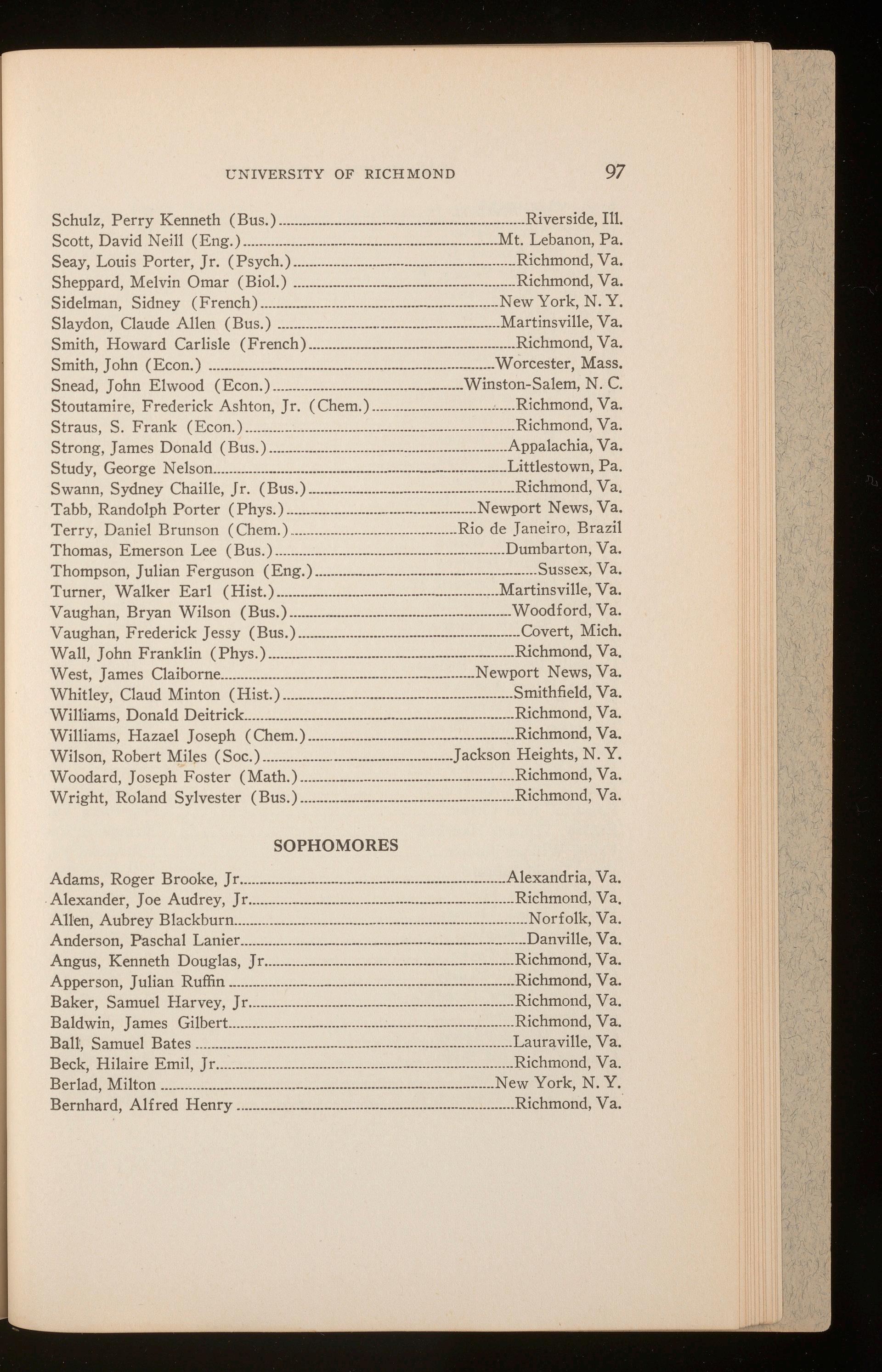
Schulz, Perry Kenneth (Bus.) ..............................................................Riverside, Ill. Scott, David Neill (Eng.) ................................................................Mt. Lebanon, Pa. Seay, Louis Porter, Jr. (Psych.) ........................................................Richmond, Va. Sheppard, Melvin Omar (Biol.) ........................................................Richmond, Va. Sidelman, Sidney (French) ............................................................NewYork, N. Y. Slaydon, Claude Allen (Bus.) ........................................................Martinsville, Va. Smith, Howard Carlisle (French) ....................................................Richmond, Va. Smith, John (Econ.) ........................................................................Worcester, Mass. Snead, John Elwood (Econ.) ................................................Winston-Salem, N. C. Stoutamire, Frederick Ashton, Jr. (Chem.) ....................................Richmond, Va. Straus, S. Frank (Econ.) ....................................................................Richmond, Va. Strong, James Donald (Bus.) ............................................................Appalachia, Va. Study, George Nelson ..........................................................................Littlestown, Pa. Swann, Sydney Chaille, Jr. (Bus.) ....................................................Richmond, Va. Tabb, Randolph Porter (Phys.) ................................................Newport News, Va. Terry, Daniel Brunson (Chem.) ..........................................Rio de Janeiro, Brazil Thomas, Emerson Lee (Bus.) ..........................................................Dumbarton, Va. Thompson, Julian Ferguson (Eng.) ........................................................Sussex, Va. Turner, Walker Earl (Hist.) ........................................................Martinsville, Va. Vaughan, Bryan Wilson (Bus.) ........................................................Woodford, Va. Vaughan, Frederick Jessy (Bus.) ........................................................Covert, Mich. Wall, John Franklin (Phys.) ..............................................................Richmond, Va. West, James Claiborne ................................................................Newport News, Va. Whitley, Claud Minton (Hist.) ..........................................................Smithfield, Va. Williams, Donald Deitrick. ...................................................................Richmond, Va. Williams, Hazael Joseph (Chem.) ....................................................Richmond, Va. Wilson, Robert Miles (Soc.) ................................................Jackson Heights, N. Y. Woodard, Joseph Foster (Math.) ......................................................Richmond, Va. Wright, Roland Sylvester (Bus.) ......................................................Richmond, Va.
SOPHOMORES
Adams, Roger Brooke, J r. ..................................................................Alexandria, Va . Alexander, Joe Audrey, Jr ...................................................................Richmond, Va. Allen, Aubrey Blackburn ..........................................................................Norfolk, Va. Anderson, Paschal Lanier ........................................................................Danville, Va. Angus, Kenneth Douglas, Jr ...............................................................Richmond, Va. Apperson, Julian Ruffin ........................................................................Richmond, Va. Baker, Samuel Harvey, Jr ...................................................................Richmond, Va. Baldwin, James Gilbert ........................................................................Richmond, Va. Ball', Samuel Bates ................................................................................Lauraville, Va. Beck, Hilaire Emil, Jr ...........................................................................Richmond, Va. Berlad, Milton ....................................................................................New York, N. Y. Bernhard, Alfred Henry ......................................................................Richmond, Va.
UNIVERSITY OF RICHMOND
Black, Fred Whitfield, Jr .....................................................................Richmond, Va. Bledsoe, Adam Clarke ..........................................................................Richmond, Va. Blunt, John Samuel, Jr .........................................................................Richmond, Va. Bondurant, Ray Sidney, Jr .....................................................................Norfolk, Va. Bristow, John Christian ........................................................................Richmond, Va. Brown, Edward Guthrie ......................................................................Richmond, Va. Brown, Jacob ····························································-····························Richmond, Brown, Roger Duane ............................................................................Richmond, Va. Brugh, Rex ......................................................................................................Nace, Va. Butler, William Doggett, Jr .................................................................Richmond, Va. Carrier, Russell Neft ............................................................................Richmond, Va. Cherry, Kenneth Jerome ·····················-···············································Richmond, Va. Childress, Dennis Ralph ..................................................................................Fife, Va. Chinn, Joseph William ....................·-························--·······························Hague, Va. Christensen, Gordon Martain ........................................................Kent Cliffs, N. Y. Ciecko, Stanley John ......................................................................New Haven, Conn. Clark, Woodrow Wilson ............................................................................Gladys, Va. Clary, Edward Jefferson ......................................................................Richmond, Va. Collier, Forrest Leonard, J r ...............................................................Petersburg, Va. Compton, William Rufus ..............·-···················································Henderson, Ky. Conrad, Stewart Plummer ..................................................................Richmond, Va. Cook, Joseph Wilbur ............................................................................Richmond, Va. Councill, Benjamin Redwood ..................................................................Holland, Va. Dalton, Harry Anthony ......................................................................Petersburg, Va. Deets, Frank Doutrich ..........................................................................Richmond, Va. Dickinson, William Derwood ..............................................................Richmond, Va. Dorsey, Bennie Rench .....................................................................Hagerstown, Md. Drum, Robert Plemley ..................................................................Mt. Vernon, N. Y. Dutrow, David Andrew, Jr .................................................................Richmond, Va. Edwards, John Oifton ........................................................................Petersburg, Va. Enslow, William Hamilton ..................................................................Richmond, Va. Fallis, William Joseph ............................................................................Roanoke, Va. Flax, David Edward ................................................................................Exmore, Va. Flax, Herman Jacob
Francis, James Thomas ........................................................................Richmond, Va. Fry, John, Godolphin, Jr .......................................................................Richmond, Va. Garnett, Griffin Taylor ..........................................................................Richmond, Va. Garrett, Edward Chaisty ................................................................King William, Va. Gearheart, Ernest Theodore, Jr ...........................................................Richmond, Va. Gill, Jesse W eston ..................................................................................Richmond, Va. Gleason, William Lewis ........................................................................Hampton, Va. Gregory, Wilfred Blair ........................................................................Richmond, Va. Griffin, James Arthur ............................................................................Richmond, Va. Haden, Walter Linwood, Jr .................................................................Richmond, Va.
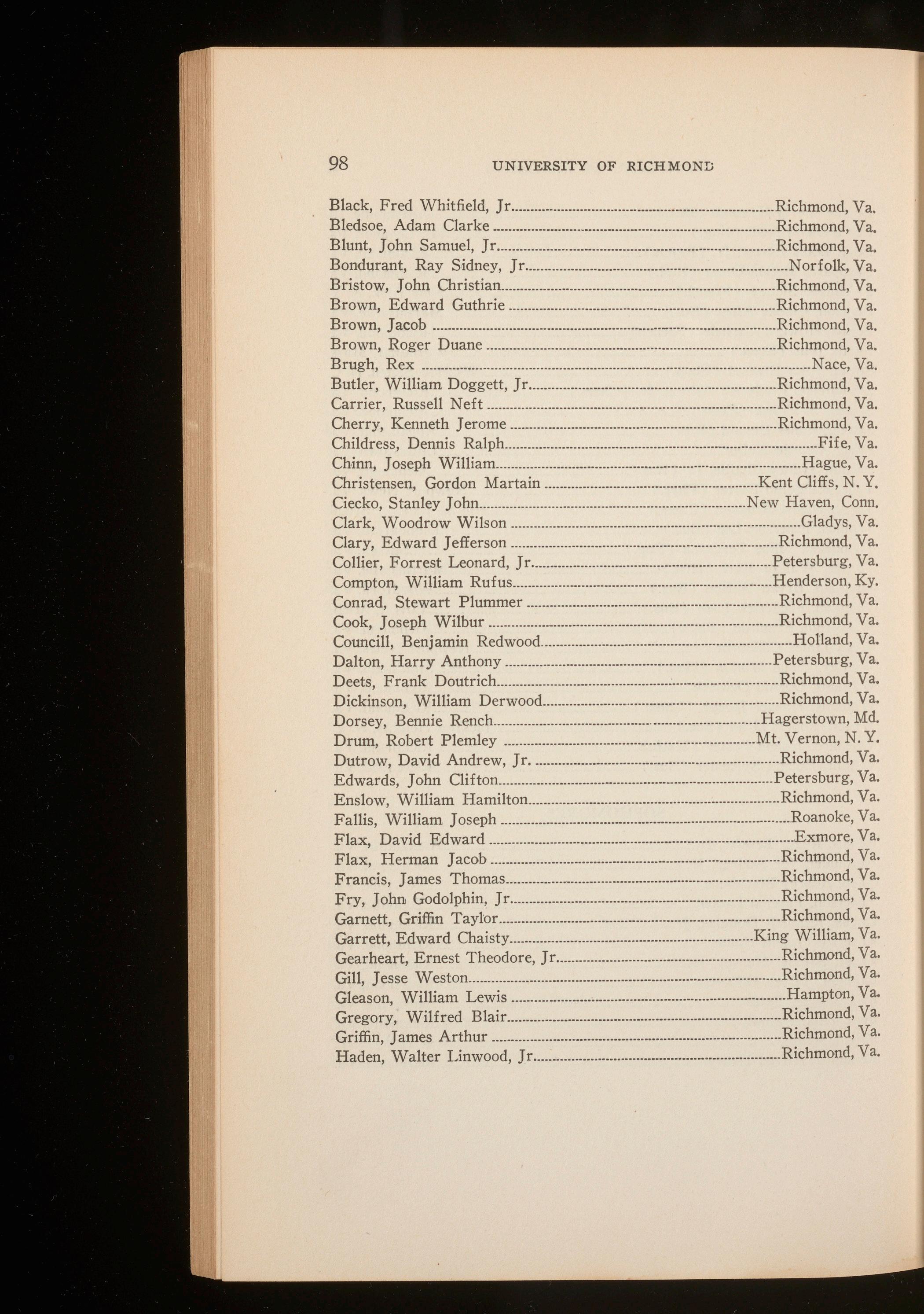
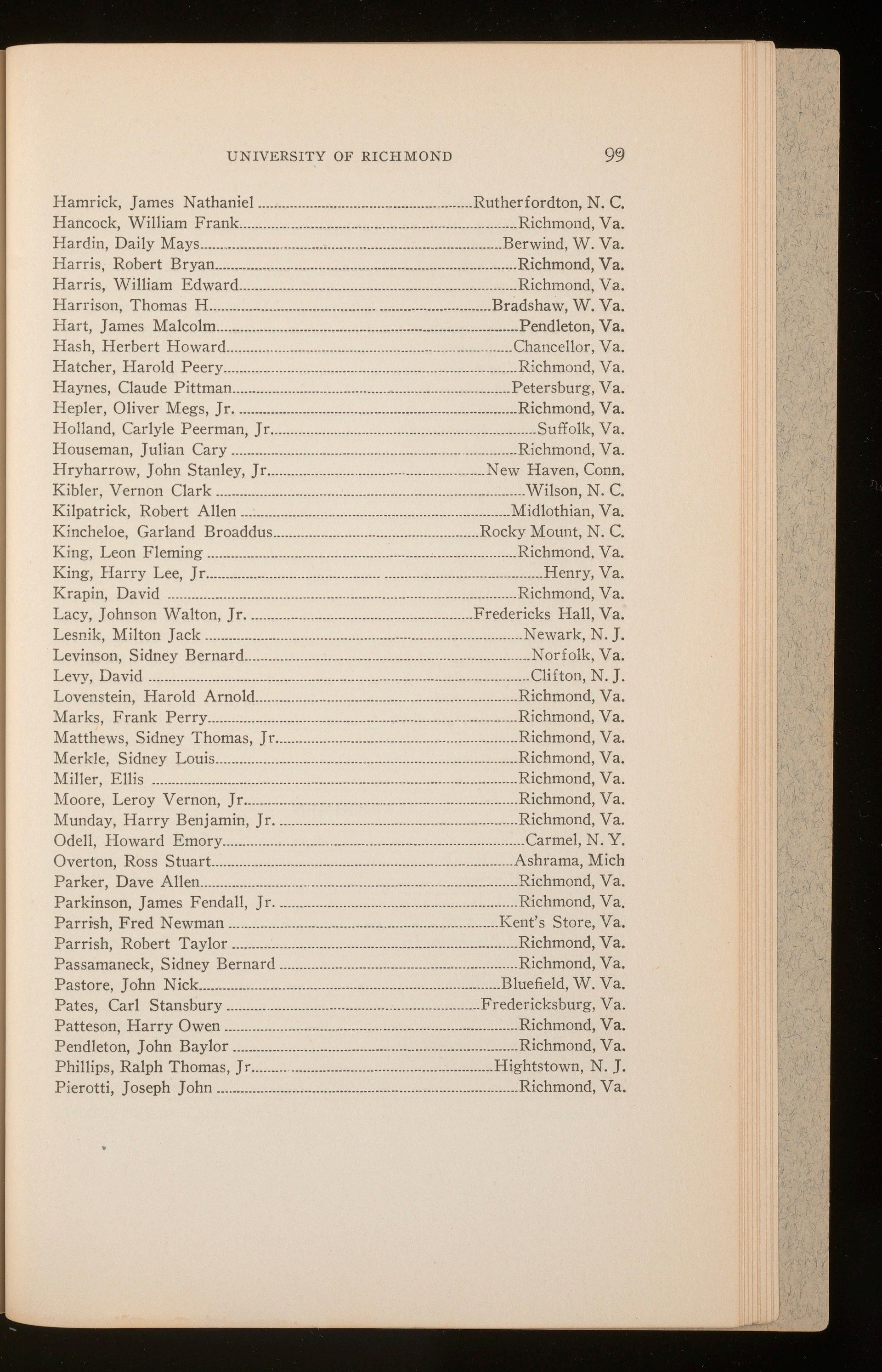
UNIVERSITY OF RICHMOND
Hamrick, James Nathaniel .....................................................Rutherfordton, N. C. Hancock, William Frank. Richmond, Va. Hardin, Daily Mays ....................................................................Berwind, W. Va. Harris, Robert Bryan ............................................................................Richmond, Va. Harris, William Edward ......................................................................Richmond, Va. Harrison, Thomas H ......................................................................Bradshaw, W. Va. Hart, James Malcolm .........................................................................Pendleton, Va. Hash, Herbert Howard .......Chancellor, Va. Hatcher, Harold Peery Richmond, Va. Haynes, Claude Pittman ......................................................................Petersburg, Va. Hepler, Oliver Megs, Jr .............................. ........................................Richmond, Va. Holland, Carlyle Peerman, Jr.. Suffolk, Va. Houseman, Julian Cary .......................................................... Richmond, Va. Hryharrow, John Stanley, Jr ...............New Haven, Conn. Kibler, Vernon Clark \1/ilson, N. C. Kilpatrick, Robert Allen Midlothian, Va. Kincheloe, Garland Broaddus ....................................................Rocky Mount, N. C. King, Leon Fleming Richmond. Va. King, Harry Lee, Jr ....................................................................................Henry, Va. Krapin, David Richmond, Va. Lacy, Johnson Walton, Jr Fredericks Hall, Va. Lesnik, Milton Jack ...............................................................................Newark, N. J.
Levinson, Sidney Bernard ....N or folk, Va. Levy, David ................................................................................................Clifton, N. J.
Lovenstein, Harold Arnold ..................................................................Richmond, Va. Marks, Frank Perry Richmond, Va. Matthews, Sidney Thomas, Jr Richmond, Va. Merkle, Sidney Louis ............................................................................Richmond, Va. Miller, Ellis ............................................................................................Richmond, Va.
Moore, Leroy Vernon, Jr ........Richmond, Va. Munday, Harry Benjamin, Jr Richmond, Va. Odell, Howard Emory ............................................................................Carmel, N. Y.
Overton, Ross Stuart ............................................................................Ashrama, Mich Parker, Dave Allen ...............................................................................Richmond, Va. Parkinson, James Fendall, Jr .............................................................Richmond, Va.
Parrish, Fred Newman ....................................................................Kent's Store, Va. Parrish, Robert Taylor ........................................................................Richmond, Va. Passamaneck, Sidney Bernard ........Richmond, Va. Pastore, John Nick. ...........................................................................Bluefield, W. Va. Pates, Carl Stansbury ......................Fredericksburg, Va. Patteson, Harry Owen ..........................................................................Richmond, Va. Pendleton, John Baylor Richmond, Va. Phillips, Ralph Thomas, Jr ............................................................Hightstown, N. J.
Pierotti, Joseph John Richmond, Va.
100
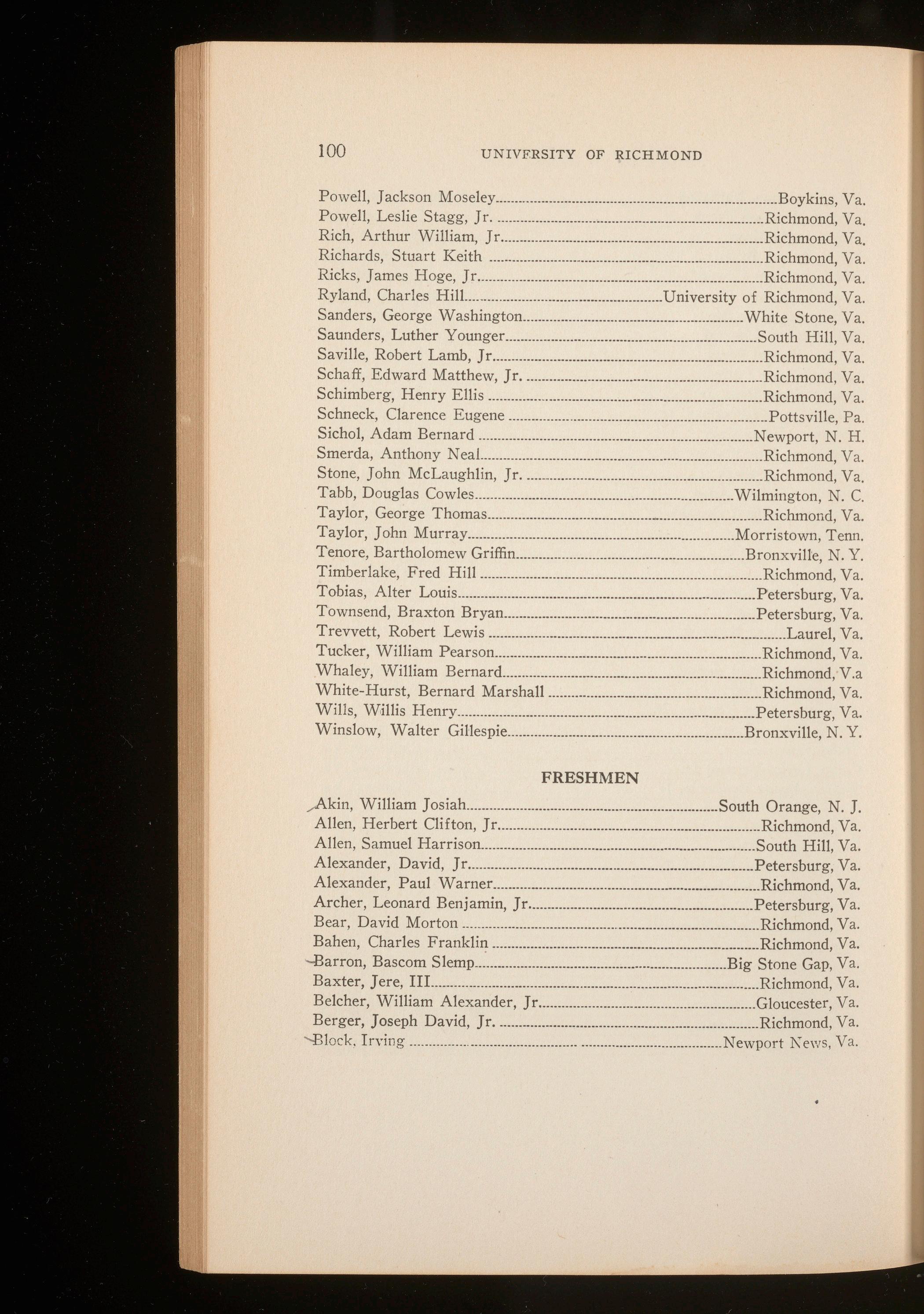
UNIVERSITY OF RICHMOND
Powell, Jackson Moseley ..........................................................................Boykins, Va.
Powell, Leslie Stagg, Jr. ......................................................................Richmond, Va. Rich, Arthur William, Jr .........................................................·-·········Richmond, Va. Richards, Stuart Keith ........................................................................Richmond, Va. Ricks, James Hoge, J r. ..........................................................................Richmond, Va. Ryland, Charles Hill... .................................................University of Richmond, Va. Sanders, George Washington ..........................................................White Stone, Va. Saunders, Luther Younger ..................................................................South Hill, Va. Saville, Robert Lamb, Jr .......................................................................Richmond, Va. Schaff, Edward Matthew, Jr ...............................................................Richmond, Va. Schimberg, Henry Ellis .............. .........................................................Richmond, Va. Schneck, Clarence Eugene ....................................................................Pottsville, Pa.
Sichol, Adam Bernard ........................................................................Newport, N. H. Smerda, Anthony N eal..........................................................................Richmond, Va.
Stone, John McLaughlin, Jr ................................................... Richmond, Va. Tabb, Douglas Cowles ....................................................................Wilmington, N. C. Taylor, George Thomas ..........................................·-···························Richrnond, Va. Taylor, John Murray ......................................................................Morristown, Tenn. Tenore, Bartholomew Griffin............................................................Bronxville, N. Y. Timberlake, Fred Hill ..........................................................................Richmond, Va. Tobias, Alter Louis ..............................................................................Petersburg, Va. Townsend, Braxton Bryan ..................................................................Petersburg, Va.
Trevvett, Robert Lewis
Tucker, William Pearson ......................................................................Richmond, Va. Whaley, Vvilliam Bernard ....................................................................Richmond, V.a White-Hurst, Bernard Marshall ........................................................Richmond, Va. Wills, Willis Henry ..............................................................................Petersburg, Va. Winslow, Walter Gillespie ..............................................................Bronxville, N. Y.
FRESHMEN
,,Akin, William Josiah ..................................................................South Orange, N. J. Allen, Herbert Clifton, Jr .....................................................................Richmond, Va. Allen, Samuel Harrison ........................................................................South Hill, Va. Alexander, David, Jr ...........................................................................Petersburg, Va. Alexander, Paul Warner ......................................................................Richmond, Va. Archer, Leonard Benjamin, Jr ...........................................................Petersburg, Va. Bear, David Morton ..............................................................................Richmond, Va. Bahen, Charles Franklin ......................................................................Richmond, Va. -Barron, Bascom Slemp ..................................................................Big Stone Gap, Va. Baxter, Jere, III.. ....................................................................................Richmond, Va. Belcher, ,villiam Alexander, Jr .........................................................Gloucester, Va. Berger, Joseph David, Jr. ....................................................................Richmond, Va. --Block. IrYing .................................................................................Newport Kews, Va.

Boatwright, John Baker, Jr Buckingham, Va. -Bolton, Waddy Eugene ..........................................................................Richmond, Va. Bond, William George ..........................................................................Edenton, N. C. Bosher, Charles Ashworth ....................................................................Richmond, Va. Botts, George Winston ..............................................................................Norton, Va. Botwick, Harold Barry New Haven, Conn. Bowen, Sam Cecil Tazewell, Va. --Bowers, William Robert ............................................................................Penola, Va. Branch, Robert Clinton, Jr Franklin, Va. Brandis, Roland Buford, Jr .................................................................Richmond, Va. Bristow, Jack Moran Petersburg, Va. --Broaddus, Thomas Irvin Gether, Va. Brooks, Ernest Lee ......,.......................................................................Appalachia, Va. Brown, Edward Parker ............................................................................Suffolk, Va. Brown, Winfrey Ernest ..............................................................Fredericksburg, Va. Bullard, Frank McPherson University of Richmond, Va. Burcher, John Henry, Jr Richmond, Va. Burgess, Ernest Payne, Jr ...............................................................Fork Union, Va. Burton, Mahlon Lee, Jr .........................................................................Richmond, Va. Butler, John Mann ..................................................................................Richmond, Va. Campbell, Donald Gordon Alexandria, Va. Canada, Edward Meade, Jr ...................................................................Richmond, Va. Carswell, Robert MacOean, Jr ...........................................................Richmond, Va. Chewning, Winfree Watkins ..............................................................Richmond, Va. Cohen, Leo Richard ............................................................................Brooklyn, N. Y. Cohen, Lawrence Juhn ......................................................................Philadelphia, Pa. Cosby, Robert Taylor ............................................................................Columbia, Va. oleman, William Tredway, Jr Cascade, Va. Copeland, Randolph Scott, III Richmond, Va. Crawford, Stuart Cottrell ....................................................................Richmond, Va. Creasy, Stover Henry, Jr. _..........................Gretna, Va. Crowder, John Preston, Jr ...................................................................Richmond, Va. Dabney, Bernard Montague, Jr Richmond, Va. Davidson, Edgar Moore, Jr. ................................................................Richmond, Va. Davis, Aubrey Murray ..........................................................................Richmond, Va. Denton, Howard Ransom ................................................................Northville, N. Y. Dervishian, Ernest Herbert ................................................................Richmond, Va. Dickinson, Alfred James, Jr .......................................................Newport News, Va. Diggs, Gaius Weston, Jr .......................................................................Richmond, Va. Duncan, Jim Baldwin ........................................................................Cleveland, Tenn. Eanes, David Conway ............................................................................Richmond, Va.
Earle, John Burns ......................................................................................Milldale, Va.
Earle, Samuel Macatu ..............................................................................Milldale, Va. Edwards, Walton Lamar, Jr ...............................................................Richmond, Va.
102

UNIVERSITY OF RICHMOND
'Evans, Clarence Meredith, Jr. ............................................................Forksville, Va. Ewell, Jefferson Davis, Jr .....................................................................Richmond, Va. Finney, Stanford Columbus ....................................................................Bassetts, Va.
Fleming, Ernest Iredell ..............................................................Rocky Mount, N. C. Ford, Dorsey Bridges ..........................................................................Round Hill, Va.
-Galbraith, Leonard Meredith ..............................................................Richmond, Va.
Garber, William Bcrnard ......................................................................Richmond, Va.
Garrett, Carleton Henry ........................................................................Irvington, Va.
Garwood, Samuel Neidich ................................................................Burlington, N. J. Gasko, Julius ..................................................................................Englishtown, N. J. Gaston, George McClure .............................................................New Haven, Conn. Giannotti, Andrew Joseph ..............................................................Richmond, Va.
Gilman, Bernard Albert ......................................................................Hartford, Conn.
--Givens, Miles Parker ....................................................... - .....................Richmond, Va.
Glidewell, Thomas Henry ..........................................................................Crewe, Va. Godsey, Joseph Cornelius ....................................................................Richmond, Va.
Graham, Samuel Lyle .........................................................................Farmville, Va. Gravatt, Arthur Broaddus ......................................................................Ellerson, Va. Gray, Donald Benson ...................................................................Winter Haven, Fla. Greene, Morris ......................................................................................Richmond, Va.
-Gregory, Wyndham Nelson ................................................................Richmond, Va.
Guy, John Henry, Jr .............................................................................Richmond, Va.
Hamilton, William Clyde ......................................................................Richmond, Va.
Hansell, John Anders ........................................................................New York, N. Y.
Harper, George Lea ................................................................................Marion, S. C.
Harris, Robert Thompson ......................................................................Danville, Va.
Hawley, Edgar Duncan ........................................................................Richmond, Va.
Haydon, Alvah Edison, Jr .....................................................................Irvington, Va.
Heller, Robert Nathan ..........................................................................Richmond, Va.
-Hepler, Stuart Reid ................................................................................Richmond, Va.
Herr, William Dougal... ...................................................................Essex Fells, N. J. Hitt, Claud Thompson ..........................................................................Rixeyville, Va.
"""I'Ioke,Ralph Edward ............................................................................Richmond, Va.
-Hollis, Charles Francis ..........................................................Highland Springs, Va.
Holman, Walter Scott, Jr .........................................................Rocky Mount, N. C.
-Hopson, William Stevenson, Jr ...........................................................Richmond, Va. Howe, Murrill Norton ..........................................................................Richmond, Va.
Hughes, Ralph Dew ................................................................................Sandston, Va. Humphries, Ural Reed ............................................................................Sandston, Va.
Ingram, William Franklin ..................................................................Pageland, S. C. Jackson, William Webb ........................................................................Richmond, Va.
Jacobs, Newton Smith ............................................................................Chatham, Va.
Jaffee, Harry George ..........................................................................Brooklyn, N. Y. Jenkins, Luther Howard, Jr .................................................................Richmond, Va.
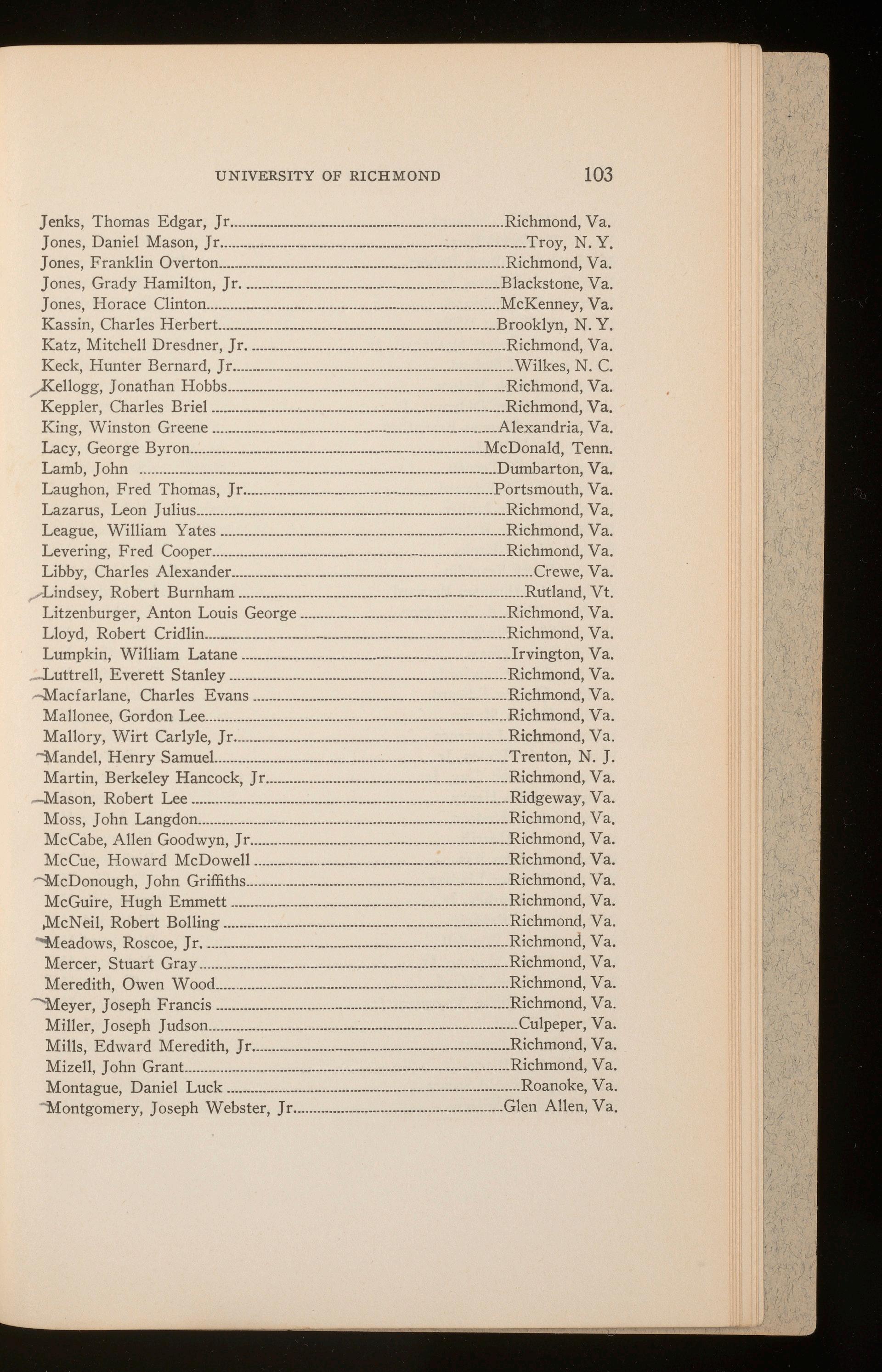
Jenks, Thomas Edgar, Jr .....................................................................Richmond, Va. Jones, Daniel Mason, Jr Troy, N. Y. Jones, Franklin Overton ........................................................................Richmond, Va. Jones, Grady Hamilton, Jr .................................................................Blackstone, Va. Jones, Horace Clinton ..........................................................................McKenney, Va. Kassin, Charles Herbert Brooklyn, N. Y. Katz, Mitchell Dresdner, Jr Richmond, Va. Keck, Hunter Bernard, Jr Wilkes, N. C. _,Kellogg, Jonathan Hobbs Richmond, Va. Keppler, Charles Briel ..........................................................................Richmond, Va. King, Winston Greene .............. Alexandria, Va. Lacy, George Byron McDonald, Tenn. Lamb, John Dumbarton, Va. Laughon, Fred Thomas, Jr ...............................................................Portsmouth, Va. Lazarus, Leon J ulius - Richmond, Va. League, William Yates ........................................................................Richmond, Va. Levering, Fred Cooper ..........................................................................Richmond, Va. Libby, Charles Alexander ............................................................................Crewe, Va. ,.,-Lindsey, Robert Burnham Rutland, Vt. Litzenburger, Anton Louis George ....................................................Richmond, Va. Lloyd, Robert Cridlin ...........................................................................Richmond, Va. Lumpkin, William Latane ....................................................................Irvington, Va. -Luttrell, Everett Stanley ......................................................................Richmond, Va . .-Macfarlane, Charles Evans Richmond, Va. Mallonee, Gordon Lee Richmond, Va. Mallory, Wirt Carlyle, Jr Richmond, Va. --:M:andel,Henry Samuel.. Trenton, N. J. Martin, Berkeley Hancock, Jr .............................................................Richmond, Va. -Mason, Robert Lee Ridgeway, Va. Moss, J olm Langdon Richmond, Va. McCabe, Allen Goodwyn, Jr Richmond, Va. McCue, Howard McDowell ................................................................Richmond, Va. ----McDonough,John Griffiths Richmond, Va. McGuire, Hugh Emmett ......................................................................Richmond, Va. ,McNeil, Robert Bolling Richmond, Va. ~eadows, Roscoe, Jr .............................................................................Richmond, Va. Mercer, Stuart Gray ..............................................................................Richmond, Va. Meredith, Owen W ood ..........................................................................Richmond, Va.
'"'Meyer, Joseph Francis ..........................................................................Richmond, Va. Miller, Joseph Judson ..............................................................................Culpeper, Va. Mills, Edward Meredith, Jr .................................................................Richmond, Va. Mizell, John Grant ..................................................................................Richmond, Va. Montague, Daniel Luck ..........................................................................Roanoke, Va. --.Montgomery, Joseph Webster, Jr .....................................................Glen Allen, Va.
UNIVERSITY OF RICHMOND
-Moore, William Edward ......................................................................Onancock, Va. Mudd, Thaddeus Tyree ........................................................................Richmond, Va. -Mumpower, William Robert ........................................................Big Stone Gap, Va. Naff, David Winton, Jr. ..........................................................................Roanoke, Va. Nauman, Paul Edward Richmond, Va. Newland, Thomas Wills Kwangju, Korea Newsom, Norwood Nathaniel, Jr Lawrenceville, Va. Nuckols, John Roland ............................................................................Chatham, Va. Nunnally, Frank Malone ....................................................................Petersburg, Va Nunnally, Moses Didymus, Jr Richmond, Va. Omohundro, Thomas Bransford ............................................Goochland C. H., Va. Orcutt, David B., Jr Moseley, Va. 'o'Rork, Elmer Ternan ............................................................................Sandston, Va. Orschel, Joseph Edward ........................................................................Richmond, Va. --Pace, Channing Luther Richmond, Va. Pankey, George Robert Richmond, Va. Pannill, Henry Banks ........................................................................Martinsville, Va. Parker, Perry Franklin Grand Valley, Pa. asternack, Abraham Bernard
Conn. Paulette, Richard Carrington ..............................................................Smith:fi.eld,Va. Peck, Wilbur Sturgis Bon Air, Va. Peters, John Lomax Franklin, Va. -Phillips, John Crawford Petersburg, Va. Phillips, Horace Edward ......................................................................Richmond, Va. Pilcher, Edwin Mason ........................................................................Petersburg, Va. Pittore, Joseph Lawrence Tuckahoe, N. Y. Pond, Charles Bailey, Jr Suffolk, Va. Powers, Linwood Clay, Jr ...................................................................Richmond, Va. Preissner, John Henry ..........................................................................Richmond, Va. Price, Hubert Hudson Luray, Va. Raab, Robert Merrill ............................................................................Richmond, Va. "Radspinner, John Asa ............................................................................Richmond, Va. Raiford, Fletcher Lindsay ......................................................................Franklin, Va. Reid, Numa Letcher, Jr. .....................................................................Portsmouth, Va. Riegel, Robert Francis ..........................................................................Richmond, Va. -Rether, Robert Wendell... Richmond, Va. Reynolds, John Monroe, Jr ...................................................................Richmond, Va. Reynolds, Peyton Alfred ..........................................................................St. Just, Va. Robertson, William Thurman, Jr. ..................................................Petersburg, Va. Robinson, Sidney ....................................................................................Richmond, Va. Rogers, Mann Turner ........................•··············-···································Richmond, Va. Roper, Robert Poore ..............................................................................Richmond, Va.
Rubenstein, Donald Stuart ....................................................................Richmond, Va. Russell, John Winfree Midlothian, Va.
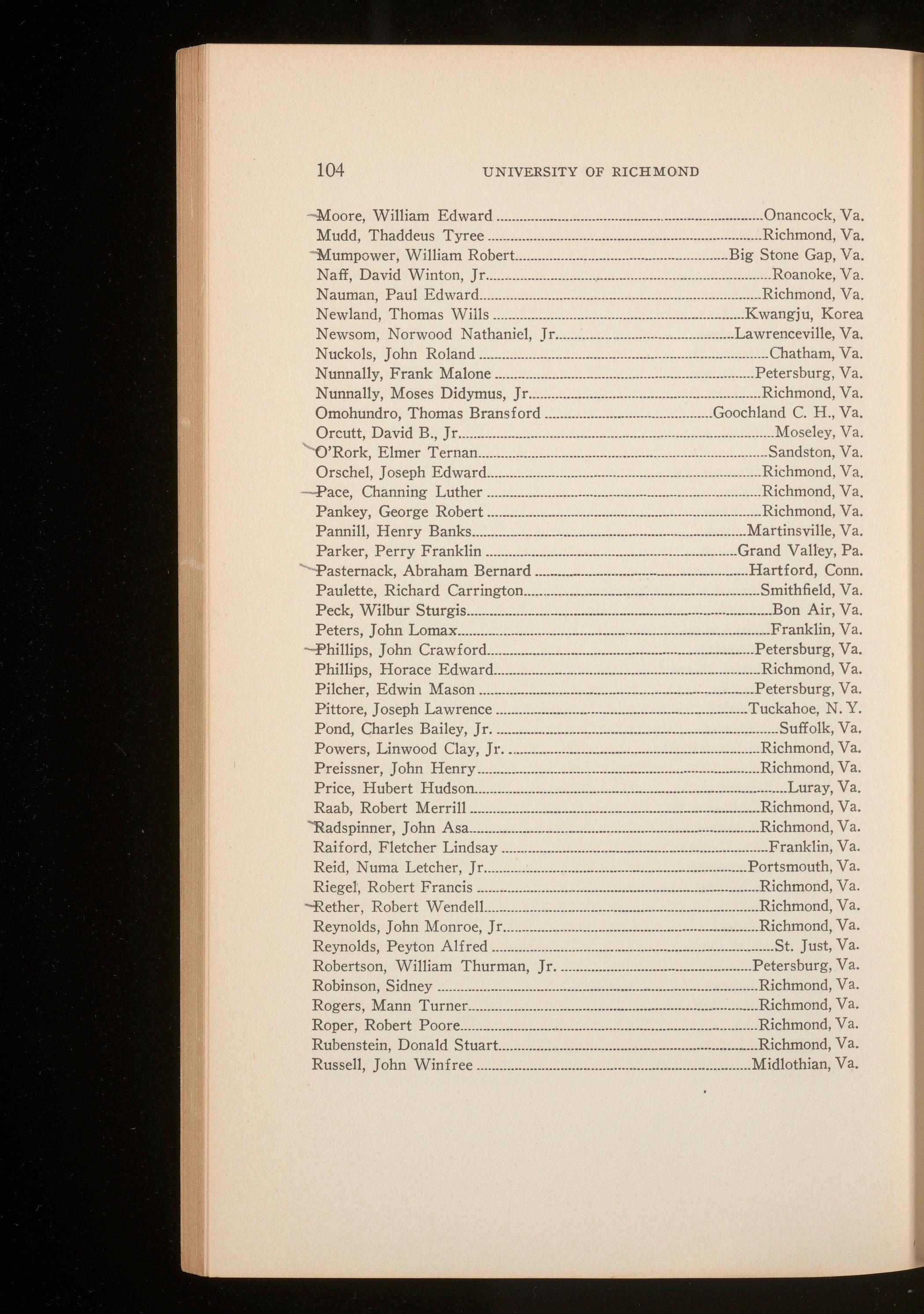
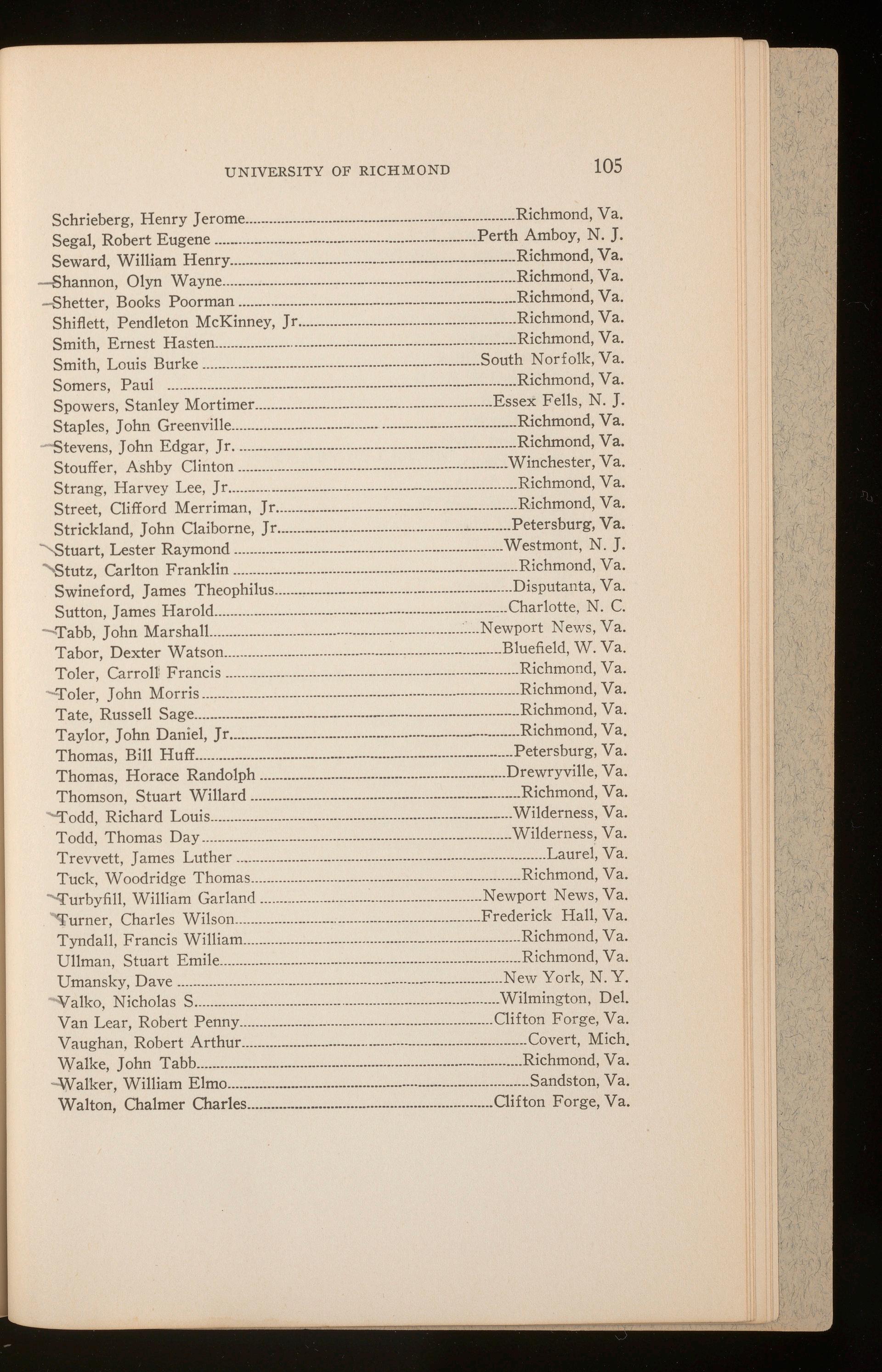
UNIVERSITY OF RICHMOND 105
Schrieberg, Henry J erome ....................................................................Richmond, Va. Segal, Robert Eugene ..................................................................Perth Amboy, N. J. Seward, William Henry ........................................................................Richmond, Va. -Shannon, Olyn Wayne ..........................................................................Richmond, Va. -Shetter, Books Poorman ......................................................................Richmond, Va. Shiflett, Pendleton McKinney, J r .......................................................Richmond, Va. Smith, Ernest Hasten ............................................................................Richmond, Va. Smith, Louis Burke ......................................................................South Norfolk, Va. Somers, Paul ........................................................................................Richmond, Va. Spowers, Stanley Mortimer ............................................................Essex Fells, N. J. Staples, John Greenville .......................................................................Richmond, Va. tevens, John Edgar, Jr .......................................................................Richmond, Va. Stouffer, Ashby Clinton ....................................................................Winchester, Va. Strang, Harvey Lee, Jr .............................................. - .........................Richmond, Va. Street, Clifford Merriman, Jr .............................................................Richmond, Va. Strickland, John Claiborne, Jr ...........................................................Petersburg, Va.
'-Stuart, Lester Raymond ....................................................................Westmont, N. J. ' Stutz, Carlton Franklin ........................................................................Richmond, Va. Swineford, James Theophilus ............................................................Disputanta, Va. Sutton, James Harold ..........................................................................Charlotte, N. C. Tabb, John Marshall... ............................................................::...Newport News, Va. Tabor, Dexter Watson ......................................................................Bluefield, W. Va.
Toler, Carron: Francis .........................................................................Richmond, Va.
- Toler, John Morris ................................................................................Richmond, Va.
Tate, Russell Sage ............................................·-···································Richmond, Va.
Taylor, John Daniel, Jr .........................................................................Richmond, Va.
Thomas, Bill Huff ................................................................................Petersburg, Va.
Thomas, Horace Randolph ..............................................................Drewryville, Va.
Thomson, Stuart Willard ....................................................................Richmond, Va. "i'odd, Richard Louis ............................................................................Wilderness, Va. Todd, Thomas Day ..............................................................................Wilderness, Va. Trevvett, James Luther ..............................................................................Laurel, Va. Tuck, Woodridge Thomas ....................................................................Richmond, Va. """i'urbyfill, William Garland ........................................................Newport News, Va. Turner, Charles Wilson ..............................................................Frederick Hall, Va. Tyndall, Francis William ......................................................................Richmond, Va. Ullman, Stuart Emile ............................................................................Richmond, Va. Umansky, Dave ..................................................................................New York, N. Y. Valko, Nicholas S .............................................................................Wilmington, Del. Van Lear, Robert Penny ...............................................................Clifton Forge, Va. Vaughan, Robert Arthur ........................................................................Covert, Mich. Walke, John Tabb ..................................................................................Richmond, Va. -W-alker, William Elmo ............................................................................Sandston, Va. Walton, Chalmer Charles ..............................................................Clifton Forge, Va.

UNIVERSITY OF RICHMOND
Watkins, Arthur Winston ........................................................................Dundas, Va. Watlington, Paul Berry, Jr ._............................................Hagerstown, Md ,...;1/vebb, Jack Graham
Va. Wells, Robert Clyde ....................................................................Fountain City, Tenn. Weiner, Harry ...................................... Petersburg, Va. West, Michael Walker ..........................................................................Richmond, Va. Wiley, Paul Garland ..............................................................................Richmond, Va. Williams, Carroll Milton ............................... Richmond, Va. Williams, Richard M . F., III... .............................................................Richmond, Va. -¥/ills, Clyde Lewis ................................................................................Richmond, Va. Wing, Roger Hawley .................................................... Richmond, Va. ,,,,VVithers,Linwood Alvin ....... ........................Village, Va. Wood, Charles Henry, Jr .....................................................................Richmond, Va. W ooddy, Lewis Aaron ............................................................................Manquin, Va. Woodson, Fitzhugh Lee, Jr. ....... Richmond, Va. ,-Woodson, George Stuart ..... ..............................Richmond, Va. Woolfolk, Robert, Jr. ................................... ...Bowling Green, Va. Wrenn, Lewis James ......................................................................Clifton Forge, Va.
0o ung, Gordon Wesley ............................... Midlothian, Va. Young, Harry Aloysius ................................................................Atlantic City, N. J. Yowell, Robert William ....................................................................Peola Mills, Va.

STUDENTS
\:rosier, Joseph A .....................................................................................Chatham, Va. Ford, Horace Lee ................••·····························-································•··Richmond, Va. Gulley, Glaucus Fuller, Jr .....................................................................Richmond, Va. Reamy, Ryland Osborne ..........................................................................Warsaw, Va. Schmidt, Carlton Jeffers ......................................................................Richmond, Va. Smithers, John Westwood ....................................................................Richmond, Va.
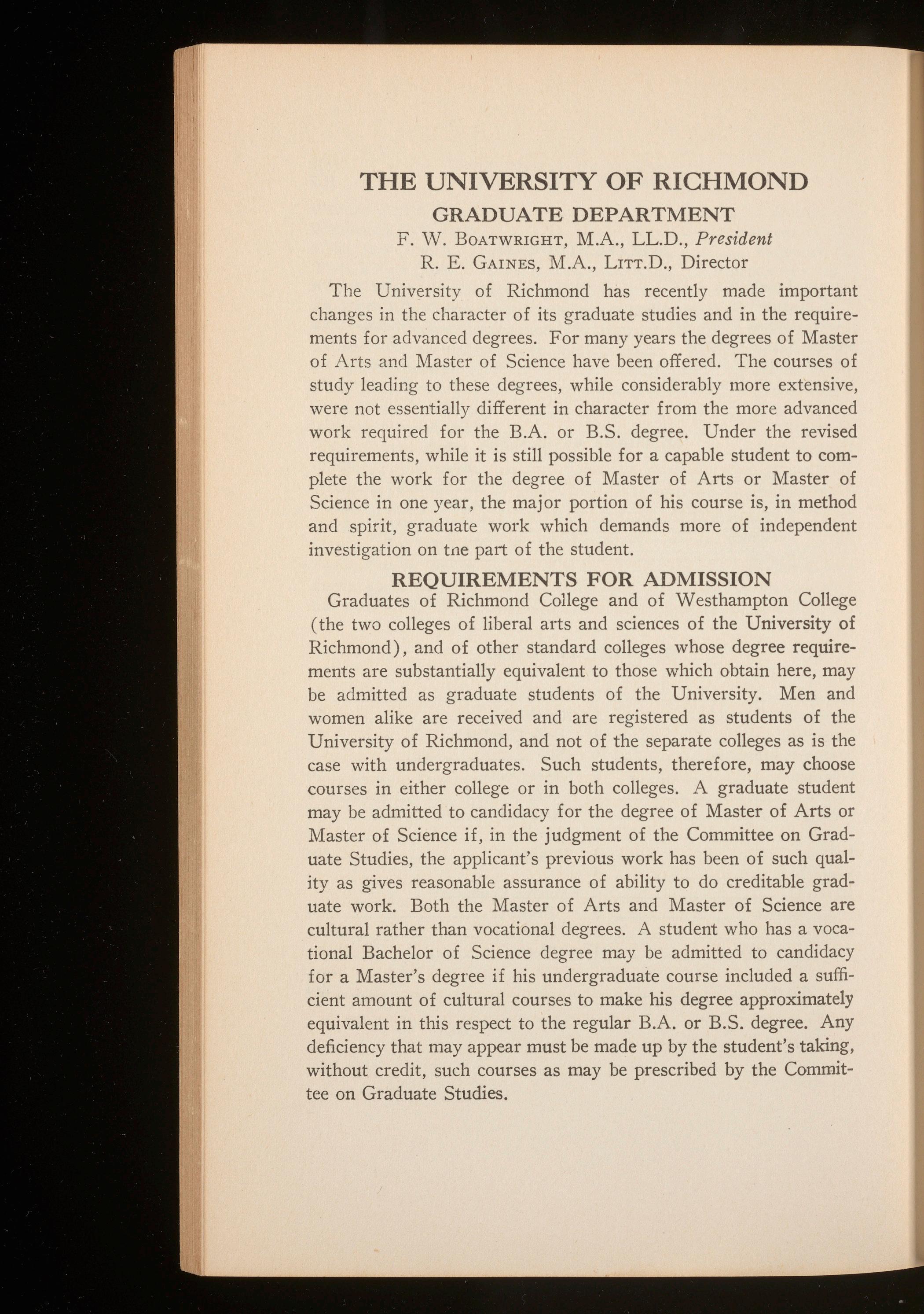
THE UNIVERSITY OF RICHMOND GRADUATE DEPARTMENT
F. W. BOATWRIGHT,M.A., LL.D., President
R. E. GAINES, M.A., LrTT.D., Director
The University of Richmond has recently made important changes in the character of its graduate studies and in the requirements for advanced degrees. For many years the degrees of Master of Arts and Master of Science have been offered. The courses of study leading to these degrees, while considerably more extensive, were not essentially different in character from the more advanced work required for the B.A. or B.S. degree. Under the revised requirements, while it is still possible for a capable student to complete the work for the degree of Master of Arts or Master of Science in one year, the major portion of his course is, in method and spirit, graduate work which demands more of independent investigation on tae part of the student.
REQUIREMENTS FOR ADMISSION
Graduates of Richmond College and of Westhampton College ( the two colleges of liberal arts and sciences of the University of Richmond), and of other standard colleges whose degree requirements are substantially equivalent to those which obtain here, may be admitted as graduate students of the University. Men and women alike are received and are registered as students of the University of Richmond, and not of the separate colleges as is the case with undergraduates. Such students, therefore, may choose courses in either college or in both colleges. A graduate student may be admitted to candidacy for the degree of Master of Arts or Master of Science if, in the judgment of the Committee on Graduate Studies, the applicant's previous work has been of such quality as gives reasonable assurance of ability to do creditable graduate work. Both the Master of Arts and Master of Science are cultural rather than vocational degrees. A student who has a vocational Bachelor of Science degree may be admitted to candidacy for a Master's degree if his undergraduate course included a sufficient amount of cultural courses to make his degree approximately equivalent in this respect to the regular B.A. or B.S. degree. Any deficiency that may appear must be made up by the student's taking, without credit, such courses as may be prescribed by the Committee on Graduate Studies.
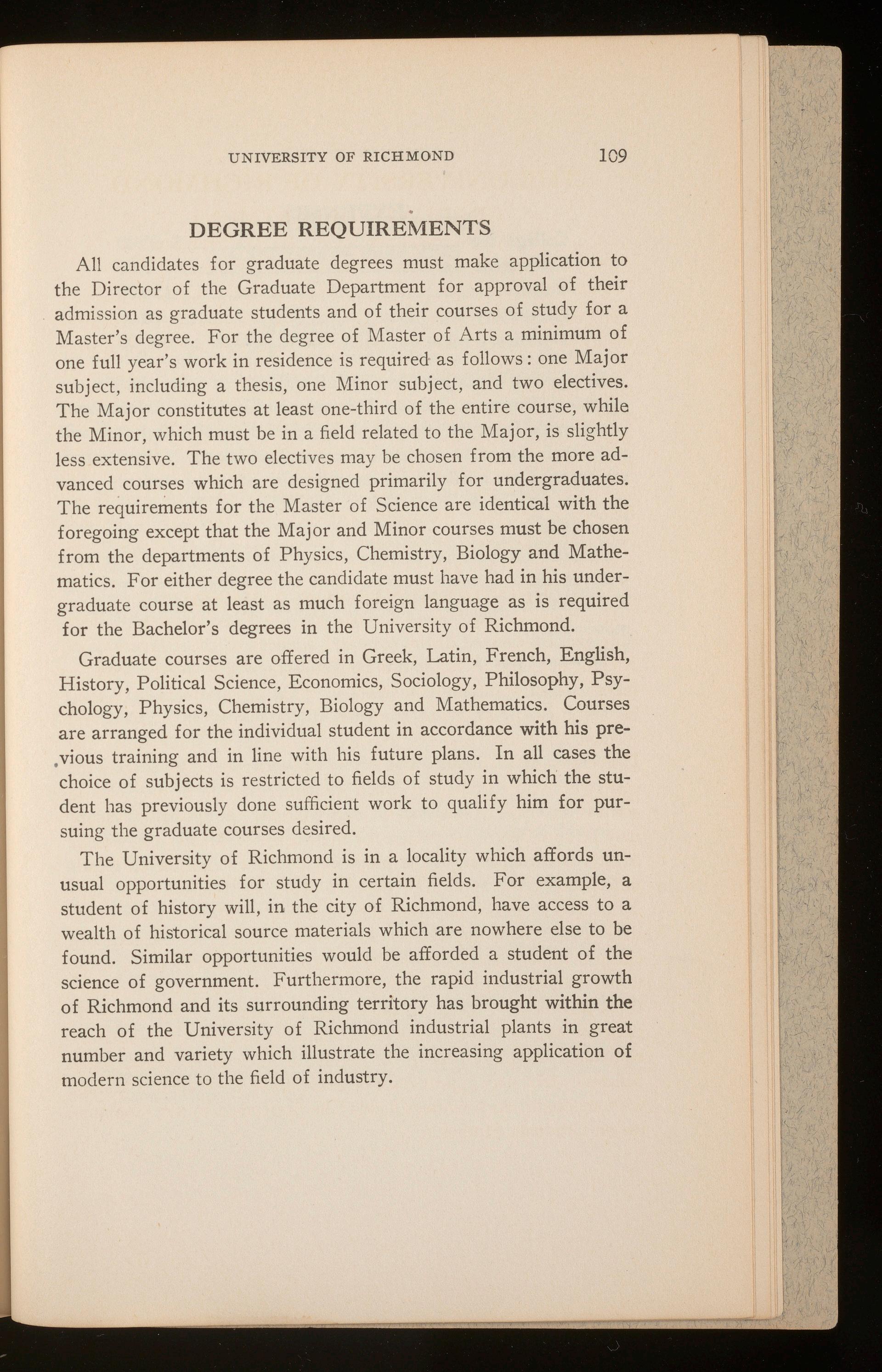
DEGREE REQUIREMENTS
All candidates for graduate degrees must make application to the Director of the Graduate Department for approval of their admission as graduate students and of their courses of study for a Master's degree. For the degree of Master of Arts a minimum of one full year's work in residence is required as follows: one Major subject, including a thesis, one Minor subject, and two electives. The Major constitutes at least one-third of the entire course, while the Minor, which must be in a field related to the Major, is slightly less extensive. The two electives may be chosen from the more advanced courses which are designed primarily for undergraduates. The requirements for the Master of Science are identical with the foregoing except that the Major and Minor courses must be chosen from the departments of Physics, Chemistry, Biology and Mathematics. For either degree the candidate must have had in his undergraduate course at least as much foreign language as is required for the Bachelor's degrees in the University of Richmond.
Graduate courses are offered in Greek, Latin, French, English, History, Political Science, Economics, Sociology, Philosophy, Psychology, Physics, Chemistry, Biology and Mathematics. Courses are arranged for the individual student in accordance with his pre,vious training and in line with his future plans. In all cases the choice of subjects is restricted to fields of study in which the student bas previously done sufficient work to qualify him for pursuing the graduate courses desired.
The University of Richmond is in a locality which affords unusual opportunities for study in certain fields. For example, a student of history will, in the city of Richmond, have access to a wealth of historical source materials which are nowhere else to be found. Similar opportunities would be afforded a student of the science of government. Furthermore, the rapid industrial growth of Richmond and its surrounding territory has brought within the reach of the University of Richmond industrial plants in great number and variety which illustrate the increasing application of modern science to the field of industry.
EXPENSES
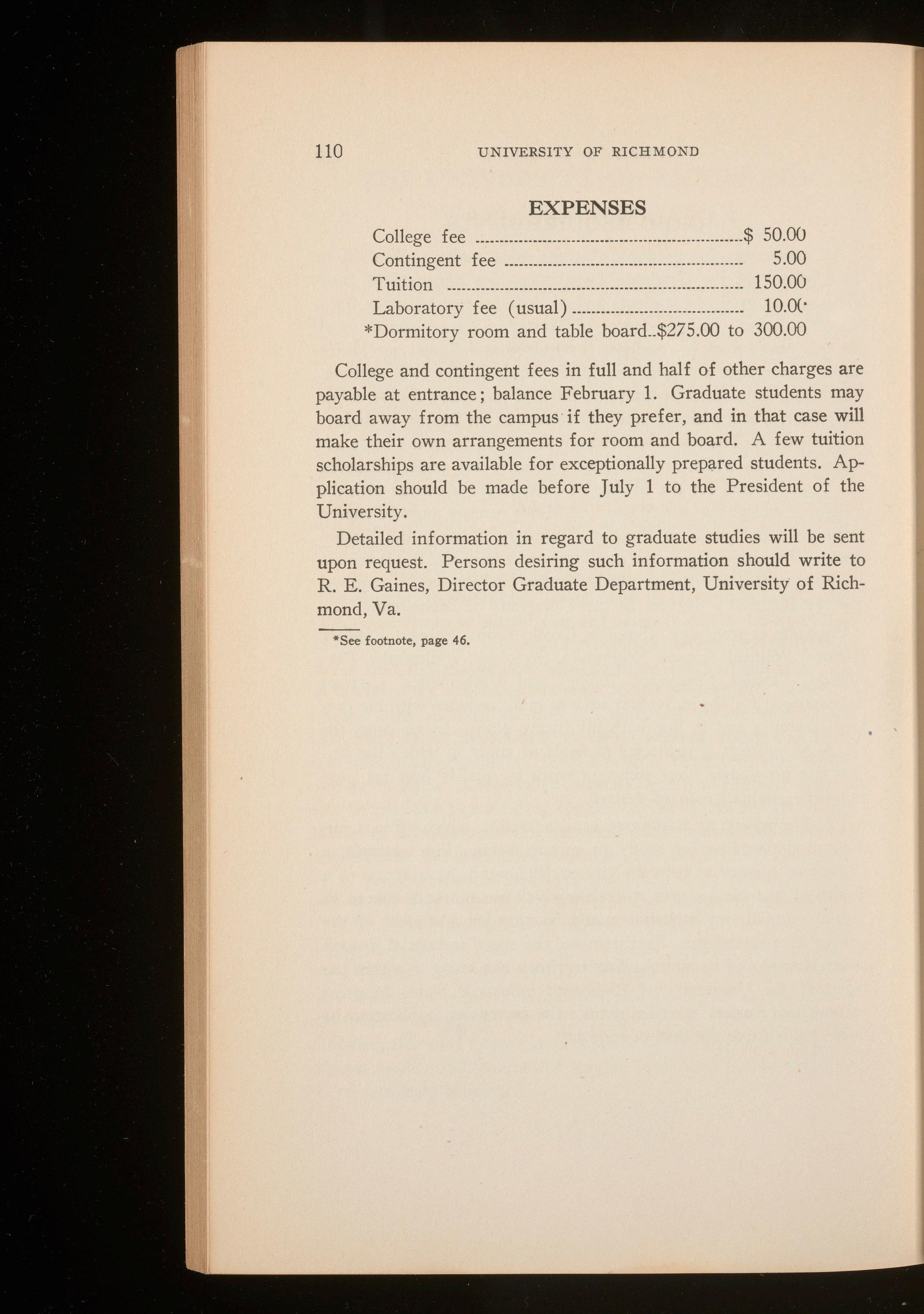
College and contingent fees in full and half of other charges are payable at entrance; balance February 1. Graduate students may board away from the campus if they prefer, and in that case will make their own arrangements for room and board. A few tuition scholarships are available for exceptionally prepared students. Application should be made before July 1 to the President of the University.
Detailed information in regard to graduate studies will be sent upon request. Persons desiring such information should write to R. E. Gaines, Director Graduate Department, University of Richmond, Va.
* See footnote, page 46.

GRADUATE DEGREES
Conferred in June, 1933
MASTERS OF ARTS
Margaret Gertrude Bull, B.A., Agnes Scott College........................Norfolk, Va.
Thesis: "Shakespeare's Use of History in the English Group of Plays."
Bessie Mae Burns, B.A., University of Richmond ........................Richmond, Va.
Thesis: "Ralph Waldo Emerson and His Philosophy of Expression."
Lewis Estes Chittum, B.S. in Business, University of Richmond, Richmond, Va.
Thesis : "A Financial History of State Education in Virginia."
Ruth Dunn Coen, B.A., University of Richmond ..........................Richmond, Va.
Thesis: "A Preliminary Study of Frutovisi's Emporia with Special Reference to Terentian Influence."
Elizabeth Nelsen Gill, B.A., University of Richmond ................Richmond, Va.
Thesis : "The Changing Story of 'Troilus and Cressida' ."
Jacob Paul Glick, B.S. in Business, University of Richmond ....Richmond, Va.
Thesis : "Motor Vehicle Taxation in Virginia."
Luther Anderson Irby, Jr., B.A., University of Richmond Richmond, Va.
Thesis: "The Juvenile Court: Some Factors of its Origin, Structure, Function and Growth."
Louis Krapin, B.S. in Business, University of Richmond ............Richmond, Va. Thesis: "America-Yesterday and Today."
Carroll Ryland Minor, B.A., University of Richmond ................Newtown, Va. Thesis: "The Institutional Life of the Negroes in the City of Richmond."
Marion Phyllis Perkinson, B.A., University of Richmond ........Richmond, Va
Thesis: "A Preliminary Study of Frulovisi's Oratoria with Special Reference to Terentian Influence."
Katherine Mae Roberts, B.A., University of Richmond ............Richmond, Va. Thesis: "'Rervm Bohemicarvm avct. Vary. et Boiorvm' as an Illustration of the Annal."
Mary McClintock Ryland, B.A., University of Richmond ..........Richmond, Va. Thesis : "The Diatoms of Westhampton Lake."
Anne Louise Sanford, B.A., University of Richmond ................Richmond, Va. Thesis: "Greek and Roman Child Life (as depicted in some Greek and Latin authors)."

GRADUATE STUDENTS, 1933-34
Bennett, Georgia Belle ..........................................................................Richmond, Va.
B.A., College of William and Mary, 1933.
Clark, Edward Thomas ......................................................................Winchester, Va.
B.A., University of Richmond; Th.M., Southern Baptist Theological Seminary.
Clayton, John Stuart Richmond, Va.
B.S., Virginia Polytechnic Institute, 1932.
Cutright, Frank, Jr ..... ..........................................................................Athens, W. Va.
A.B., Concord State Teachers College, 1933.
Goldschmidt, Myer ..............................................................................Hartford, Conn. B.S., Trinity College, 1932.
Howell, Arden, Jr .........................................................................................Vinita, Va.
B.A., University of Richmond, 1933.
Jordan, Thomas Earl ................................................................................Tyner, N. C. B. S., Atlantic University, 1931.
Lazarus, Sam ..........................................................................................Richmond, Va.
B. S., Universsty of Richmond, 1933.
Miller, David M ...........................................................University of Richmond, Va.
B. S. in Business Administration, University of Richmond, 1926; LL.B., Washongton and Lee University, 1932.
Oliver, William Lewis ..........................................................................Richmond, Va. A.B., Randolph•Macon College.
Porter , Martha Fleming ......................................................................Richmond, Va.
B.A., University of Richmond, 1933.
Reynolds, Morgan ................................................................................Richmond, Va.
B.A., University of Richmond, 1933.
Slaughter, Margaret Dana ..................................................................Richmond, Va.
B.A., University of Richmond, 1933.
Smith, Marshall Washington ••·-·······•··•··················Richmond, Va.
B.S., University of Richmond, 1933.
Snellings, Robert Henning, Jr .............................................................Richmond, Va.
B.S., University of Richmond, 1933.
Tiedemann, Edward George ..............................................................Brooklyn, N. Y.
B.A., College of the City of New York; University of Maine,
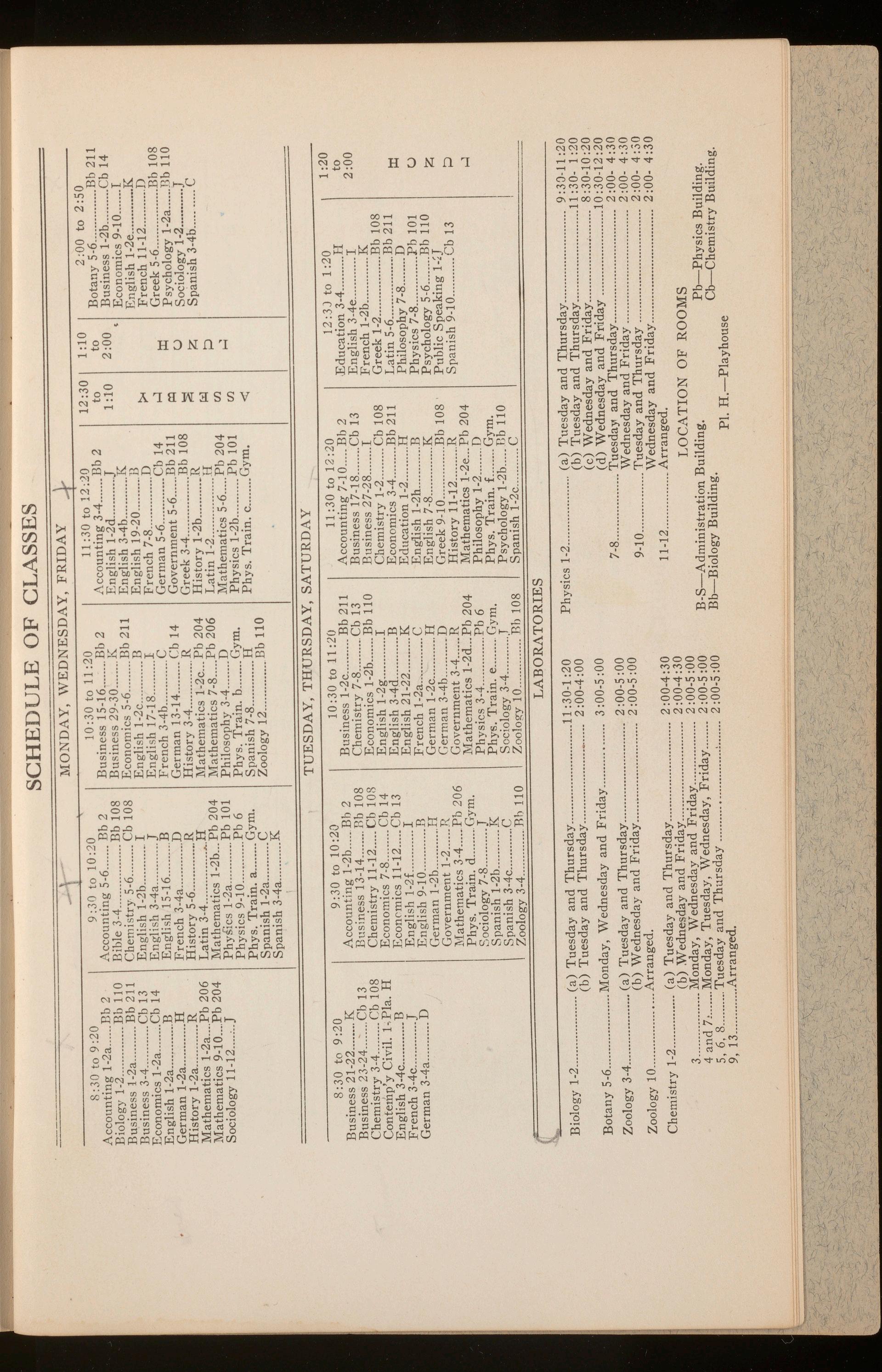
109, Biol. Bldg.

\V. F. Caylor, M.W.F. ........ Spa n. 1-2a Span. 7-8 Office si)a·n'. ·9·-·10 Span. 3-4b 11, Chem. Blng. T. T. S. . . . . . .. . Span. 1-2b Office Span. 1-2c
\\' R. Cornth\vai te, M.\Y.F. Cbem . 5-6 Office Office Lab. 3-4-7 206, Chem . Bldg, T. T. S. Chem. 3-4 ........ Chem. 7-8 Office Office Lab. 4-5-6-8 J. J. Corson, M.W.F. Econ. 1-2a
12, Chem. Bldg. T. T. S. Oflice Econ. 7-8 Econ. 1-2b
S. B. Cousins, M.W.F. w.c. Bible 3-4 Office (W. F.) .
207, Phys. Bldg. T. T. S. ...
R E. Gaines, M.W.F. Math. 1-10 l\Iath. 1-2b l\Iath. 7-8 Office .
205, Phys. Bldg. T. T. S. ........ l\fath. 3-4 Officie .
\\'. J. Gaines, M.W.F. Fr. 3-4a
8. Ch>em. B ldg. T. T. S. Fr. 8-4c
N. C. Giddings, :\1. W. F.
11, Chem. Bldg. T. T. S.
C T. Goode, l\I.W.F.
Adm. Bldg.
\V. B. Haclcley,
\Y. A. Harris,
109, Biol. Bldg.
B. C. Holtzclaw,

E. Loving,
112, Phys. Bldg.
McDanel,
8, Chem. Bldg.
H. S. Mieade*
3, Biol. Bldg.
D. J. Mays,
C. 0. Meredith,
212, Biol. Bldg.
S. C. Mitchell •
Q, Adm. Bldg.
R. B. Pinchbeck,
Dean's
,V. L. Prince,
L (Sum. Sch.
J. H. Russell.
3, Biol. Bldg.
G. Ryland.
Smart,
W. Stevenson,
S2, Adm. Bldg.
H. P. Thomas. J\'.I.W.F.
12, Chrem. Bldg.
C.H. Wheeler. M.,v.F. Math. 9 -2
205, Phys. Bldg. T. T. S.
For other laboratory sections, see schedule of classes. *Other hours by appointment.
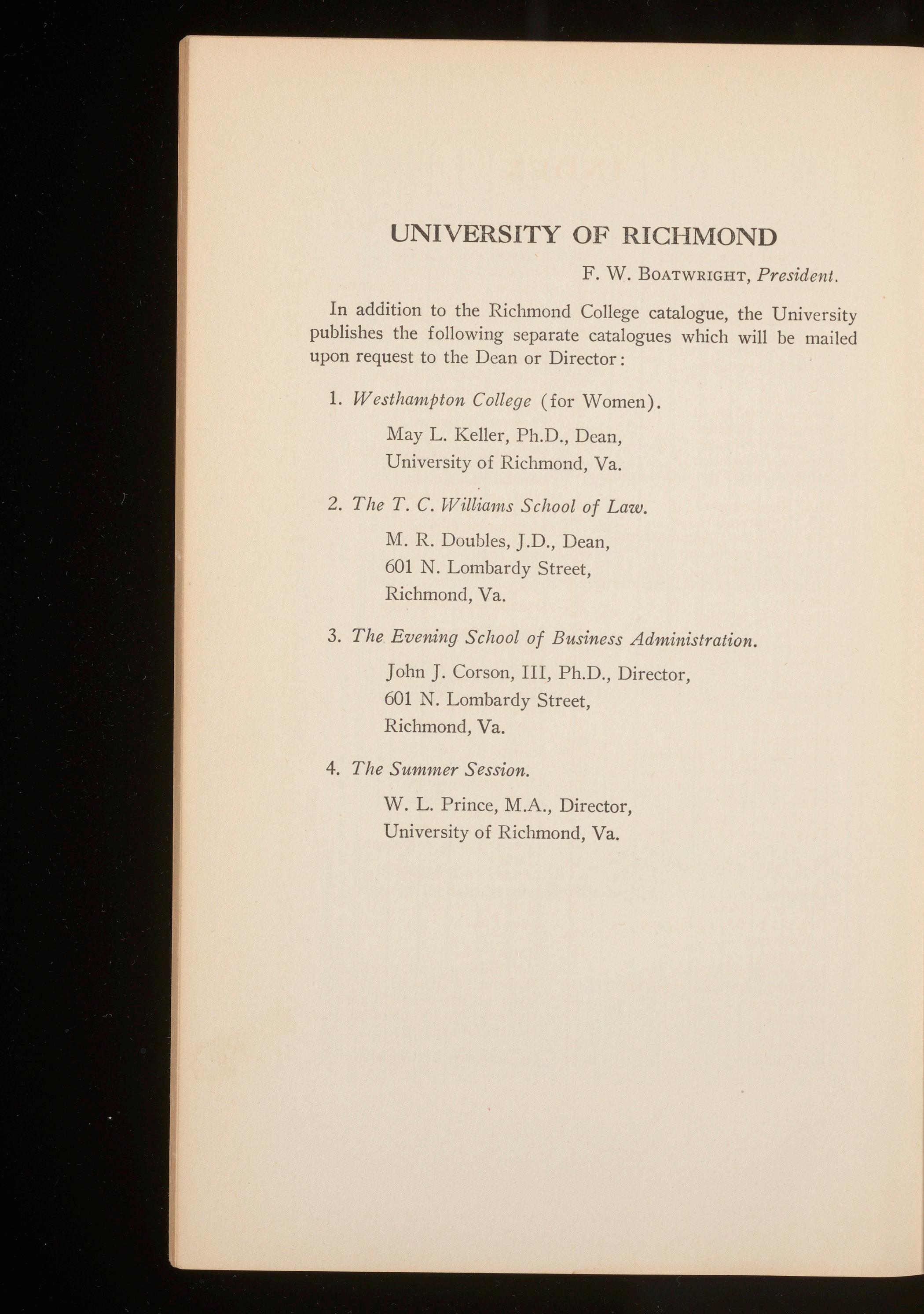
UNIVERSITY OF RICHMOND
F. W. BOATWRIGHT, President.
In addition to the Richmond College catalogue, the University publishes the following separate catalogues which will be mailed upon request to the Dean or Director:
l. Westhampton Callege ( for Women).
May L. Keller, Ph.D., Dean, University of Richmond, Va.
2. The T. C. Williams School of Law.
M. R. Doubles, J.D., Dean, 601 N. Lombardy Street, Richmond, Va.
3. The Evening School of Business Administration.
John J. Corson, III, Ph.D., Director, 601 N. Lombardy Street, Richmond, Va.
4. The Summer Session.
W. L. Prince, M.A., Director, University of Richmond, Va.
